Elisabeth Haub School of Law at Pace University
HAUB LAW OPENS
REGION’S FIRST LEGAL HAND CALL-IN CENTER
Student-led Legal Helpline Closes Gaps in Community Access to Justice

ALUMNI MAGAZINE • SUMMER 2023
DEAN OF HAUB LAW
Horace E. Anderson, Jr.
ASSISTANT DEAN FOR EXTERNAL AFFAIRS
Rachael M. Silva
EXECUTIVE DIRECTOR OF COMMUNICATIONS
Jessica Dubuss ’09
MANAGING EDITOR & WRITER
Jessica Dubuss ’09
CONTRIBUTING WRITERS
Rex Bossert
Kayla Towey
DESIGN
Sarah Brooke Design
PHOTOGRAPHY
Jörg Meyer Photography
Dmitriy Kalinin Studio
Don Hamerman
Photography
Liflander Photography
Stockton Photo
The Haub Law Alumni Magazineis published annually under the auspices of the Dean, and is distributed free of charge to alumni and friends of Haub Law.
PLEASE ADDRESS CORRESPONDENCE TO:
Haub Law Alumni Communications
78 North Broadway, White Plains, NY 10603 plsalumni@law.pace.edu

The views expressed in this publication do not necessarily represent those of the magazine staff or of individuals enrolled at or employed by Pace University or of Pace University itself.
Pace University admits, and will continue to admit, students of any sex, gender or gender identity, race, color, religion, creed, age, disability, marital status, sexual orientation, veteran status, national and ethnic origin to all rights, privileges, programs, and activities generally accorded or made available to students at the School. It does not, and will not, discriminate on the basis of sex, gender or gender identity, race, color, religion, creed, age, disability, marital status, sexual orientation, veteran status, national and ethnic origin in the administration of its educational policies, admissions policies, scholarships and loan programs, and athletic and other schooladministered programs.
© Copyright 2023 by Elisabeth Haub School of Law at Pace University

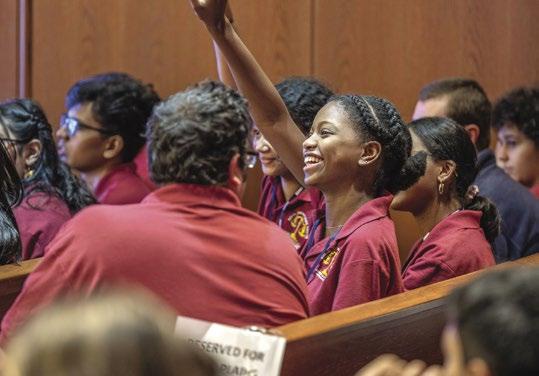
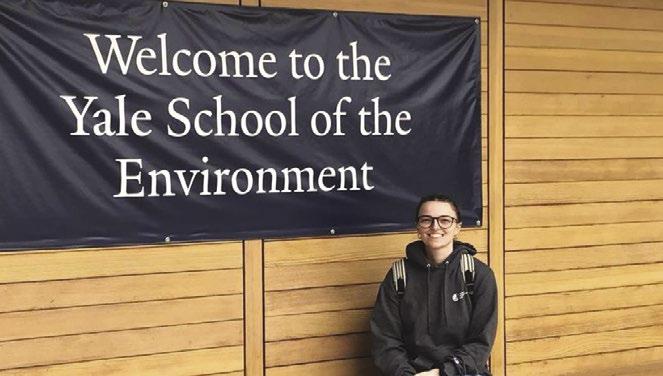
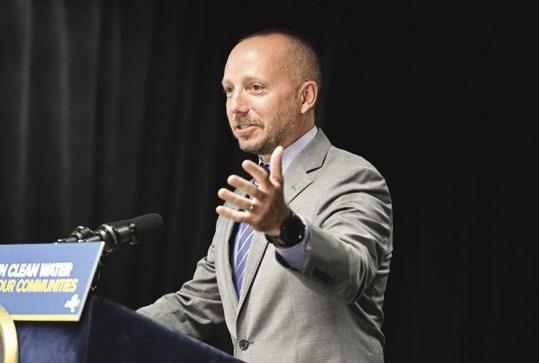
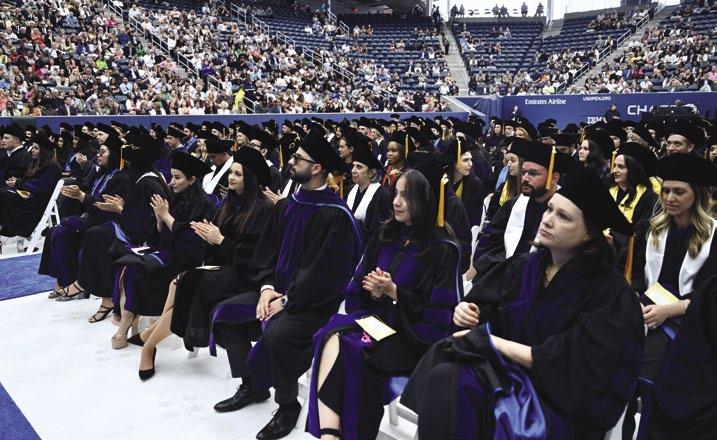


SUMMER 2023 3 6 RECOGNIZING THE IMPORTANCE OF WELLNESS 12 SUPPORTING THE PIPELINE TO PRACTICE 20 RECORD NUMBER OF STUDENTS ENROLL IN JD/MEM DUAL DEGREE PROGRAM 26 HAUB LAW OPENS REGION’S FIRST LEGAL HAND CALL-IN CENTER 44 CELEBRATING 25 YEARS IN DC FROM THE DEAN 4 HAUB HEADLINES 6 New and noteworthy highlights from the past year OF NOTE 16 Impressive student and recent grad accomplishments, featuring: Eric Brown ’25 16 Christen Maccone ’23 17 Daniel Reyes ’24 18 Kasama Star ’23 19 Hayley Margulis ’24 23 Michael Giacomo ’23 24 IN AND AROUND 30 Commencement day, distinguished lectures, and key events FACULTY 40 News and publications from faculty, featuring: Professor Smita Narula 40 Professor John Bandler 42 Professor John Nolon 43 Professor James Toomey 46 Professor Louis Fasulo 48 ALUMNI 54 Alumni class notes and profiles, featuring: The “Back Seat Boyz” 54 Daniel Castelo Branco Ramos ’21 (SJD) 56 The Adam Giardina Memorial Scholarship 57 Najia Sheikh Khalid ’09 58 Basil Seggos ’01 60 Shari Hochberg ’ 12 62 IN MEMORIAM 71 12 20 60 36 26 6 44
FROM THE DEAN
In Center for Westchester County, which provides free legal information, assistance, and referrals to community members via phone, text message, email, and chat. The Legal Hand Call-In Center is part of the Law School’s broader Access to Justice Project, which incorporates curricular, experiential, research, and policy advocacy components, all designed to increase student, faculty and staff engagement in pro bono and community work, and to support the local community in addressing justice gaps.
I am also proud to report that our Environmental Law program has once again been ranked #1 in the nation for the third consecutive year, and the fourth time in five years, by U.S. News & World Report. This ranking recognizes the Law School’s enduring commitment to excellence and innovation. Additionally, I am happy to share that Haub Law’s Trial Advocacy Program moved up again to #24 in the nation, retaining its place among the top 15% of law schools. This continued ranking reflects the dedication of our faculty and alumni coaches, and the stellar performance of our students in competition.
Our faculty continues to shine as teachers and thought leaders, publishing innovative scholarly work while mentoring our students in theory and in practice to give them a well-balanced legal education. We have also recently hired four new faculty members and look forward to welcoming them this fall. And, notably, we continue to attract top-notch students who see the practical education that Haub Law provides and the value that a Haub Law degree holds.
Dear Haub Law Alumni,
We wrapped up the 2022-2023 academic year with a memorable commencement ceremony once again held at the USTA Billie Jean King National Tennis Center in Queens, which included an inspiring address from Senator Elizabeth Warren. Both Senator Warren and Harvard Law Professor and Legal Historian Bruce H. Mann received honorary degrees from the Elisabeth Haub School of Law at Pace University at the ceremony.
As you will see in the pages of the magazine, the Haub Law community had a busy and productive 2022-2023. We once again celebrated our legal professionals and their contributions to the Haub Law community and beyond at our annual Law Leadership Awards Dinner. We doubled down on our longstanding commitment to wellness at Haub Law, holding numerous events to continue to foster a healthy environment on campus. This year, three distinguished legal professionals joined our Board of Visitors. We held our second annual Second Annual Pace Access to Justice (A2J) Workshop, and we also presented our annual Inaugural Equity & Justice Forum. These are only some of the many examples of the positive developments in 2022 and 2023.
Additionally, this year, Haub Law launched the new Legal Hand Call-
As you read this year’s alumni magazine, please take note of the diversity and success of our alumni community. You will read about the close bond a group of 1990 graduates formed during their time at Haub Law and continue to maintain. You will learn about 2001 alumnus Basil Seggos, who is the longest serving New York State DEC Commissioner to date. And, significantly, about the Giardina family, who established a scholarship for Haub Law students in their late son’s name.
I continue to thank every one of you, our alumni, for your support and commitment to the Law School, your law school. Your contributions –whether it is providing internship opportunities and post-graduate employment for our students, giving us wise advice when consulted, generously donating to the Law School, or something else – directly impact our success and I remain grateful for all you do to help us build on that success every day.
Sincerely,
 HORACE E. ANDERSON, JR. Dean, Elisabeth Haub School of Law at Pace University
HORACE E. ANDERSON, JR. Dean, Elisabeth Haub School of Law at Pace University

4 HAUB LAW ALUMNI MAGAZINE
FLEXIBLE SCHEDULING
• Full-Time
• Part-Time
• Flex JD
• Accelerated January Program
IDEAL LOCATION
In the heart of Westchester County’s legal market
30 Minutes to Midtown Manhattan
20 Minutes to the Hudson Valley BETTER VALUE Debt-to-Income Ratio
1.49 (competitor average of 1.71)
#1
#24 IN TRIAL ADVOCACY
U.S. News & World Report 2023-2024
3
3 25
PRACTICE READINESS DEGREES (JD, LLM, SJD) ADVANCED CERTIFICATES CLINICS & EXTERNSHIPS
TOTAL CLASS STATS As of Fall 2022
647 Full-Time Students Average Age: 25
176 Part-Time Students Average Age: 29
CAREER SUCCESS Class of 2022
92.61% 86.21% Overall Employment ‘Gold Standard’ Jobs
IN ENVIRONMENTAL LAW
#6 IN THE NATION
Fordham University School of Law Trial Competition Rankings 2022-2023
61% Women (self-identified) Students of Diversity 28%
Where Haub Law Graduates Work
n Law Firms (48.94%)
n Business/Industry (8.51%)
n Government (21.28%)
n Public Interest (6.38%)
n Clerkships (14.89%)
UNIVERSITY STATS
#1 ENVIRONMENTAL POLICY CENTER OF EXCELLENCE
Journal of Environmental Policy and Law
2023 BEST LAW SCHOOLS
The Princeton Review
#4 IN GREATEST RESOURCES FOR WOMEN
The Princeton Review
#11 IN FEMALE ENROLLMENT
2022 Women in Law School Report, Enjuris
PRELAW MAGAZINE RANKINGS
• Best Law Schools For Public Service
• Leader in Technology
• Top Schools Honor Roll for Environmental Law
• Top Schools for Criminal Law
• A in Criminal Law
• A+ in Environmental Law
• A- in Family Law
Top 9% US Colleges that provide the BEST RETURN ON TUITION INVESTMENT PayScale.com
TOP 11% US Colleges with the top HIGHEST EARNING ALUMNI PayScale.com
‘Best of the Best’ FOR LGBTQ+ STUDENTS Campus Pride 2022
National rankings reported from 2022-2024
SUMMER 2023 5
BY THE NUMBERS
RECOGNIZING THE IMPORTANCE OF WELLNESS
NEW PROGRAMS, TECHNOLOGY, AND FACILITIES PROMOTE OPTIMAL WELLBEING FOR HAUB LAW STUDENTS

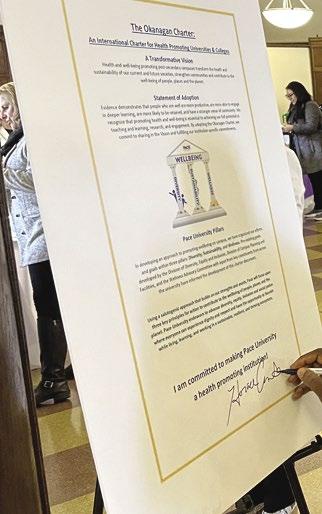
The Elisabeth Haub School of Law at Pace University has always had a strong commitment to fostering a healthy environment on campus – socially, emotionally, physically, and academically – for students, faculty, staff, and the entire Law School community. With its recent wellness initiatives, Haub Law is helping its law school community thrive both personally and professionally.
“The importance of the wellness of our Haub Law students and those in the legal profession cannot be overstated,” said Angie M. D’Agostino ’99, Dean for Student and Campus Affairs. “We have launched numerous health and wellness initiatives at Haub Law to ensure our students are getting the help they need to succeed and flourish as lawyers and as people.”
During the 2021-2022 academic year, the Office of Student and Campus Affairs, in collaboration with the Development Office, piloted a new initiative – Haub Law’s Hub of Belonging: The 8 Pillars of Wellness. Through a semester-long series of programming and campus initiatives focused on incorporating the eight pillars of wellness, law students were offered a path towards optimal wellbeing during their time in law school and thereafter. Pace University’s Chief Wellness Officer awarded a grant to Haub Law’s Office of Student and Campus Affairs to support the success of this important initiative. The series of programming and campus initiatives focused on the following areas of wellness: mental and emotional, social, intellectual, financial, spiritual, physical, occupational, and environmental.
“Each of these pillars of wellness were addressed throughout the Fall 2021 and Spring 2022 semesters, with the underlying overall commitment to help students find fulfillment across all facets of wellbeing and inclusion,” said Natalie Panzera ’19, Director of Student and Campus Affairs, Adjunct Professor, and Haub Law’s representative to the University’s Wellness Advisory Committee. “The programming also incorporated elements of diversity, equity, and inclusion.” For example, the Law School hosted an event relating to diversity, equity, and inclusion in the legal profession, featuring panelists who shared their inspiring stories with the Law School community and discussed tools to use in the profession.
Mental Health & Wellness
Key among the wellness initiatives was Haub Law’s hiring of a part-time mental health counselor, Jennifer Magdits, LMHC/LPC, who started this year and will be based solely on the Haub Law campus. The Law School also hired Karen Michel as a full-time student accessibility services staff member to serve the law campus community. “Hiring
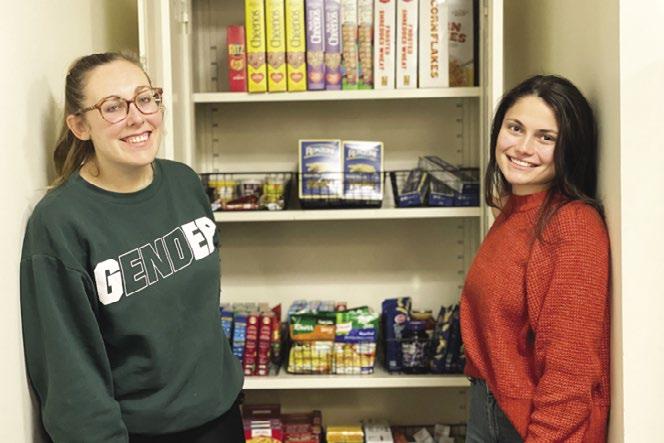
6 HAUB LAW ALUMNI MAGAZINE
Jennifer and Karen for their respective roles allows the Law School to provide additional professional and accessible resources and liaisons readily available for our students,” said Director Natalie Panzera.
As the Assistant Director of Student Accessibility Services (SAS) at Haub Law, Karen Michel truly believes that
education is the passport to one’s future and as such, she enjoys having the ability to work with students. “The goal of the SAS office is to play a role in doing away with preexisting barriers and ensure that everyone has equal access to an education and the opportunity to pursue their dreams, regardless of their disability status. We are dedicated to supporting our students from all different backgrounds to be successful, all while adding their perspectives to the classroom and to the greater legal community. In short, we believe that accessibility benefits the entire community. I feel very fortunate to have the opportunity to both help students overcome certain hurdles and to get them closer to their career aspirations.”
In addition to the new resources available on the Law School campus, students feeling anxious or overwhelmed by finals or personal issues can also contact the University Counseling Center on Pace University’s Pleasantville campus – a 10-minute drive from the Law School campus in White Plains – for confidential counseling services. Further, group workshops are held throughout the year on matters such as handling stress, test anxiety management, and time management. In addition to the mental wellness resources available at the University Counseling Center, assistance with alcohol, drug and other addictions is also provided there. The New York State Bar Association’s Lawyer Assistance Program also offers free confidential services for law students with addiction and mental health issues. And, as always, in their student services roles, Dean Angie D’Agostino and Director Natalie Panzera are also available for confidential assistance.
“Mental health support is a necessity,” said Haub Law’s part-time mental health counselor, Jenn Magdits. “We know that law school does not exist in a vacuum and the stressors of life do not go away once students enter the classroom. While students here have always had access to Pace’s counseling services in Pleasantville, my role is to be solely on the Law School campus. This has been extremely beneficial in getting law school students the face to face mental health support they need, in a convenient setting.”
Today, the legal profession is much more aware and proactive about the need for law student and attorney wellness. The New York State Bar Association and the Westchester County Bar Association have committees that focus on the future of the legal profession, with an emphasis on the impact of COVID-19 on the profession and overall attorney wellness.
Wellness Week
Each year in the spring, Haub Law hosts a Wellness Week to raise awareness of health and wellness issues and the resources available to address them. Past Wellness Weeks have included speakers focused on a healthy work-life balance as a lawyer, as well as health resources information, food giveaways, discounted healthy meals, movie screenings, paint nights, tie dying and other leisure activities, and much more.
In March of 2022, a student-alumni networking evening was held to allow students the opportunity to network with recent alumni and learn more about the various potential career avenues after graduating from law school. This event was part of Haub Law’s Hub of Belonging, fulfilling the occupational wellness pillar. The event was well-attended by both alumni and students.
Additionally, the Law School has hosted an “Out of the Darkness” Walk on campus. This walk is a suicide prevention walk organized by the Student Bar Association. It features inspirational speakers, group activities, time to reflect, and a brief walk around campus to honor those with ongoing mental health struggles and those who have died of suicide.
In February of 2023, the Office of Student and Campus Affairs hosted a Wellbeing Fair on campus to engage the entire campus community and provide an array of wellbeing information and activities. The Fair was centered around the University’s adoption of the Okanagan Charter, an international framework for promoting health at universities and colleges. Created in 2015, the Charter has two calls to action. One is to embed health into all aspects of campus culture, across the administration, operations, and academic mandates. The other is to “lead health promotion action and collaboration locally and globally.”
“Wellbeing is so important, in particular for law students and lawyers,” said Horace E. Anderson, Jr., Dean of the Elisabeth Haub School of Law. “At Haub Law, we are committed to supporting our students’ mental, physical, and overall wellbeing, and helping them learn how to balance the demands of school, life and careers early on. The Wellbeing Fair was a great experience for our community and a chance to recharge.”
Among those organizations present at the Wellbeing Fair were members of the Westchester Women’s Bar Association and the Westchester County Bar Association to talk about their mentoring and mental health, Planet Fitness to discuss health and gym memberships, and the New York City Lawyer Assistance Program to highlight mental health resources and services. Also in attendance at the Fair were representatives from the Financial Aid Office to discuss “financial wellness” resources, Jennifer Magdits from the Counseling Center to talk about mental health, and representatives from the Pace Women’s Justice Center to highlight programs relating to their work. Representatives from White Plains Hospital, Northwell Health
Continued on next page.
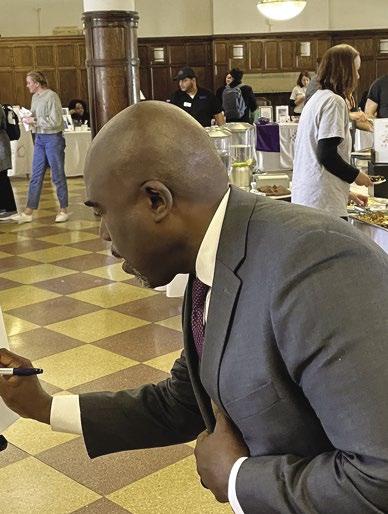
SUMMER 2023 7 HAUB HEADLINES
HAUB HEADLINES
and the Pace Health Center were also on hand. Additional campus resources included tables from the Center of Career and Professional Development, the Office of Academic Success, the Office of External Affairs, the Student Bar Association, the Office of Admissions, the Law Library, and the Student Accessibility Services office.

“The Wellbeing Fair was a huge success because of the tremendous support provided by the University and the hard work of our participating staff and community partners,” said Director Natalie Panzera, who organized the event. “Our goal was to include the entire campus community, to provide a platform to learn about and showcase the numerous resources available to support wellbeing.”
Pace Safe App
Near the beginning of the COVID-19 pandemic, Pace University launched PaceSafe, the official safety app of Pace University, to promote campus health and safety. PaceSafe provides all community members with University wide emergency contacts, safety training, emergency procedures, safety notifications, a friend walk capability, safety toolbox, support services, ability to report an incident from your phone, maps of all Pace University Campus locations, and a toolbox for getting around New York that includes campus shuttle bus information.
“The PaceSafe app is another unique tool that provides our campus community with another layer of safety on the multiple Pace campuses,” said Director Natalie Panzera. “Safety alerts and instant access to numerous resources are at your fingertips once you download the app. One distinct feature is the ‘Friend Walk’ where you can send your location to a friend, who can watch you walk home safely in real time, and enable a call to emergency services, if ever necessary.”
Environmental Wellness
As part of the broad array of wellness initiatives, Haub Law has added six solar charging benches along with two solar charging poles on campus to improve access to outdoor workspaces. The solar charging benches, centrally located on the Preston Quad, ensure maximum energy
absorption and result in efficient energy storage and distribution in an environmentally safe manner. The solar charging poles have many of the same features as the benches but are also equipped with four RapidCharge USB ports, including one underneath the table for handicap access. The solar charging benches and poles are meant to further the environmental wellness pillar, as well as support the Law School’s continued efforts to reduce the campus energy footprint.
“The goal of this solar project has been to enhance the wellbeing of our law students by making outdoor workspaces more accessible,” said Dean Angie D’Agostino.
Food, Fitness, and Wellness
Pace University also established a Food Insecurity Task Force to focus on issues of food insecurities. On behalf of the Law School, Director Natalie Panzera serves on this Task Force. At Haub Law, a Food Pantry program was launched on campus and is available to students, staff, and faculty who need food assistance. The pantry has remained well-stocked in the time that it has existed.
“The Food Pantry was implemented in response to the Law School’s increased awareness of community members who struggle with food insecurity, rent, and other necessities,” said Director Natalie Panzera. “In collaboration with the Law School’s Development Office, and with support from the generous donations of our alumni, Haub Law has been and will be able to continue to stock the pantry with shelf-stable food items.”
“Food insecurity is a real concern for many students and their families who are already making major sacrifices to pay for a higher education,” said Dean Angie D’Agostino. “Through our food pantry, we have a means to help alleviate some stress so students can focus on pursuing their paths to a successful career.”
All Pace University students also have free access to the Anne and Alfred Goldstein Health, Fitness and Recreation Center, located on the Pleasantville campus. The 75,000-square Center is equipped with a 2,400-seat arena, scoreboards with message center, walking/jogging track, aerobics/dance room, fitness room with cardio theater, eightlane natatorium, locker rooms, equipment room, VIP room, meeting room, concession stand, athletics staff offices, training facility and health care unit.
Looking Forward
Recently, an additional wellness initiative was launched: a fitness room, allowing for yoga, meditation, and other exercise classes. Located on the ground floor of Aloysia Hall, the room will provide a safe space for exercise and meditation. The room is equipped with a sound system and floor mats, as well as wall mirrors. All levels of ability are welcome, and no experience is necessary at these sessions.
With no signs of slowing down, the focus on wellness and wellbeing at Haub Law is in its prime and on an upward trajectory. “Without wellness you cannot have success,” said Dean Angie D’Agostino. “The wellness of our students is our number one priority. We will continue to focus on programming and initiatives to help students find fulfillment across all facets of well-being.”
8 HAUB LAW ALUMNI MAGAZINE
n
TRIFECTA! HAUB LAW’S ENVIRONMENTAL LAW PROGRAM RECEIVES TOP
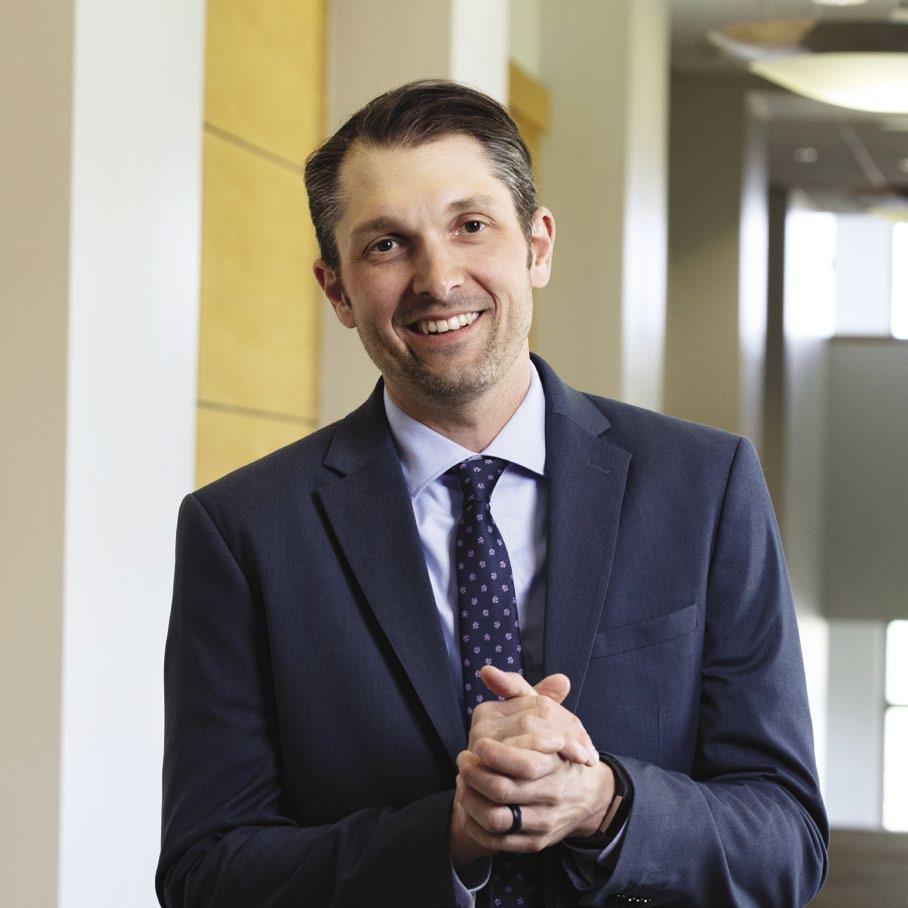

RANKING FOR THE THIRD CONSECUTIVE YEAR
Pace University’s Elisabeth Haub School of Law is once again ranked number one in the country for Environmental Law by the latest U.S. News and World Report rankings.
This is the third year in a row, and the fourth time in five years, that Haub Law has received the number one ranking for Environmental Law, marking the latest major success for the school’s Environmental Law Program. With a global footprint and consistently rated among the very best in the country, the program continues to recruit top faculty, generate top scholarship in the field, establish leading-edge programs to address the most pressing environmental challenges, and attract students who seek to become the environmental law leaders of the future.
The Elisabeth Haub School of Law had several other programs recognized in the rankings this year, including its clinical training, health law, criminal law, tax law, and part-time programs. The recognition of these programs reflects Haub Law’s continued ability to provide a top-notch legal education and develop both steadfast and original curricular and practical opportunities.
Additionally, Haub Law’s impressive trial advocacy program continues to rise in the rankings, coming in at number 24 this year, once again ranking in the top 15% of law schools. n
SUMMER 2023 9
“WE PROVIDE OUR STUDENTS WITH AN IMMERSIVE CLASSROOM EXPERIENCE WHILE ALSO ENSURING OUR STUDENTS HAVE NUMEROUS PRACTICAL LEARNING OPPORTUNITIES, SO THEY ARE ABLE TRANSITION FROM THE CLASSROOM INTO THE FIELD SEAMLESSLY.”
JASON J. CZARNEZKI, KERLIN DISTINGUISHED PROFESSOR OF ENVIRONMENTAL LAW AND ASSOCIATE DEAN FOR ENVIRONMENTAL LAW PROGRAMS AND STRATEGIC INITIATIVES AT HAUB LAW
MAKING AN IMPACT
HAUB LAW STUDENTS LEAD RESEARCH PROJECT SUPPORTING NEW STATE LEGISLATION FOR VILLAGE INCORPORATION



A team of students from the Elisabeth Haub School of Law at Pace University, supported by expert faculty, were commissioned by Senate Majority Leader Andrea Stewart-Cousins to lead an in-depth study of New York State law surrounding the village incorporation process. Their report, Incorporation in New York: Legislative Options for Reform, was presented to the Senate Majority Leader along with more than 20 Senators, Assemblymembers and legislative staff from across the State who were eager for the information and discussion regarding the proposed solutions.
In Westchester County, residents in the censusdesignated area of Edgemont have been seeking to become an incorporated village since 2019, citing land use decisions and costly settlements by the Town of Greenburgh. The ongoing debate has led to a broader dialogue on the subject among government leaders and cause to seek an outside perspective on the efficacy of New York State’s current incorporations laws. Last year, Senator Stewart-Cousins, a proud alumna who holds both a Bachelor’s Degree and Masters of Public Administration from Pace University, reached out to Haub Law Dean Horace E. Anderson, Jr. to see if the Law School could help in the endeavor.
“The study came out of the State’s desire to ensure that the right formula for growth is in place for those villages seeking incorporation, taking into consideration a broader scope of issues than has been the case historically,” said Dean Horace E. Anderson, Jr. “This project was a great example of how our students experience law beyond the classroom. At Haub Law, we are not just training our students to be lawyers, but also to have an impact on their communities.”
Drawing upon its national reputation in land use law, Haub Law
assembled a research team comprised of upper-level students Hailey Pedicano, Carly Hopkins, and Mia Petrucci, led by former Adjunct Professor Lester Steinman, a founding partner of the Municipal Law & Land Use group at McCarthy Fingar LLC, one of the most respected authorities on municipal law matters in the Lower Hudson Valley region. Research and data collection was supported by Jessica Bacher, Executive Director, Pace Land Use Law Center, Deborah L. Heller, Assistant Dean of the Law Library, and Vicky Gannon, Head of Collection Services/ Reference Librarian.
The Haub Law team examined the incorporation procedures and requirements set forth in the Village Law and compared them with other states’ laws and New York law on annexation and dissolution. A 2020 Rockefeller Institute study served as the report’s research foundation and case studies and other literature on village incorporation were reviewed to better understand the reasons that motivate people to petition to incorporate. Bill research analysis further illuminated the rationale behind prior, unsuccessful efforts at legislative reform of the village incorporation process. The report concluded with research outcomes and several proposed options for legislative reform.
“I couldn’t have received a better, more thought out, and data driven report,” said Senate Majority Leader Andrea Stewart-Cousins. “Pace’s recommendations are specific and include the rationale behind them. They provide a great roadmap as to how the current law, which is over 100 years old, should be updated. Several years ago, we updated the state law on government consolidation, but we never updated the incorporation law. We now have a starting point, and I am pleased to say that the State Senate has just passed legislation incorporating several of their recommendations. My thanks and appreciation go to Dean Anderson, Lester Steinman, and especially to the students, faculty and staff of Pace Law School. “ n
10 HAUB LAW ALUMNI MAGAZINE HAUB HEADLINES
Mia Petrucci
Hailey Pedicano
Carly Hopkins
Haub Law’s Board of Visitors Welcomes THREE DISTINGUISHED MEMBERS OF THE LEGAL COMMUNITY
Miriam (“Mimi”) E. Rocah is the Westchester County District Attorney. Leading the largest prosecutorial agency in the state of New York outside New York City, DA Rocah has dedicated her life to pursuing justice for victims, keeping our communities safe, and working for a fairer criminal justice system for all. Previously, she served as Haub Law’s Distinguished Fellow in Criminal Justice.
BOARD OF VISITORS
OFFICERS
Caesar Lopez ’12 is the Chief Administrative Officer and General Counsel for the Orlando City Soccer Club of Major League Soccer, Orlando Pride of the National Women’s Soccer League and Exploria Stadium. In his role, he oversees all legal and business affairs, strategic projects, human resources, facilities and operations, administration and external/ government affairs.
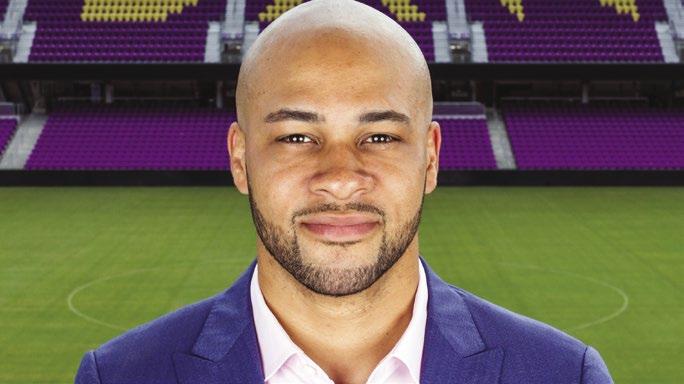
Felipe Paez ’96 is Global Lead Counsel at Ernst & Young (“EY”). At EY, he is the Partner/Principal leading Global Data Protection and serves as the EY Network’s Global Privacy Leader. Paez has broad global experience advising strategic leaders and leading legal and risk management teams in highly complex government and corporate organizations.
Kathleen Donelli ’85
Alfred E. Donnellan ’81 BOARD OF VISITORS CO-CHAIR BOARD OF VISITORS CO-CHAIR
MEMBERS
Mayo Bartlett ’92
Brian T. Belowich ’99
Vernon J. Brown ’96
Steven J. Chananie ’83
Jeffrey J. Delaney ’92
Lisa M. Denig ’09
Anthony J. Enea ’85
Christopher B. Fisher ’94
Susan E. Galvao ’93
Angela M. Giannini ’88
Peter S. Goodman ’86
The Honorable Philip M. Halpern ’80
Paul Humphreys ’09
The Honorable Linda S. Jamieson ’79
Diana B. Kolev ’05
John C. Lettera ’99
Caesar Lopez ’12
Senator Shelley B. Mayer

The Honorable Sondra Miller
William M. Mooney III ’92
Leslie Morioka ’93
Richard L. O’Rourke ’81

Felipe Paez ’96
Joseph Pastore III ’91
Anthony Pirrotti Jr. ’90
John J. Rapisardi ’82
Miriam E. Rocah
Jerold R. Ruderman
Paul Saunders
The Honorable
Anthony A. Scarpino Jr.
Chris Wallace ’97
SUMMER 2023 11
HAUB HEADLINES
SUPPORTING THE PIPELINE TO PRACTICE
Haub Law is committed to diversifying and advancing the legal profession by exposing, educating, and preparing underrepresented students for careers in law. The Law School aims to advance civic and legal education to empower youth in our community and beyond. Each year, the Law School hosts numerous pipeline programs in partnership with local organizations, government, court systems and legal firms who share our mission.

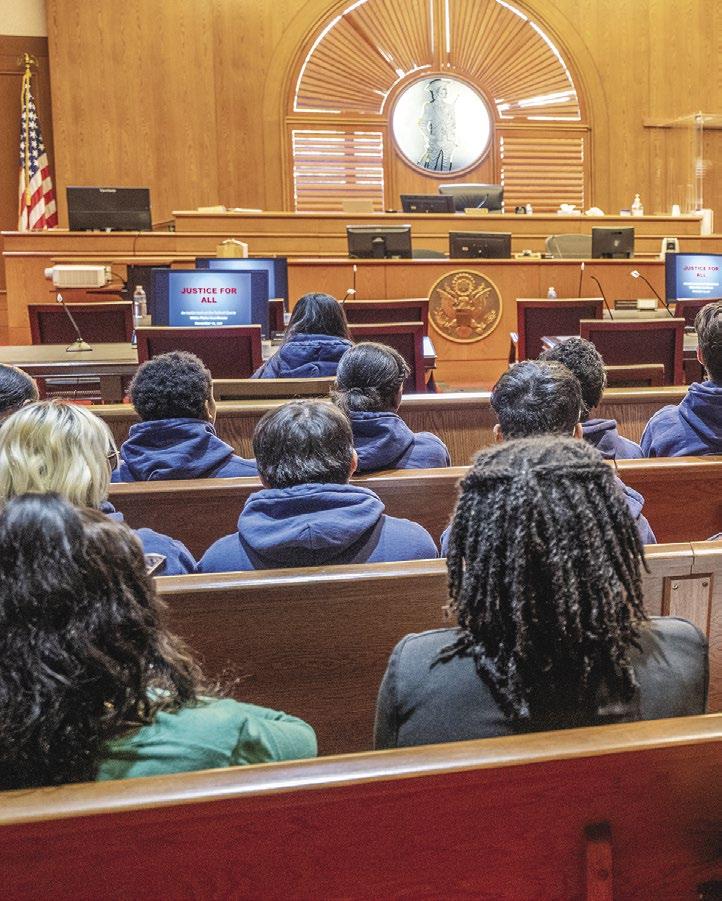
Pipeline programs are an important part of Haub Law’s Access to Justice Project, which was announced by Dean Horace Anderson in 2020. Pace A2J incorporates curricular, experiential, research, and policy advocacy components, all designed to increase student, faculty and staff engagement in pro bono and community work, and to support the local community in addressing justice gaps. Already, Pace A2J has made notable strides in building community connections and engaging students in efforts to address justice and inequity gaps through curricular, pro bono, and programmatic innovations.
Verizon Street Law Legal Diversity Pipeline Program
In addition to our annual pipeline programs, Haub Law has entered into two major diversity focused partnerships in 2022-23.
In March 2023, Haub Law students partnered with attorneys from Verizon to deliver its Street Law Legal Diversity Pipeline Program, a global program aiming to advance civic and law education to empower youth. The four-part program included classroom workshops on law-related topics at New Rochelle High School, culminating with a full-day capstone experience at the Law School.
The program was spearheaded by Haub Law alumnus Jerome Silber ’83, Vice President & Deputy General Counsel, Verizon Business Group. Sibler, along with six volunteer attorneys from across Verizon’s legal department, has been running the program for five years. Verizon currently supports Street Law programs in 11 cities, and has reached out to Haub Law to expand its Westchester County program.
“Our partnership with Haub Law was a natural fit,” said Silber. “I’ve enjoyed reconnecting with my alma matter and the law students have been such an asset to our program. They bring a fresh perspective on the curriculum we’ve developed and are great role models for high school students. It has been a rewarding experience for all of us to teach young people in our community about the law and legal profession.
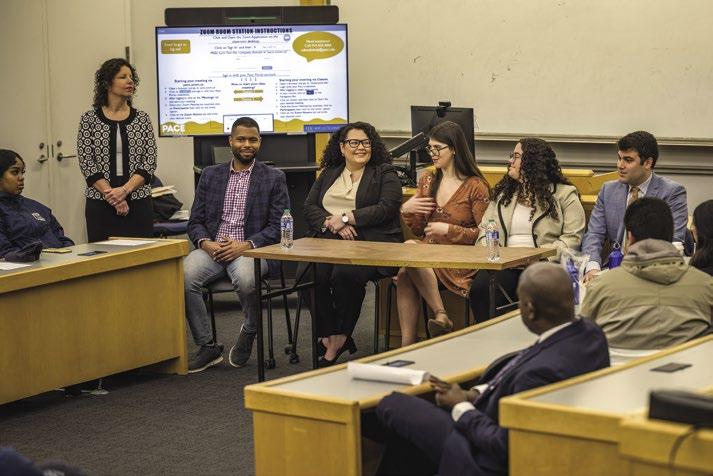
Our goal is to provide a support system to help them get where they need to go.”
In coordination with the host teacher from New Rochelle High School, eight Haub Law students joined the Verizon attorneys to prepare and teach classes on Immigration Law, Advertising Law, and Search and Seizure to 20 students enrolled in a business law class.
During the seminars, students examined different areas of the law and engaged in discussion and role playing, acting out scenarios such as reasonable search and seizure during a routine traffic stop based on the Fourth Amendment. They learned how to evaluate truthful vs deceptive advertisements and to determine what kind of immigration visa is required for different situations.
The class took a trip to the Law School for the final capstone of the program, which included workshops where students prepared arguments on each topic and presented before a panel of judges. As part of the day’s agenda, students enjoyed a tour of the Law School and casual career conversations with law students, faculty, and Verizon lawyers.
“Programs like this are so important to educate students to know and understand the law, and to be empowered to use it,” said Haub Law Dean
12 HAUB LAW ALUMNI MAGAZINE
HAUB HEADLINES
Horace Anderson. “We are thrilled to support partners like Verizon who share our commitment to addressing the dearth of diversity in the legal profession and who devote their energy on impactful ways that can improve access to justice in our community.”
Second Circuit Pipeline Program
The second diversity-focused partnership is with the U.S. Court of Appeals for the Second Circuit. Named The Honorable Robert A. Katzmann Justice For All: Courts and the Community Initiative, the civic education project of the Second Circuit federal courts, was launched by the late Second Circuit Chief Judge Robert A. Katzmann in 2014. The two-part program brings students first to the federal courthouse and then to a law school.
The first part of the program was held on November 10, 2022, at the federal courthouse in White Plains, and featured speakers including U.S. Attorney Damian Williams, Westchester County District Attorney Mimi Rocah, and several federal judges from the Southern District of New York.

The “Day in Law School” was the second segment of a two-part immersive experience designed to provide Westchester high school students with opportunities to learn about the law and the legal system, including careers in that system. On March 24, 2023, the Second Circuit, Haub Law, and the White Plains Youth Bureau’s Community Youth Court held an event at the Law School for high school students throughout Westchester County and beyond.
U.S. Circuit Judge Joseph F. Bianco and Haub Law Dean Horace Anderson welcomed high school students to the Law School, where they engaged with law students and faculty, toured the Law School campus, participated in a mock law school class taught by Professor Emily Gold Waldman, took part in a Supreme Court argument simulation, and heard from a variety of speakers, including former New York Jets player, and now New York City-based attorney, Michael Catapano. The two-part program is the first of its kind for the Second Circuit. n

SUMMER 2022 PIPELINE PARTNERSHIPS
The Scales of Justice Academy was founded in 2009 by Haub Law Adjunct Professor the Honorable La Tia W. Martin, New York State Supreme Court Justice. Each year, promising young women from diverse backgrounds are selected to participate in this two-week program, which is designed to inspire future educational paths that might lead to careers in the law.
Haub Law participated in a Mock Legislature event with Senate Majority Leader Andrea Stewart-Cousins’ Youth Advisory Council, at the New York State Judicial Institute. The event provided hands-on experience in the State legislative and democratic process for Westchester County youth, promoting skills that foster civic engagement.
The New York Legal Education Opportunity Program, organized by the Hon. Kathie E. Davidson of the New York State Judicial Institute, returned to the Haub Law campus this past summer. The intense six-week program promotes academic success in law school for those historically under- represented in the legal profession. Haub Law welcomed five of the program’s 2022 graduates to its class of 2025 this past fall.
Haub Law hosted the White Plains Youth Bureau’s Youth Court Law Day 2022, bringing together bright and ambitious students with a passion for social justice to learn about the field of law. Students had a chance to meet law leaders including Westchester District Attorney Mimi Rocah and Dean Horace Anderson, as well as law students who joined a career panel to provide advice about law school.
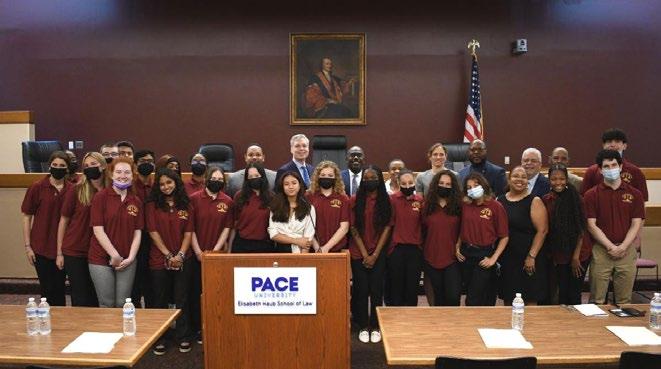


SUMMER 2023 13
HAUB HEADLINES
2022 Haub Law Emerging Scholar in Gender & Law Selected
Professor Elizabeth D. Katz of Washington University in St. Louis School of Law was selected as the 2021-2022 Haub Law Emerging Scholar in Gender & Law for her paper Sex, Suffrage, and State Constitutional Law: Women’s Legal Right to Hold Public Office, 33 Yale J. Law & Feminism. 110 (2022).
2022 Elisabeth Haub Award for Environmental Law and Diplomacy Awarded
Professor Paulo de Bessa Antunes, an environmental scholar and leading professor of environmental law at Universidade Federal do Estado do Rio de Janeiro, and head of the Environmental Practice of Campos Mello Advogados (Brazil) received the 2022 Elisabeth Haub Award for Environmental Law and Diplomacy.

Haub Law Ranked #1 Among the Top 50 Environmental Policy Centers of Excellence Across the Globe
The journal of Environmental Policy and Law (EPL) ranked Haub Law #1 in the top 50 Environmental Policy Centers of Excellence across the globe.

Renowned ADR Expert Erin Gleason Alvarez Joins Haub Law as Director of the Law School’s Mediation Practicum
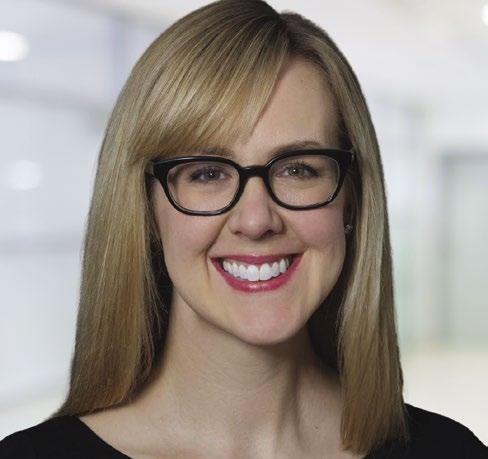

The Mediation Practicum at Haub Law trains students to serve as mediators in small claims disputes. Gleason Alvarez also serves as an adjunct professor at the Law School and conduct mediation trainings for the broader Haub Law community.
Haub Law Brings Together Local Business and ESG Community for the Kickoff of its Sustainable Business Law Hub
On September 21, 2022, Haub Law held the kick-off event for the Sustainable Business Law Hub. The well-attended event provided a networking opportunity for like-minded business, environmental and legal professionals dedicated to sustainable business practices in Westchester County, New York City, and beyond.

Second Annual Pace Access to Justice Workshop Spotlights the Important Issues Surrounding Voting Access, Elections, and Democracy
On March 29, 2023, Haub Law presented the Second Annual Pace Access to Justice (A2J) Workshop themed: “Voting, Democracy, and the Law”. The Workshop brought together national voting rights and election law experts and advocates with Haub Law faculty, staff, students, and community guests to learn and engage in a dialogue centering on the important issues of voting access, election law, and our democratic process.

14 HAUB LAW
MAGAZINE
ALUMNI
Artist-in-Residence Geoffrey Stein Discusses Artistic Process During Reception and Unveils Original Portrait of Professor Nicholas Robinson
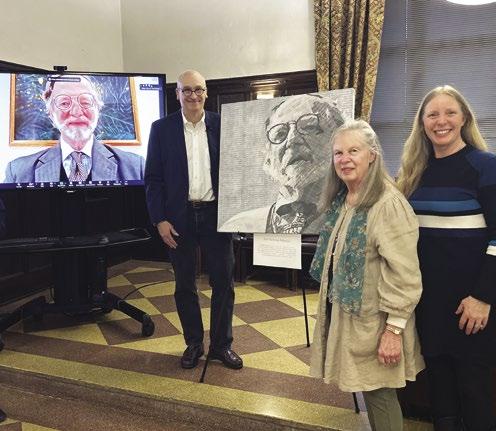
Haub Law celebrated its first official Artist-in-Residence, Geoffrey Stein, with a special program highlighting his work and process. The artist also unveiled a new portrait of Haub Law Professor Nicholas A. Robinson, which was generously donated to the Law School. Dean Horace Anderson then led a candid conversation into Geoffrey’s process and the complexities of protecting intellectual property for creative works.
Professor Lisa Benjamin of Lewis & Clark Law School receives 2022-2023 Pace|Haub

Environmental Law Distinguished Junior Scholar Award
The Pace|Haub Environmental Law Distinguished Junior Scholar Award is presented annually to an emerging junior environmental law professor who exhibits scholarly excellence and promise at an early stage in their career. Professor Benjamin’s research focuses on climate justice and climate risk, and how these issues intersect with energy law and administrative law.
Inaugural Equity & Justice Forum Features Marcia Sells, Chief Diversity Officer, Metropolitan Opera
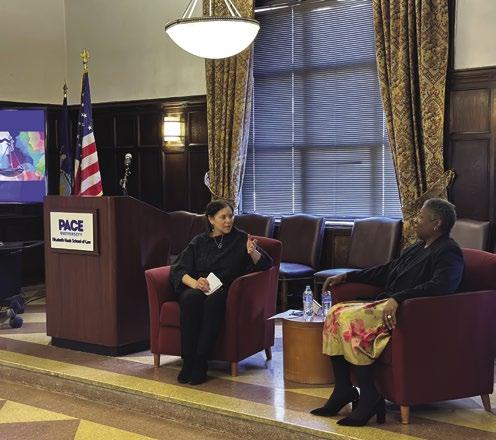
On March 20, 2023, Haub Law presented their annual Inaugural Equity & Justice Forum. Marcia Sells, Chief Diversity Officer, Metropolitan Opera, was the featured panelist for this inaugural forum titled, “Belonging – Centuries of Struggle,” which highlighted the challenges of diverse communities in the legal profession. The forum was moderated by Haub Law Professor and Director of Diversity, Equity, and Inclusion, Barbara Atwell.
Sustainable Business Law Hub Partners with Prestigious Firms to Provide Practical Student Internship Experiences and Launches Hub Student Scholars Program
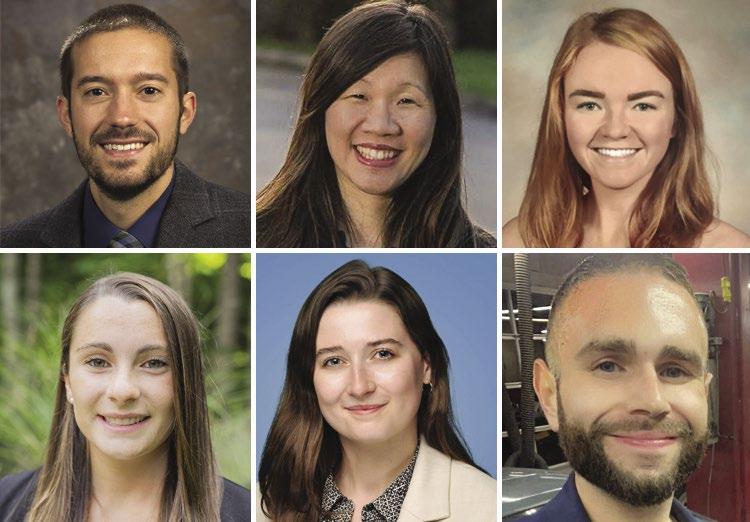
As part of the Sustainable Business Law Hub, Haub Law has collaborated with prestigious firms and companies to offer students paid internship opportunities in their ESG practice. Haub Law has also launched the Sustainable Business Law Hub Student Scholars Program. The Hub Scholars Program is a key component of the Sustainable Business Law Hub in creating the next generation of sustainable business lawyers. Six students have been selected to serve as the inaugural Sustainable Business Law Hub Student Scholars and will benefit from ESG internships at prestigious law firms.
Haub Law Co-Hosts Impactful New Directions in Environmental Law Conference and Food Law Student Leadership Summit
The Haub Law community of faculty and students played key roles building up to and during the NDEL/FLSLS Conference, whose joint conference theme was “Rethinking Resilience”. Haub Law Professor Josh Galperin was central in the overall success of the Conference as its faculty advisor, working with the students to plan and ultimately execute the conference. The conference covered ocean and coastal justice, food sovereignty, Indigenous knowledge, sustainable business, the Farm Bill, and more.

SUMMER 2023 15 HAUB HEADLINES
Eric Brown ’25 AN OFFICER AND A (FUTURE) LAWYER
ERIC BROWN HAS BECOME ACCUSTOMED TO BALANCING WORK, SCHOOL, AND RESPONSIBILITIES throughout his life. Eric grew up in a single parent household where his mother instilled in him the importance of an education. “My mother and grandmother’s backgrounds trace back to Puerto Rico,” said Eric. “They both worked from a very young age but were never pushed to pursue any sort of education beyond high school. After my mother finished high school and had my brother and me, she did start her college degree, but it was difficult as a single parent to continue while also working and raising two children alone. From a young age, she encouraged me to place a priority on my education.”
After Eric finished high school, he moved away from home and attended Manhattanville College while also working part-time. “I am the first to attend and graduate college in my family. After college, I also obtained my master’s degree from Seton Hall. Receiving my JD will be my third higher education degree.” Eric originally aspired to be a dentist, but quickly learned that he did not enjoy the coursework as much as he anticipated. “I was bored, but then one day I attended a job fair and met a professor who invited me to take a political science course. I fell in love with the curriculum and decided to pursue a degree in it.”
Shortly after graduating from college, Eric took the police department exam and began a career in law enforcement. Once he decided to attend law school, Eric sought out the perfect setting for him to do that – one where he could continue his job as a police officer and further his education. Haub Law was the perfect fit with its flexible part-time program. “I have worked part-time throughout all my educational pursuits. It has allowed me to honor my upbringing, provide for myself, and my family.”
Eric acknowledges that the busy schedule of being a part-time law student along with a police officer is not without its struggles at times, but also very rewarding. “Having the experience as a police officer has been very beneficial, it allows me to see both sides of the law and view
things more objectively. While I am constantly on the go, my outlook has always been positive and that anything is possible if you stay focused and humble. This is especially true if you stay confident in yourself while never being afraid to ask for help.”
For Eric, help when he needs it, has been readily available at Haub Law. “I personally love the extra support that is always given by the staff and professors here. And, my classmates are amazing, they are always willing to help one another out. The level of comradery is extraordinary.” In particular, Eric is thankful for the support he has received from the Honorable Daniel D. Angiolillo, who is the Jurist-in-Residence at Haub Law and also, Dean for Students Angie D’Agostino. “Both of these individuals have instilled so much wisdom in me and so much support. In my life, I have learned that the right people will always show up when you need it and that has proven very true here for me.”
As a part-time student, Eric is set to graduate in 2025 from Haub Law. He spent his most recent spring semester as a judicial extern for the Honorable Adam Silvera, an Administrative Judge in the Civil Division of the New York State Supreme Court. As far as future goals, Eric is taking it one day at a time. “I really enjoy my career in law enforcement, but I can also see myself in the private sector. I try to have an open mind about the future.” n

16 HAUB LAW ALUMNI MAGAZINE
“
MY CLASSMATES ARE AMAZING, THEY ARE ALWAYS WILLING TO HELP ONE ANOTHER OUT. THE LEVEL OF COMRADERY IS EXTRAORDINARY.”
ERIC BROWN ’25
OF NOTE
Christen Maccone ’23 WINS INAUGURAL JOHN R. NOLON STUDENT WRITING COMPETITION
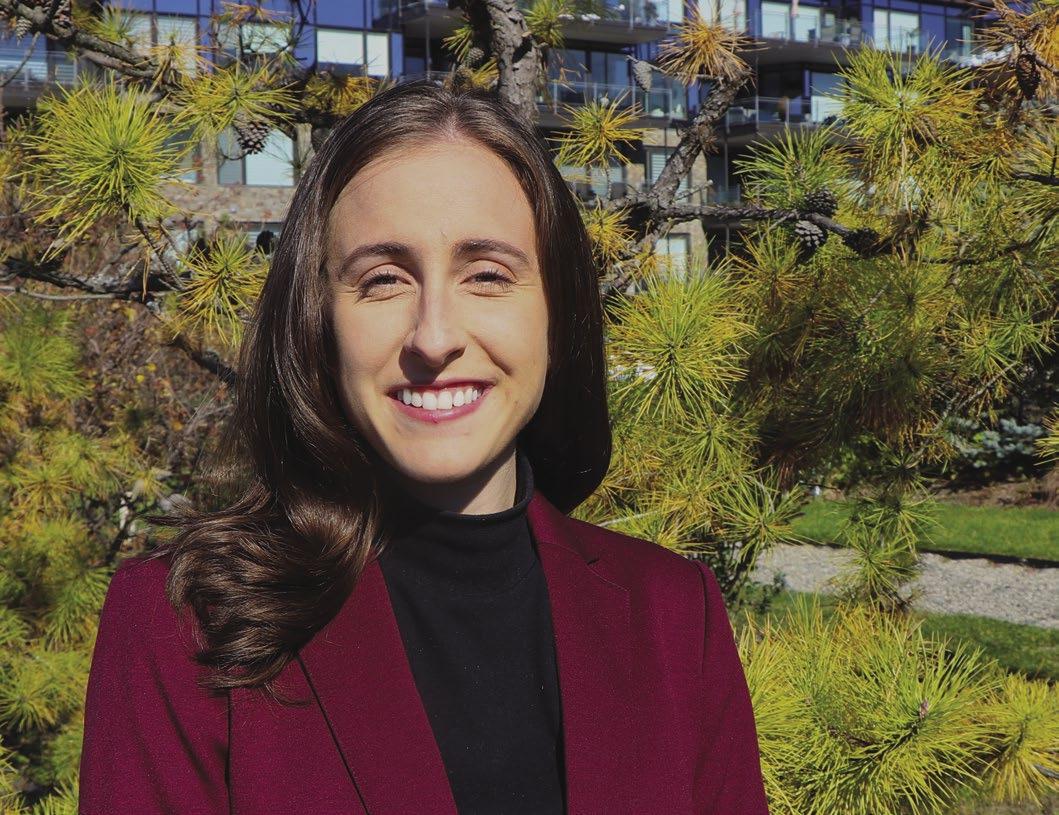
At the Pace Environmental Law Review (PELR) Symposium held on October 28, 2022, PELR announced Christen Maccone, a 3L at the time, as the winner of the inaugural John R. Nolon Student Writing Competition. Christen’s article entitled, Should Environmental Protection be Through Anthropocentric Rights?, addresses the issues with human-centered, instead of eco-centered, environmental rights, in keeping with the Symposium’s theme of “Environmental Constitutionalism.” Christen’s winning article will be published in a future issue of the Pace Environmental Law Review.
“The law’s protection of the environment is historically tied to humanity’s use of the environment,” said student competition winner, 3L Christen Maccone. “Constitutional environmental rights, while creating a possibility to afford further protection, inevitably fall short in this same way because of the way constitutions work. Through a biocentric approach, better protections can be afforded to the environment, beyond its known worth to humanity,” said Maccone. “The Professor John R. Nolon Student Writing Competition gives a spotlight for students amongst scholars, advocates, regulators, policymakers, and other practicing professionals, to share their ideas on a growing area of law. This competition serves as proof that students, though still in school and not yet practicing, can be at the forefront of emerging areas of law.”
This annual competition is open to students at law schools throughout the country. The first-place award carries the promise of publication in PELR and a $500 scholarship. The competition, named after Elisabeth Haub School of Law at Pace University Distinguished Professor of Law Emeritus John Nolon, honors Professor Nolon’s dedication to student scholarship.
A very active student, Christen participated in a number of Haub Law’s environmental offerings and opportunities. She was a legal intern with the New York City Department of Environmental Protection, the New York State Department of Environmental Conservation, and the Office
of Regional Counsel of the United States Environmental Protection Agency. Last summer, she was an honors intern in the environmental law division of the New York City Law Department, where she will return as an Assistant Corporation Counsel this fall, after taking the July 2023 Bar Exam. This past fall, Christen completed an externship with the Office of the New York State Attorney General’s Environmental Protection Bureau. Additionally, she has been able to volunteer with the New York State Bar Association Task Force on Ethics of Local Public Sector Lawyering, serve as an editor for the Water Resources Year In Review publication, and serve as the Law Student Liaison for the American Bar Association Section on the Environment, Energy, and Resources. Rounding out her practical experiences at Haub Law, this spring, Christen returned to the NYC Department of Environmental Protection as a legal fellow.
“I feel so fortunate to have had so many hands-on environmental experiences and opportunities during my three years at Haub Law,” said Christen. “While I am nervous for the Bar exam, I feel that my time at Haub Law has truly prepared me to hit the ground running both in my studies and my career. I remain confident that my experiences will enable me to meet new challenges with alacrity and put the skills I have learned to practice.” n
SUMMER 2023 17
Daniel Reyes ’24 BELIEVING IN YOU
AS A 2L, WHEN ASKED ABOUT HIS HAUB LAW EXPERIENCE SO FAR, THE FIRST WORDS DANIEL REYES MENTIONS ARE “SUPPORT SYSTEM.” Daniel grew up with a closeknit family who looked to one another for support, so seeking out the same environment for his educational pursuits was paramount. “I am a first-generation college graduate and law student; my parents always preached the importance of education to my brother and I and the importance of having people you can depend on. My brother recently became the first engineer in the family, and I am now working towards becoming the first lawyer in the family. Haub Law showed immense faith in my potential and had a very family-oriented feel to its campus.”
For Daniel, his involvement with the Latin American Law Students Association (LALSA) has been where he found his support system. “The members of LALSA have been mentors for me and have truly guided me throughout my first two years at Haub Law. I am truly grateful for each and every one of them and it was so rewarding to serve as a mentor for the incoming 1L class in return.” Daniel is also a member of the First Generation Law Students Society, which he notes has connected him with so many others who share a similar background and upbringing as him.
As a 2L, Daniel participated in Haub Law’s competitive Federal Judicial Honors Program (FJHP), where he worked in the federal courts for the Southern District of New York for twelve hours a week. “The experience was both challenging and rewarding. Having the opportunity to have your writing and research skills put to the test at a judge’s standard is intimidating, but a very valuable learning experience. The practical and hands on knowledge I gained is amazing.”
While law school wasn’t always at the forefront of Daniel’s mind, today, he can’t imagine another educational pursuit. “For most of my life, I wanted to become a police officer. However, I began studying accounting during undergrad and discovered a new passion. After graduating from Rutgers in 2020, I decided that going to law school would be the best way to merge my two interests in criminal justice and accounting. I try to keep an open mind and think outside of the box. Attending Haub Law has solidified for me that I made the right choice.”
Although Daniel still has another year left of law school, he hopes to work in private practice one day. “Right now, I am interested in corporate,
banking, securities, and tax law. However, each new experience I have at Haub Law makes me realize how vast the profession of law is and that there truly is no limit to what you can do with your degree.”
When Daniel isn’t studying, he enjoys playing chess, soccer, and snowboarding. He is also a huge New York Jets fan. His advice for a successful law school experience: “The first step to success is believing in yourself! Once you truly have faith in your capabilities, the only person that can stop you is YOU.” n

18 HAUB LAW ALUMNI MAGAZINE OF NOTE
“ EACH NEW EXPERIENCE I HAVE AT HAUB LAW MAKES ME REALIZE... THERE TRULY IS NO LIMIT TO WHAT YOU CAN DO WITH YOUR DEGREE.”
DANIEL REYES ’24
Q&A A Star on the Rise Kasama Star ’23
Kasama Star ’23 grew up in a single parent immigrant household, moving from Thailand to Queens when she was 7 years old. After completing her undergraduate degree, MBA, and taking time off to raise her family, it was the murder of George Floyd that motivated Kasama to apply to Haub Law. Three years later, Kasama feels that Haub Law has provided her with top tier opportunities, experiences, and resources. After taking the bar exam, she will begin her legal journey as a litigation associate at a NYC firm.
What will you miss about Haub Law?
So much. I am sad to graduate, there is always so much more to learn. I picked up a new interest/skill even in my last semester when I took the Mediation Practicum with Professor Erin Gleason Alvarez. I have really enjoyed being a mediator. Mediation is a skillset that builds upon my previous life experiences (studying psychology and business). It feels really gratifying to give people a chance to air their feelings and an opportunity to resolve their disputes so that they can avoid the costs and expenses (mental and physical) of litigation. But most importantly, witnessing the opportunity to repair a relationship after a dispute is what really gratifies me as a mediator. So, I will miss the constant stream of opportunities to learn more, do more, and discover new passions. Haub Law has left me feeling very blessed and well-trained.
What brought you to law school and to Haub Law in particular?
I grew up in a single parent immigrant household and am originally from Thailand. Growing up as an immigrant, I never thought going into law was a possibility. I was raised with the mentality that professions like law are not something immigrants do, and I shouldn’t even think about it. I completed my undergraduate studies at Cornell and worked as a web designer. From there, I received my MBA at NYU Stern and transitioned to business process management. Then, I took time off to care for my kids and be a mom. It was during the pandemic, after the murder of George Floyd that I knew I wanted to do something. I decided to go to law
OF NOTE
school. I applied to two law schools and was accepted into both. Haub Law had a lot of what I was looking for in terms of location and size. I chose Haub Law, and the rest is history.
You have been very involved during your time at Haub Law, in particular with the Asian Pacific American Law Students Association (APALSA) – what has that experience meant to you?

As soon as I came to law school, I was able to get involved with the Land Use Law Center and Professor Nolon and during that time I read the book “The Color of Law” – which discusses redlining and the way it impacts Black Americans to this day. In that book, you learn about the case, Shelley v. Kraemer, which discusses restrictive covenants. Until I read the case in entirety, I didn’t realize that they had consolidated two cases, one had a covenant that was also restrictive against Asians (restriction applied to “Mongolian Race”), while another also implied the exclusion of Asians (and other non-White races) and I was fascinated by it. So, circling back to an earlier question about how I got to law school – I am here because of George Floyd, but the moment I read that case, I realized that I am here because of my upbringing too. I ended up doing extensive research on our American history against Asian Americans and was able to conduct several panels and presentations through APALSA. As an immigrant, you can feel very powerless, and the fear of deportation is driven into the back of your mind. When I came to law school, to be able to be involved in an organization like APALSA, learning more about the appalling legal history of AAPI discrimination and presenting on it have been empowering. Also, in my Environmental Justice class, I learned so much more about structural inequities and atrocities like the mass sterilization of Native American women. I feel so much more powerful and equipped to respond to arguments positing structural inequities as choices or coincidences.
Which professors at Haub Law have been most impactful for you?
Where do I begin? All of them, really. As soon as I started law school, I knew what a great community I had just become a part of and as a result, my (non-exhaustive) list of impactful professors and staff is very long. Professor Waldman has been an incredible mentor to me.
Continued on page 22
SUMMER 2023 19
RECORD NUMBER OF HAUB LAW STUDENTS ENROLL IN JD/MEM DUAL DEGREE PROGRAM
Haub Law’s dual JD/Master of Environmental Management program, a collaboration with the Yale School of the Environment, provides students at Haub Law with the right combination of training to take on global environmental challenges. The Master of Environmental Management degree from Yale prepares students to address ecological and social systems within a broader framework and with greater scientific understanding. The JD/MEM program is designed for those interested in environmental policy and analysis, stewardship, education, consulting, or management in connection with natural resources and environmental issues.
The valuable opportunities that the dual degree program provides have not gone unnoticed; currently there are 13 Haub Law students enrolled in the program, the highest number in the history of the program. Along with providing a rich perspective on environmental law, the dual degree program can give lawyers, whether in government, nonprofits or law firms, an edge in a competitive job market. It can provide policymakers with the legal and scientific tools necessary to make effective and politically acceptable policy. The program recreates the interdisciplinary working atmosphere that exists in almost all environmental law and policy jobs. It provides an excellent way to gain both scientific and legal skills and understanding, and can be extremely valuable in a world that increasingly prizes interdisciplinary knowledge and collaboration.
“The dual degree program allows me the flexibility to explore my interests in sustainable finance and local environmental law,” said Gabriella Mickel ’24. “Haub Law gave me a specialized environmental legal foundation. Meanwhile, the Yale School of the Environment is giving me the interdisciplinary skills I need to be successful in my desired fields.”
Haub Law’s Environmental Law program has consistently been ranked among the very best in the nation. For the third year in a row, and the fourth time in five years, in the U.S. News and World Report rankings, Haub Law’s Environmental Law program was ranked number one in the nation. The program continues to recruit top faculty, establish leadingedge programs to address the most pressing environmental challenges, attract students who seek to become the environmental law leaders of the future, and collaborate with leading institutions, such as Yale, to provide additional opportunities for its students.

20 HAUB LAW ALUMNI MAGAZINE
Broaden the Skill Set
“The aim of the dual degree program is to broaden the skill set and the imagination that a law degree brings,” said the program’s director, Haub Law Assistant Professor Josh Galperin, who has been involved with it for almost two decades, first as a student in the program, then as a lecturer at Yale Law School and the Yale School of the Environment, and now as the program’s director at Haub Law.

“The program allows students to expand their vision as they go into environmental law or policy. Law provides a valuable tool but has a narrower focus on research, writing and analysis. Environmental law practice requires a more diverse set of tools, including scientific knowledge, communications skills, and an understanding of the economic, social and political dimensions of an issue. Science tells us how to clean up environmental hazards, but it’s the difficult political and social issues involved that really need addressing. Environmental problems are mostly human problems,” Professor Galperin said.
The dual degree program allows students to earn both a JD and a master’s degree in four years, instead of the five years that it would take to earn both degrees separately. Candidates for the JD/MEM must earn a total of 124 credits, 88 from Haub Law and 36 from the Yale School of the Environment. Twelve credits from Yale can be applied toward graduation from Haub Law; twelve credits from Haub Law can be applied toward graduation from Yale. Haub Law students can apply before law school or during the fall semester of either their first or second year and can also apply to both Yale and Haub at the same time. Students must apply to both schools and meet the admission requirements of each one.

“The dual degree program is pretty unusual in that it allows students to participate from different law schools, Haub Law and Vermont, both of which have top-notch environmental law programs,” Professor Galperin said. “Other dual degree programs often involve law students getting master’s degrees from an environmental program at their own universities.”
Among other things, Professor Galperin said, students learn how to work in teams, to collaborate, and to think about problems beyond their legal dimensions, in a way that reflects the real-world practice of environmental law. “The real value is the way you learn,” he said. “You learn to practice in interdisciplinary groups.” When he became involved in the program as a faculty member at the Yale School of the Environment, Professor Galperin had two goals in mind: to make the rules of the program more regular and transparent, and to “create a sense of community” among students.
He says the biggest change in the program over the past several years is that it has become more cohesive. “Students now get to know each other and connect with each other in a formal way, rather than by accident. There are occasional events both social and professional.” This is true for the Haub Law program and for the Yale School of the Environment, which a few years ago hired a coordinator who serves as a general resource for all joint degree programs, stated Professor Galperin.
Thirteen Haub Law students are currently enrolled in the dual degree program. Professor Galperin said he would like to get the word out about the program to Haub Law students who might think getting an advanced degree from Yale is out of reach. “It’s a really valuable opportunity, and it’s a realistic opportunity,” he said. Professor Galperin also offers his support to students who are interested in the program to put together a strong application.
The Yale Master of Environmental Management program requires students to choose an area of specialization from among the following topics:
• Business and the Environment
• Climate Change Science and Solutions
• Ecosystem Management and Conservation
• Energy and the Environment
• Environmental Policy Analysis
• Industrial Ecology and Green Chemistry
• People, Equity, and the Environment

• Urban
• Water Resource Science and Management
• Self-Designed
“The People, Equity, and the Environment specialization that Yale School of the Environment offers will expand my understanding of the interrelationship between human dimensions and successful environmental implementation measures,” said Haub Law student Daniel Krupa, who was recently admitted to the program. “This knowledge will assist me in dedicating my career to not only stopping these deep-rooted issues but actively working to reverse them.”
“The Yale degree is an opportunity for me to fill the substantive gaps within my continuing legal education



Continued on next page.
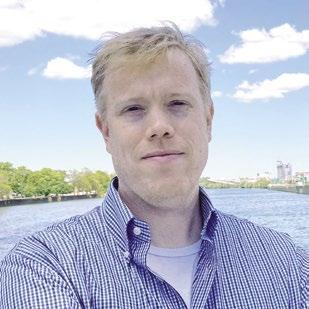
SUMMER 2023 21 OF NOTE
“ THE AIM OF THE DUAL DEGREE PROGRAM IS TO BROADEN THE SKILL SET AND THE IMAGINATION THAT A LAW DEGREE BRINGS.”
PROFESSOR JOSH GALPERIN
Top to Bottom: Professor Josh Galperin Sean Dixon ’09, ’10 Brooke Mercaldi ’24 Daniel Krupa ’25
Gabriella Mickel ’24
Jillian Aicher ’23
Lauren Lynam ’26
OF NOTE
by adding social sciences and humanities,” Daniel said further.
“Throughout law school, I focused on environmental law and land use law. More specifically, analyzing how the various levels of government can reconceptualize what “successful” land use development is by incorporating sustainability and equity components to promote environmental and social resilience.”
Rising 2L, Lauren Lynam, who was also recently admitted to the dual degree program, said it will help her bridge the current gap between business and environmental law. “Currently, I have a multidisciplinary background in environmental science, economics, technology, and law. I possess the capability to influence business decision-making with respect to the environment, but I have yet to apply my various areas of expertise in harmony. Earning a Master’s in Environmental Management, from the Yale School of the Environment, will shift my multidisciplinary skills, to an interdisciplinary method in approaching intersected business and environmental issues. With harmony in my diverse skillet, I can contribute to a critical merger in professional practice,” she said.
A Wealth of Opportunities
Jillian Aicher ’23, just completed her final semester of the joint degree program, where she specialized in Climate Change Science and Solutions. At Haub Law, she pursued the Advanced Certificate in Environmental Law, learning the fundamentals of environmental law and gaining a grounding for practicing in the field. She says the dual degree program allowed her to take advantage of a wealth of opportunities.
“During my time at Yale School of the Environment, I attended the twenty-sixth Conference of the Parties supporting the Alliance of Small Island States, served as a student clinician for the Environmental Protection Clinic’s Our Children’s Trust project, and worked on the Climate Change and Animal Agriculture Litigation Initiative through the Climate, Animal, Food and Environmental Law and Policy Lab,” Jillian said.
Jillian will be working as an Equal Justice Works Fellow with the host organization Conservation Law Foundation, where she will focus on
reducing emissions of PFAS, or “forever chemicals,” and other harmful pollutants in an underserved community in Manchester, New Hampshire.
“Participating in the joint degree program reaffirmed my commitment to pursuing a career in public interest environmental law with a focus on environmental justice. It also provided me with a stronger background in environmental science and policy to supplement the legal skills I have developed while at Pace,” she said.
Brooke Mercaldi ’24, said she is learning what it means to be an effective environmental leader. “While my experiences at Haub Law and Yale Law School are providing me with valuable legal skills and knowledge, my time at the Yale School of the Environment is teaching me critical elements of environmental science and leadership. Notably, the Yale School of the Environment’s emphasis on the importance of the “Step Up, Step Back” leadership model has had profound impacts on my perception of environmental advocacy. This diverse set of skills will help me thoroughly understand environmental issues, comprehensively evaluate approaches, and advocate for solutions that meaningfully aid impacted communities,” she said.
Haub Law alumnus Sean Dixon JD ’09, MEM ’09, LLM ’10, Soundkeeper & Executive Director of the Puget Soundkeeper Alliance in Seattle, said the dual degree program was instrumental for him in developing the skills he needs in his work protecting the waters in Washington state.
“Putting environmental law into practice - for clean water, for communities and public health, for the future - wouldn’t have been possible for me without a broader awareness of how our human, legal, and ecological systems interconnect,” said Sean.
“My dual degree afforded me the opportunity to engage with and learn from my fellow students and two sets of world-class faculties; our classes and conversations, taken together through this unique program, built a balanced baseline for my career and helped lock in my commitment to public interest advocacy, law, and sustainability.” n
A STAR ON THE RISE Kasama Star ’23 Continued from page 19.
She really cares about her students and teaches the subject of civ pro in a way that is thorough, but not intimidating. I loved taking classes with Professor Humbach, Professor Gershman, Professor Cassuto, Professor Pollans, Professor Brown, Professor Narula, Professor Kuh, Professor Lin, Dean Horace Anderson, Dean Jill Gross – they have all been amazing in their own unique ways. The Center for Career and Professional Development staff members Jill Backer, Kapila Juthani, and Elyse Diamond have all been a great support system and mentored me during my job search. I’ve also enjoyed learning from adjunct professors – Professor Hatcliffe, Professor Lettera, Professor Stephen Brown, Professor Muller, Professor Jay Diamond, Professor Shahmanesh, Professor Gleason Alvarez and Professor Carbone. I would be remiss if I didn’t mention the incredible support that I have received as a Haub Sustainable Business Law Hub Scholar as well as all the support staff at Pace who truly make it run.
What do you feel makes a “good” lawyer?
I am going to use the words that I have learned from my professors. “Don’t lose your heart, don’t lose yourself and the reasons why you came to law school.”
Do you have any advice for current or future law students?
Law school is emotionally demanding. Have confidence in yourself and just go for it. And three years later, when you are about to graduate, don’t forget to take note of what an accomplishment that is. Professor Narula reminded me before graduation about how powerful a law degree is and what a defining moment it is to accomplish graduating law school. Stay motivated - although it has been demanding, it has also been very rewarding. Haub Law graduates can do anything! n
22 HAUB LAW ALUMNI MAGAZINE
A 180 ON SECTION 230: STATE EFFORTS TO ERODE SOCIAL MEDIA IMMUNITY
WHEN HAYLEY MARGULIS HANDED IN HER FIRST ASSIGNMENT TO PROFESSOR LESLIE GARFIELD TENZER AS HER RESEARCH ASSISTANT, PROFESSOR TENZER WAS IMMEDIATELY IMPRESSED WITH THE HIGH QUALITY OF HER WORK “Hayley’s work was so fully developed that I thought it was only fair to ask her to partner with me rather than support me,” said Professor Tenzer. From there, the article writing process was a true collaboration. “It was a constant back and forth,” remarked Professor Tenzer. “Once our article was accepted for publication in the Pepperdine Law Review, Hayley was able to see the publication process first-hand.” Hayley noted that she found the entire process more complicated than she originally anticipated. “You don’t really see how much goes into a law review article until you actually write one,” said Hayley.
The article, A 180 on Section 230: State Efforts to Erode Social Media Immunity, focuses on Professor Tenzer’s expertise: social media law. It discusses recent Florida and Texas legislation aimed at limiting social media companies’ ability to regulate their content. “We started the article when the states had each first proposed the legislation, but there were challenges to the laws pretty quickly and now it looks like the issue is headed to the Supreme Court next term,” said Professor Tenzer. Professor Tenzer’s class, Social Media and the Law, is one of the most popular classes at Haub Law. “I started focusing on social media law in 2006 and I would say that up until last year, I thought of it as a fun topic, but not necessarily one with its own “body of law” but with the recent spate of Supreme Court cases it is turning into an important area of law. Any limitation of Section 230 will have a profound effect on how social media websites and internet service providers conduct business.”
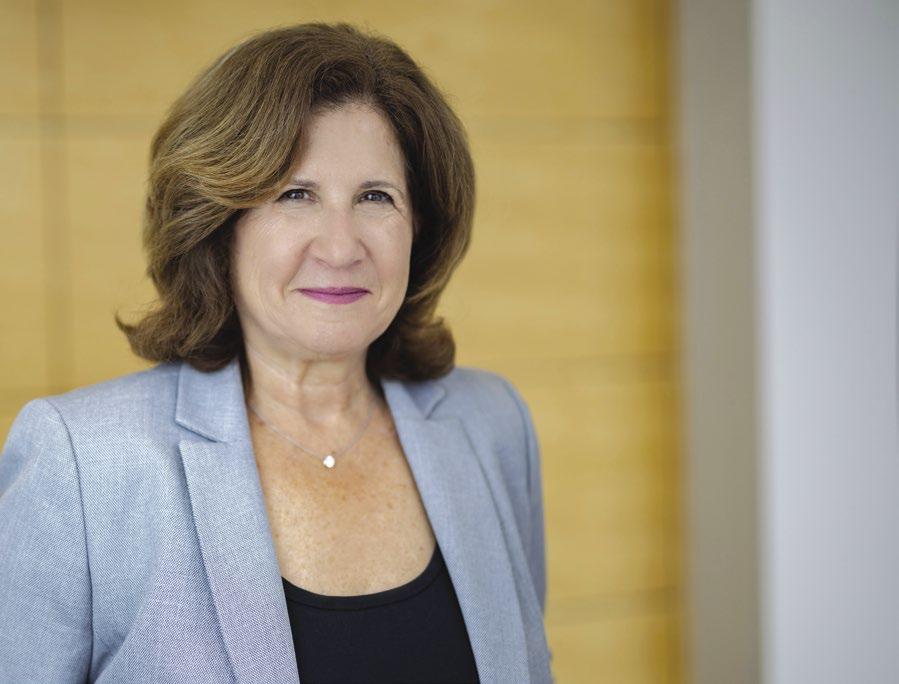
As far as the future of social media law and of social media platforms having immunity, Professor Tenzer and Hayley agree: there is a lot at play. Professor Tenzer acknowledges, “There is no doubt that social media has gone too far. Today, there are so many detriments that were not apparent when Congress adopted Section 230 of the Communications Decency Act in 1996. In my social media seminar, I start with a discussion of the legislative intent of Section 230, which states that the Internet is so important to fostering a diversity of viewpoints and providing access to information. It was such an optimistic view of what the Internet would be. Clearly it has not played out that way. It would be great if there could be some limitations on immunity but on the other hand, opening up social media companies to liability may have a huge chilling effect on the services they provide.”
Similarly, Hayley noted that she feels, “social media platforms have gone too far with limited responsibility and there needs to be new reforms, especially since the internet has changed drastically since 1996 when section 230 was enacted. There is a huge play between the first amendment freedom of speech and liabilities of social media companies, and it will be very interesting to see how the Supreme Court rules on this issue in the future or if legislators will enact a new federal law.”
Not only has the collaboration between Professor Tenzer and Hayley resulted in an interesting and published piece in a prestigious law journal, but it further exposed Hayley to an area of law that she has since developed an even more keen interest in. “After diving deep into social media laws from this article, I have found it extremely interesting,” said Hayley. “Especially since it is a relatively new area of law that is currently being shaped and updated from the changing and growing technological world. I am currently working on an article dealing with the social media laws of the United States, Venezuela, and China, and how each impacts the human rights of the citizens of their respective country.” n
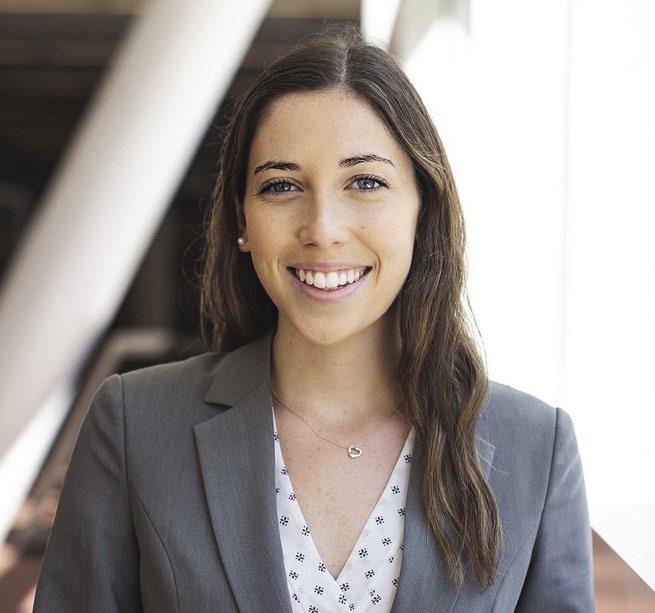
SUMMER 2023 23
OF NOTE
PROFESSOR LESLIE GARFIELD TENZER AND RISING 3L HAYLEY MARGULIS
Rising 3L Hayley Margulis
Professor Leslie Garfield Tenzer
LESSONS I’VE LEARNED FROM GENERATIONAL ADVOCACY
BY MICHAEL GIACOMO ’23
This article was originally published on The Advocate’s Advantage, a blog published by the Elisabeth Haub School of Law at Pace University Advocacy Program.

MY FAMILY HAS A STRONG PRESENCE IN THE LAW: MY DAD IS A NEW YORK STATE SUPREME COURT JUSTICE SITTING IN WHITE PLAINS, NEW YORK, AND MY AUNT IS A SOLO REAL-ESTATE PRACTITIONER BASED OUT OF ARMONK, NEW YORK. THE QUESTION WHEN I WAS GROWING UP WAS ALWAYS WHETHER I WOULD FOLLOW IN THEIR FOOTSTEPS OR ATTEMPT TO PURSUE MY OWN CAREER. Through chance, fate, and a global pandemic, I ended up here at Haub Law and spent a majority of my time working with the Advocacy program. I always knew I wanted to go to law school because as the old saying goes, “you can do anything with a law degree.” I definitely agree with that statement. However, what makes the law degree much more valuable is the fact that people need advocates. When people have an issue and they want to right their wrongs, they turn to lawyers to solve their problems. Now, aside from the general realization that lawyers are hired to solve problems, I am here to discuss some of the traits and abilities I’ve learned through my family and experience that make a good advocate.
For my first point, it is always about the client. The client will hire you and trust that you’re the right person for the job. You and the client develop a relationship where you will learn as much about them as anyone will in their entire lives. You are there to serve the client. Nonetheless, this person is paying you for your services – and in most instances at a rate well above the market average. You have to ensconce yourself in their problems and see yourself from their perspective. As a first-year associate, the partner who assigns you work is your client. This means that you should be expected to produce a work product that aligns with the partner’s writing style and grammar, which can then be given to the client. Pay close attention to how the partner does their work and reflect it accordingly, but don’t be afraid to add your own flavor to the motion or memo. After all, the partner wants to see you grow and develop into your own individual.
Eventually, when it comes time to handle your own case, this is what the best trial attorneys do. They place themselves in the shoes of their client every time they advocate their position. It’s almost as if they’re living a double life, one of yours as an attorney, and one as your client.
Next, respect your partners, associates, and paralegals. There is nothing worse than someone who brings an ego to a firm and thinks they
24 HAUB LAW ALUMNI MAGAZINE OF NOTE
can outperform everyone. From my experience, the best attorneys to work for, or with, are the ones that care about your work product and avail themselves to your questions. Being engaged with the partners, associates, and paralegals shows that you care about improving yourself and respecting their feedback. At the end of the day, if you are hired to work at a firm and think you’re capable of reinventing the wheel, then so be it. But a partner hires an associate because they believe this person has potential. The partner(s) should want to see you grow and develop. In this profession, workplace culture is important because it gets very stressful. What a good advocate can bring to the workplace is a sense of respect, thoughtful disagreements, and thought-provoking conversations. After all, we are in the business of people
After you learn to respect the opinions of the other people in your workplace, do not be afraid of constructive criticism. This is where the advocacy program[1] is extremely beneficial. Nobody is perfect and that is what being an advocate is all about: making mistakes and learning from your mistakes. DON’T BE AFRAID TO FAIL. Law school can be such a toxic culture at times because nobody wants to fail. We all get ranked at the end of the semester. It’s horrendously competitive. When you find yourself in your first job or at a firm and you receive practical work, the partners will critique your work product. Don’t be offended because they took the time to make improvements to YOUR work product. This is beneficial to YOU because now YOU can grow. Strive to be outstanding, but don’t be afraid to fall short of perfection.
In conclusion, the best advocates care about themselves, their clients, and their employees. Sometimes what makes a good advocate is their performance outside of the courtroom. Clients want to work with someone who they can trust. You can be a bulldog in the courtroom and a golden retriever in the workplace. At the end of the day, being a good advocate revolves around a good foundation for understanding the client and their needs, respecting your employees and coworkers, and ultimately being able to have a sense of humility. Those are outstanding traits. n
Michael Giacomo is a recent graduate of Haub Law. His father, the Honorable William J. Giacomo, is also a proud alumnus of the Law School and a member of the class of 1984. Michael is spending the summer preparing for the bar exam and will be joining Harris Beach, PLLC in the White Plains office as a Law Clerk in the Fall.

SUMMER 2023 25 THE ADVOCATE’S ADVANTAGE BLOG Subscribe to read blogs from members of our top ranked Advocacy Program. RECENT HOT TOPICS: The Price of Obstinacy in Expert Selection Lessons I’ve Learned From Generational Advocacy Researching Efficiently for Client Billables
OF NOTE
“
BEING A GOOD ADVOCATE REVOLVES AROUND A GOOD FOUNDATION FOR UNDERSTANDING THE CLIENT AND THEIR NEEDS, RESPECTING YOUR EMPLOYEES AND COWORKERS, AND ULTIMATELY BEING ABLE TO HAVE A SENSE OF HUMILITY.
MICHAEL GIACOMO ’23
Michael Giacomo ’23 pictured with his family, including his father, the Honorable William J. Giacomo ’84, at Haub Law’s 2023 Commencement Ceremony.
HAUB LAW OPENS REGION’S FIRST LEGAL HAND CALL-IN CENTER
Student-led Legal Helpline Closes Gaps in Community Access to Justice
In January, Haub Law launched the first virtual Legal Hand Call-in Center in the Hudson Valley, in partnership with Legal Hand, Inc., an innovative community-based service. The new Legal Hand Call-In Center for Westchester County operated by the Elisabeth Haub School of Law at Pace University, provides free legal information, assistance, and referrals to community members via phone, text message, email, and chat. Originally established as store front Centers in 2015 in New York City, the Westchester Center is now the third Legal Hand, Inc. virtual Call-In Center, joining Centers serving Nassau/Suffolk County and Schenectady/Albany.
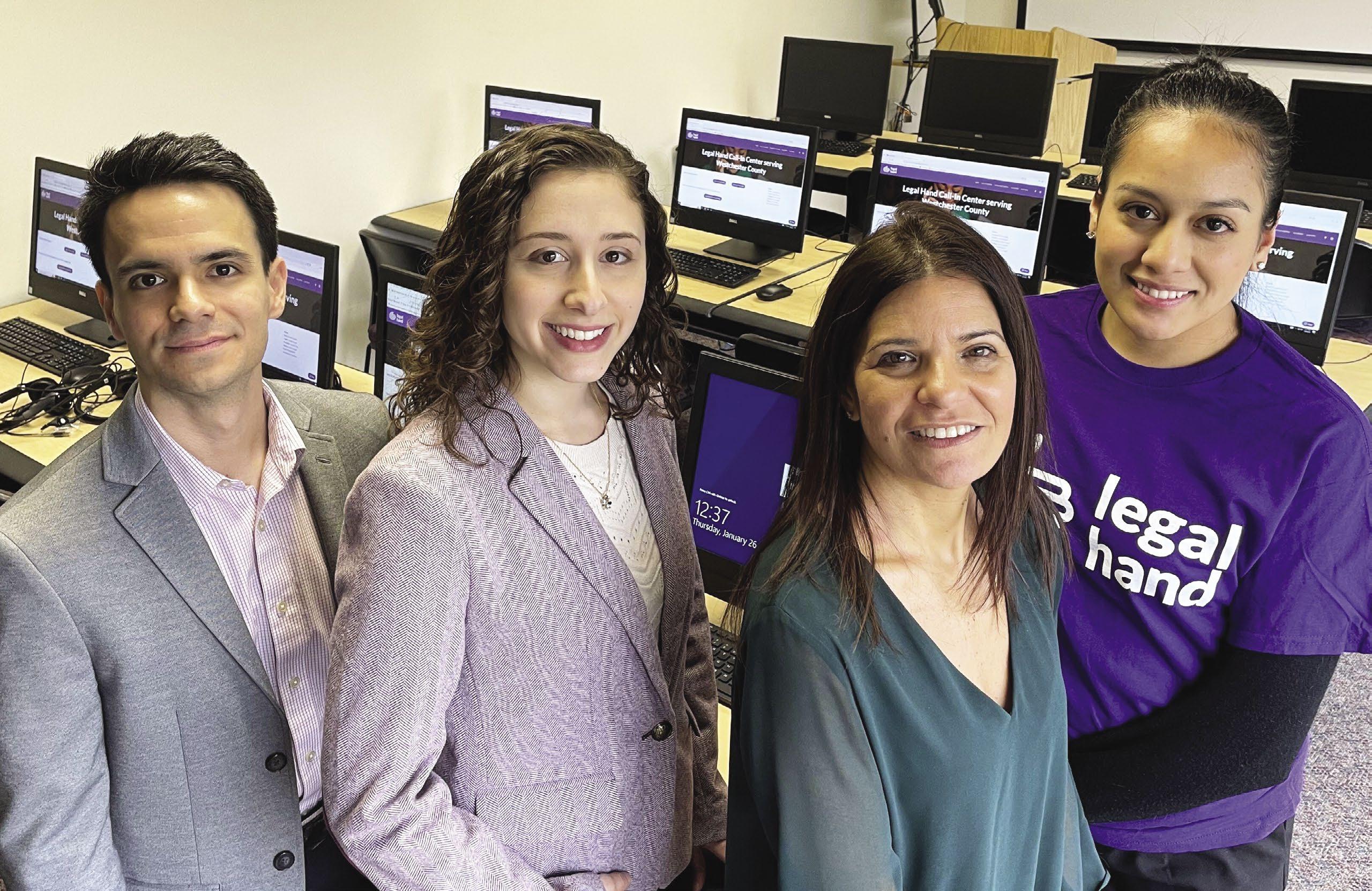
26 HAUB LAW ALUMNI MAGAZINE
Legal Hand Center Manager Diego Gomez ’22, Legal Hand Center Attorney Stephanie Costa, Director of the Public Interest Law Center and Adjunct Professor Elyse Diamond, and Haub Law Student Jazmine Merino ’24
At the Legal Hand Call-In Center serving Westchester County, trained Volunteers, consisting of Haub Law students and community volunteers, assist virtual ‘Visitors’ who live in Westchester by providing resources and information on wide-ranging issues in areas including housing, immigration, public benefits, domestic violence and other family issues, elder law, and estate law, to name just a few. The service provided is free to Visitors, there are no financial or immigration eligibility requirements to receive help, and no appointments are necessary. The Legal Hand Call-In Center is an all-virtual resource center for community members, with office space on the third floor of Aloysia Hall at the Law School.
Law student and community Volunteers must complete a significant formal training process before participating. Law students handle shifts during the Center’s hours either as Volunteers or through a guided externship for credit, and members of the broader community are asked to commit to serving a minimum of 3 hours per week for 6 months. Currently, the virtual Legal Hand Call-In Center serving Westchester is open to Visitor outreach several hours during the work week, as well as one evening and on Saturday mornings.
The virtual help is also language accessible with a language line available for callers who require interpretation, and the Center’s manager, Diego Gomez ’22, is also fluent in Spanish and French. In the first two months of Center operation, more than 200 Visitors were assisted, about 20% of whom identified Spanish as their native or preferred language.
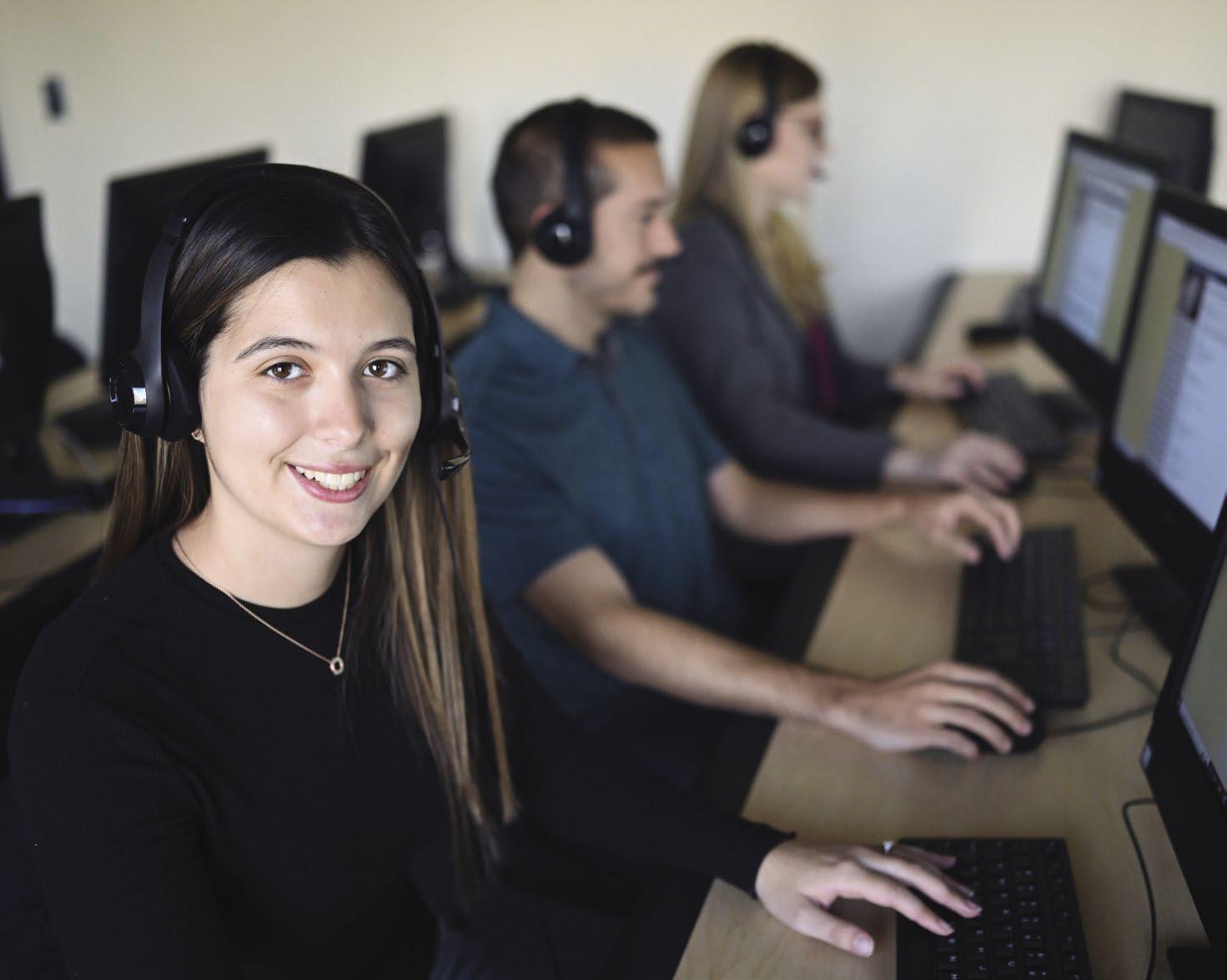
The Legal Hand Call-In Center is part of the Law School’s broader Access to Justice Project, which incorporates curricular, experiential, research, and policy advocacy components, all designed to increase student, faculty and staff engagement in pro bono and community work, and to support the local community in addressing justice gaps.
“Through our partnership with Legal Hand, the Elisabeth Haub School of Law will serve an important role as
a resource for the community, while providing our students with an invaluable opportunity to understand and address access to justice issues,” said Horace E. Anderson, Dean of the Elisabeth Haub School of Law. “The Center’s goals are to empower both Volunteers and Visitors to understand and navigate issues and self-help resources, and to help Visitors resolve issues before they turn into legal actions.”
“When we launched our Access to Justice initiative, we did so with the long-held belief that ensuring greater access to justice and legal representation for all community members is central to our mission to educate and train new lawyers,” said Dean Anderson. “This partnership once again demonstrates our commitment to working to advance racial
SUMMER 2023 27
ON THE COVER
“ IN ANSWERING CALLS AND SPEAKING TO MEMBERS OF THE COMMUNITY, I GET TO PUT INTO PRACTICE ALL THAT I LEARNED THROUGHOUT MY YEARS IN LAW SCHOOL.”
LEGAL HAND CENTER MANAGER DIEGO GOMEZ ’22
ON THE COVER
and social justice within Westchester County and beyond.”
Elyse Diamond, Director of the Public Interest Law Center and Access to Justice Project, helped to facilitate the Center launch with Dean Anderson and, in her role as an Adjunct Professor, teaches the guided externship for law students who work with the Center for credit during the academic year.
Professor Diamond noted that, through their Center work and externship, participating law students learn how legal issues affect peoples’ dayto-day lives and are often interwoven with other social service needs. She added that law student participants gain experience spotting and dissecting wide-ranging issues and communicating applicable information and resources clearly and with cultural sensitivity.
“I was very hopeful that in opening the Center, we could better identify, understand, and help to fill gaps in access to legal information and resources in our County, but it has been deeply gratifying to see, too, the broad practical skills and perspective our law student participants are gaining by meeting other community members where they are in real time,” Professor Diamond said.
“This is an excellent opportunity for students to hear about the issues facing our community members directly and gain important life experience and legal skills that will help them in whatever professional positions they pursue,” she said.
Very Valuable Experience
Sabrina Bellantoni, a 3L law student extern who graduated in May 2023, said she found working in the Center a very valuable experience.
“I grew up in Valhalla, a hamlet of Westchester County, and I am glad to give back to the community and also to better understand the many legal situations impacting the lives of people every day,” Sabrina said. “Most people have no idea where to start or how to get the help that they need and deserve -- that’s why Legal Hand is so important to Westchester County,” she said.
“Between helping Visitors in my community, learning about new legal issues, and strengthening my interpersonal and lawyering skills, I am very grateful that I decided to participate in Legal Hand, and I encourage other Haub Law students to do the same.”
Jazmine Merino, a second-year law student extern, said that her time at the Center has been a useful and “humbling” experience.

“I have had the opportunity to meet and help community members who are facing a whole variety of legal issues,” she said. “This experience has exposed me to the unfortunate justice gaps in our community and it has been gratifying to help narrow those gaps by providing resources and information to meet the needs of our neighbors.”
Recent graduate Christine Isaac, who will be starting her career as a prosecutor in the fall, said: “being a Volunteer extern at Legal Hand has exposed me to various legal issues, such as landlord/tenant, immigration, consumer law, and animal rights. Not only is it helping me become a more well-rounded law student, but it is also incredibly rewarding to talk to members of the Westchester County community and assist them with their legal issues.”
Raquel Coppola, a 2L law student extern, found the experience of working with real people with real problems satisfying as well as educational.
“While learning about a variety of different legal topics, I have been able to serve the members of our community. After each call we ask our callers how this call has impacted them; hearing callers express their gratitude
28 HAUB LAW ALUMNI MAGAZINE
for our help and telling us we have helped them with their issues demonstrates the true importance of this program,” Raquel said.
“As law students,” she continued, “we are not given many opportunities to learn while dealing with clients. However, this position allows us students to speak directly with callers who are looking for legal information and resources. By helping our callers, we are also learning about different topics by conducting a great amount of research. If any students are considering volunteering with Legal Hand, I cannot recommend it enough!”
Rigorous Training and Supervision
Legal Hand Center Attorney Stephanie Costa trains and supervises the Volunteers at the Center. She supervises every live interaction between Visitors and law students or community Volunteers, and she guides Volunteers in spotting issues, doing legal research, and responding with appropriate assistance without veering into offering legal advice.
“It’s been wonderful to meet members of the Westchester community where they are and provide resources and legal information that is so desperately needed,” said Stephanie, who prior to joining Haub Law litigated cases involving tenants’ rights and fair housing issues on behalf of individual New Yorkers and tenant associations at Legal Services-NYC.
“It’s also been extremely gratifying to see the growth in the law student Volunteers in such a short amount of time. They went from getting a crash course on a wide variety of civil legal issues, to shadowing calls, to developing their own interview and active-listening skills, to taking a call from beginning to end in a manner of months. They’ve become comfortable with issue spotting, practicing empathy, doing legal
ON THE COVER
research, and providing information in a clear and concise manner for community members that need it most,” she said.
As Center Manager, Diego Gomez assists in the Center’s training and administration. He helps Stephanie cover Visitor calls, and is responsible for coordinating outreach, scheduling Volunteer trainings, and handling other administration and reporting.

“In answering calls and speaking to members of the community, I get to put into practice all that I learned throughout my years in law school,” said the recent Haub Law graduate. “Speaking to members of the community and being able to help them with their issues while learning how theory and real-life issues merge is invaluable for Volunteers who are soon to be graduating.”
Fighting Eviction
Housing is one of the most common issues that Volunteers help Visitors grapple with. One recent Visitor facing eviction was not able to find representation from local legal services organizations. Her landlord decided not to renew her tenancy and is seeking to evict her, her partner, and her four minor children. However, before this, two of her children tested positive for lead poisoning severe enough that one toddler had to be evaluated for learning disabilities.
The landlord knew about lead paint in the apartment for years, she said. Even after the Centers for Disease Control and Prevention and other local authorities got involved, she said, the landlord didn’t address the issue until last year, after which he chose to not renew her lease.
A participating law student was able to provide legal information and resources, including a pro se answer to fill out and file with the court, and resources outlining how to litigate her case without a lawyer. The student explained the process and how to fill out the court forms, then let the Visitor know she could contact the Center again if she needed more help navigating the court process.
“Interactions like this one demonstrate that the Center is already proving to be a valuable resource for the Westchester Community,” Dean Anderson said. n
SUMMER 2023 29
“
IT’S BEEN WONDERFUL TO MEET MEMBERS OF THE WESTCHESTER COMMUNITY WHERE THEY ARE AND PROVIDE RESOURCES AND LEGAL INFORMATION THAT IS SO DESPERATELY NEEDED.”
LEGAL HAND CENTER ATTORNEY STEPHANIE COSTA
2023 Robert S. Tucker Prize for Prosecutorial Excellence
Veronica Dragalin, Chief of the Anticorruption Prosecution Office for the Republic of Moldova, was honored by Haub Law with its 2023 Robert S. Tucker Prize for Prosecutorial Excellence at a ceremony in New York City attended by fellow prosecutors and other members of the legal community. Ms. Dragalin, a former Assistant United States Attorney, was recognized for her outstanding contributions to the field of criminal prosecution and excellence in prosecutorial practice and praised for her commitment and courage in leading the fight against corruption in her native country of Moldova.
Green Amendment Book Launch
Haub Law hosted the launch of author and alumna Maya K. van Rossum’s book, The Green Amendment: The People’s Fight for a Clean, Safe, and Healthy Environment, on Pace University’s New York City campus on October 27, 2022. Author Maya K. van Rossum was joined by her former Haub Law professor, Nicholas A. Robinson, a renowned scholar and pioneer in the field of environmental law, who led an insightful and engaging discussion focusing on the roadmap van Rossum outlines in her book for a healthier world. The event was attended by influential environmental law experts and eco-advocates.
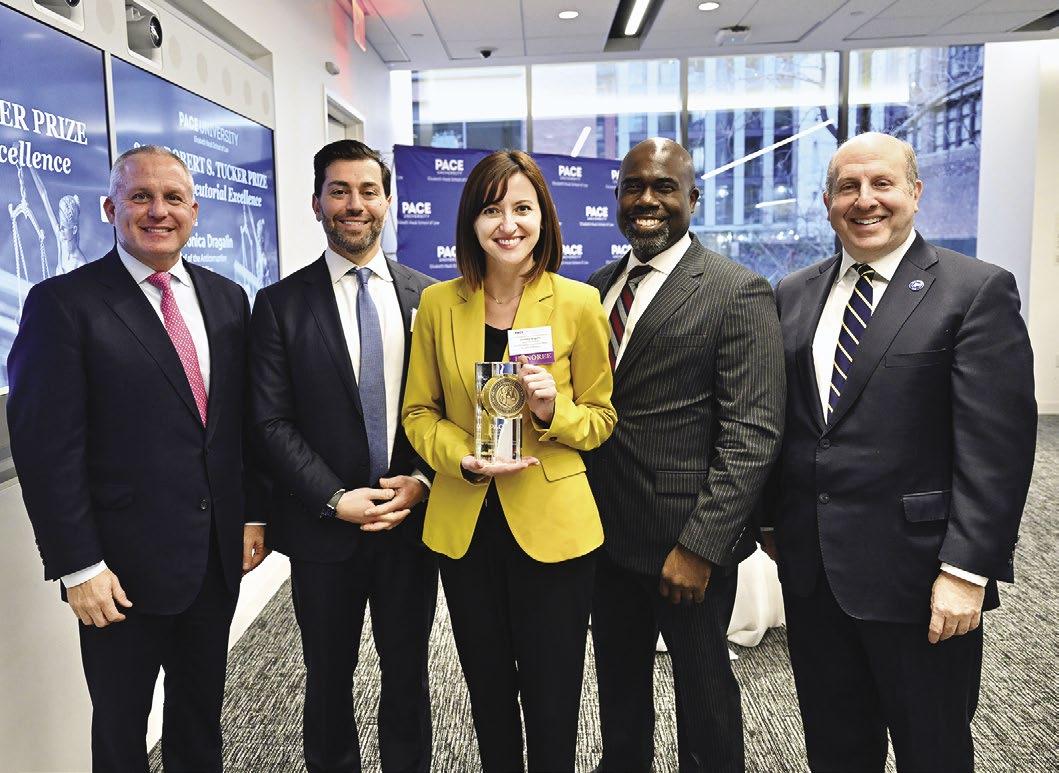
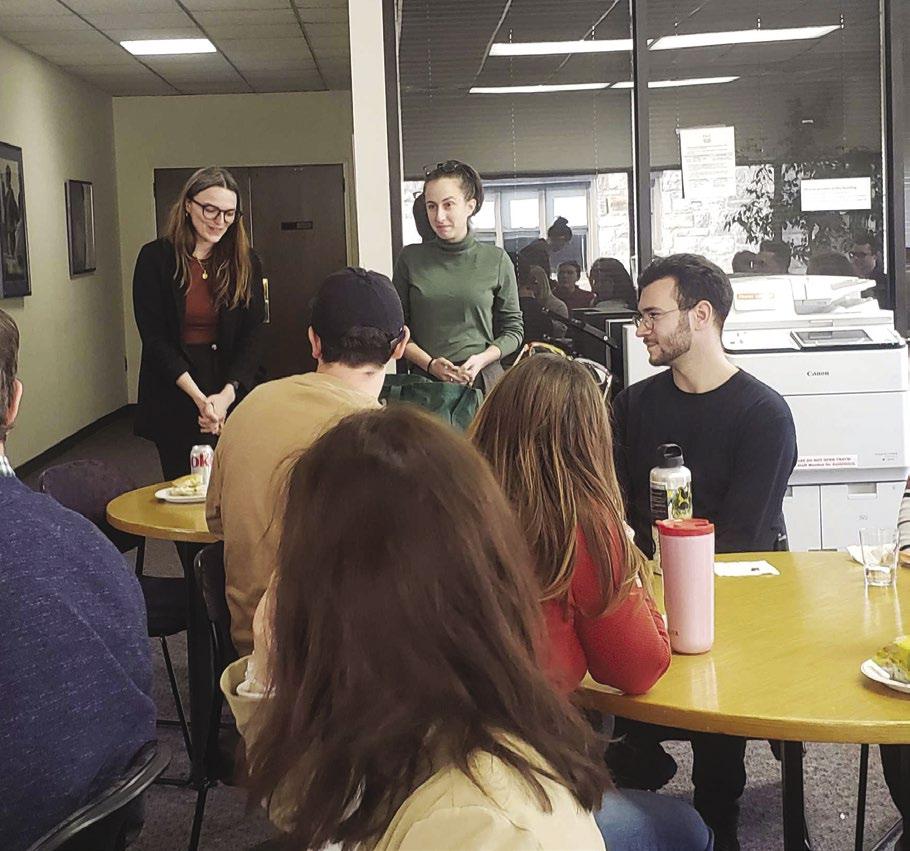

PELR hosts annual Environmental Law Symposium
The Pace Environmental Law Review (PELR) held its annual symposium titled “Environmental Constitutionalism” on October 28, 2022. Hosted by the Elisabeth Haub School of Law at Pace University, the virtual symposium attracted over 100 attendees, bringing together scholars, advocates, regulators, policymakers, and students worldwide to discuss constitutional environmental rights.
30 HAUB LAW ALUMNI MAGAZINE IN AND AROUND
Pace International Law Review Presents Triennial Symposium

On April 14, 2023, Haub Law presented its triennial Pace International Law Review Symposium: 21st Century Conflict: International Law and the War in Ukraine The Pace International Law Review (PILR) Symposium was a full-day event organized by the PILR board with the support of PILR faculty advisors Professor Alexander Greenawalt and Professor Smita Narula. The symposium’s themes were explored through three panels featuring experts in international law and related fields. The panels focused respectively on regulating war, on prosecuting international crimes, and on human rights and the environment. Each panel was moderated by an expert on the topic at hand and featured renowned scholars.
Tax Alumni Come (Back) to the Classroom
On March 28, 2023, Professor Bridget Crawford hosted her annual Tax Alumni Come Back to the Classroom event and welcomed back to Haub Law Bianca De Leon ’21, Logan O’Reilly ’17, Mitchell Quatinetz ’22, and Jared Malman ’06
After a formal Q&A program with students enrolled in Federal Income Taxation, students and alumni had time for informal conversations about careers in tax and how students can connect to alums.
Third Annual Environmental Law & Policy Hack Competition
Haub Law is proud to announce that for the second year in a row, a team of students from University of Miami School of Law won the third annual Elisabeth Haub School of Law Environmental Law & Policy Hack Competition. The Competition, developed by Haub Law and launched in 2020, is an environmental law and policy problem-solving event that invites students to propose an innovative and practical response to a current environmental challenge and awards seed funding to support implementation of the winning concept. This year, the teams were invited to propose an innovative private environmental governance intervention with the potential to spur meaningful on-the-ground environmental progress.


SUMMER 2023 31 IN AND AROUND
ANNUAL LAW LEADERSHIP DINNER
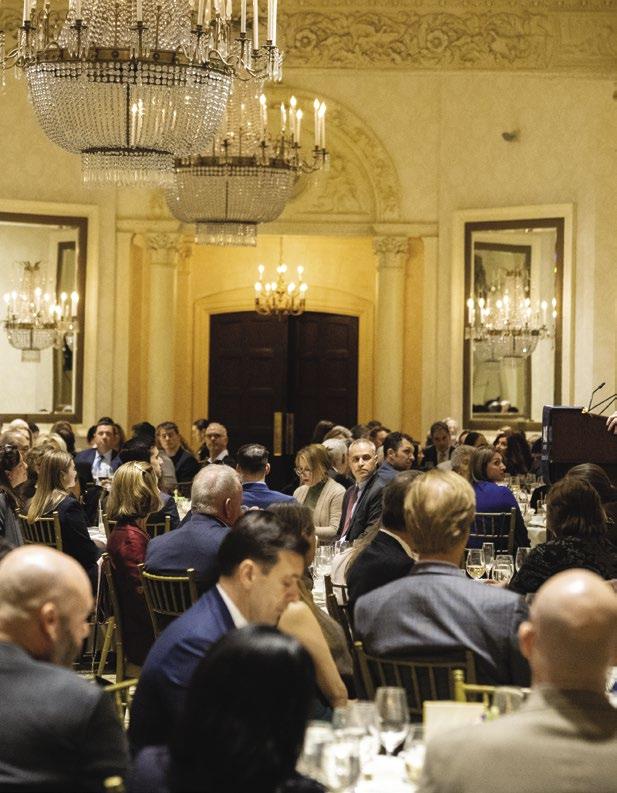
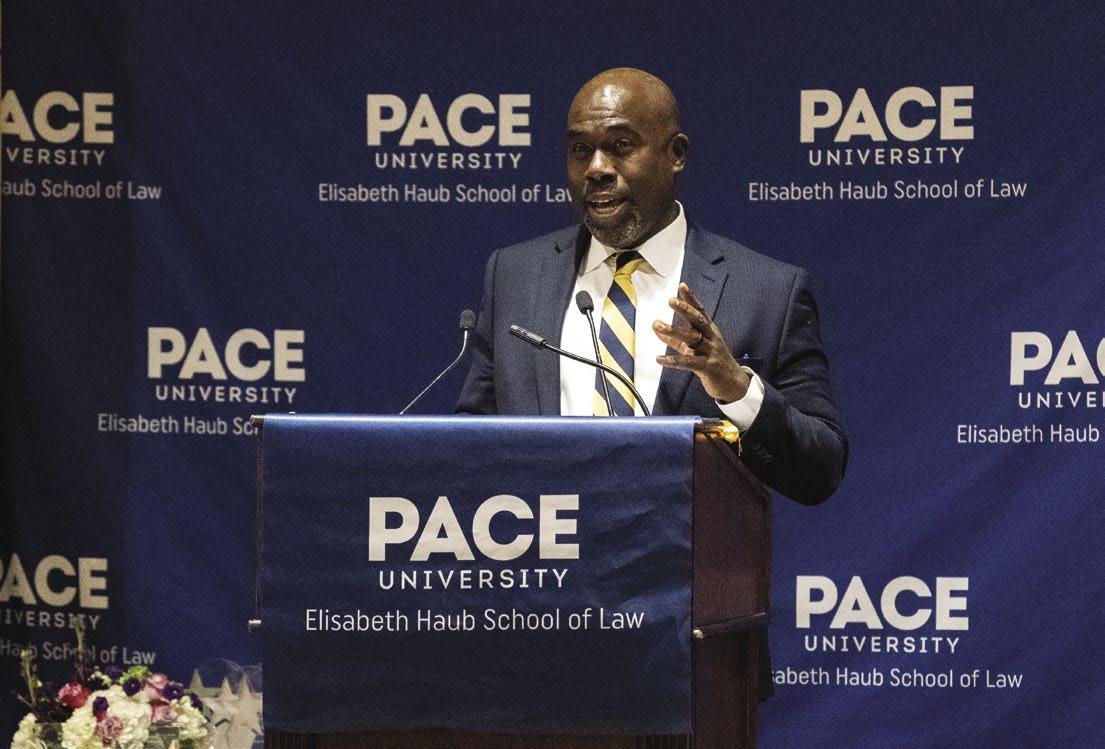
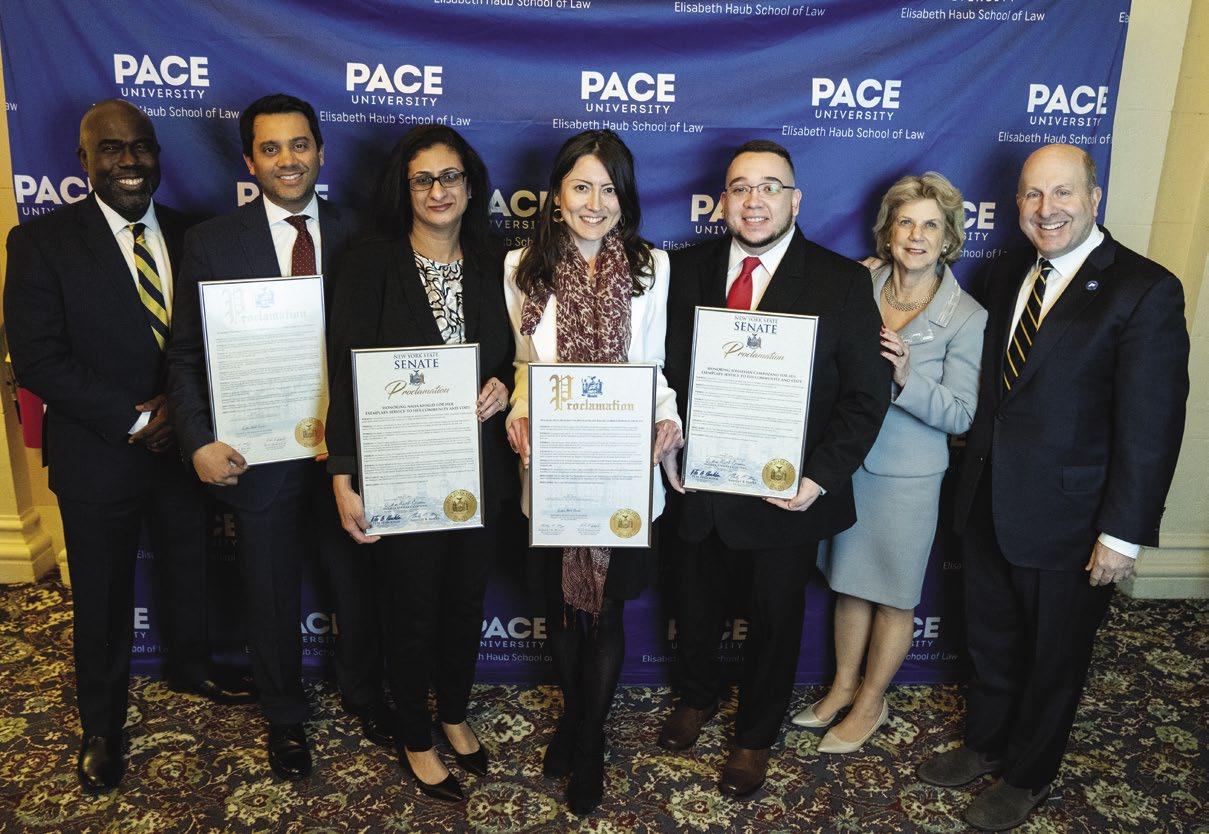
Haub Law honored three distinguished leaders of the legal community, as well as outstanding alumni, during its 28th Annual Law Leadership Dinner, held at the Westchester Country Club on March 7, 2023. The celebration was one of the Law School’s most successful fundraisers in history, raising vital funds in support of student scholarships, faculty research, and innovative programs.

The Law Leadership Dinner, first held in 1995, is the signature fundraiser for Haub Law and provides the setting for the presentation of the Distinguished Service Award, which honors individuals or organizations that have made outstanding contributions to the legal community, as well as the Rising Star Award, recognizing excellence in practice among alumni in the first 15 years after graduation. This year also marks the second year that Haub Law has awarded the Haub Impact Award to honor an individual who has made a lasting impact on the Haub Law community.
The 2023 Distinguished Service Award was presented to Susan S. Brown JD ’87, Co-Founder, Of Counsel, Glassman & Brown, LLP, and to Anna Marciano Romanella JD ’00 VP, Sustainability Zone North America Nestle, General Counsel & Head of Sustainability Nespresso USA. The Haub Impact Award was presented John T. O’Connor JD ’86, Partner, Hunton Andrews Kurth LLP. The Dinner was co-chaired by last year’s Distinguished Service Award Recipient, Mayo Bartlett ’92 and the inaugural Haub Impact Award recipient John C. Lettera ’99. Additionally, the Rising Star Award was presented to: Jonathan Campozano ’17, Staff Attorney, Neighbors Link Community Law Practice; Hana Heineken ’10, Attorney, ClientEarth; Najia Khalid ’09, Partner, Wiggin and Dana LLP; and Shamik N. Trivedi ’08, Special Counsel, Internal Revenue Service’s Office of Chief Counsel.
32 HAUB LAW ALUMNI MAGAZINE
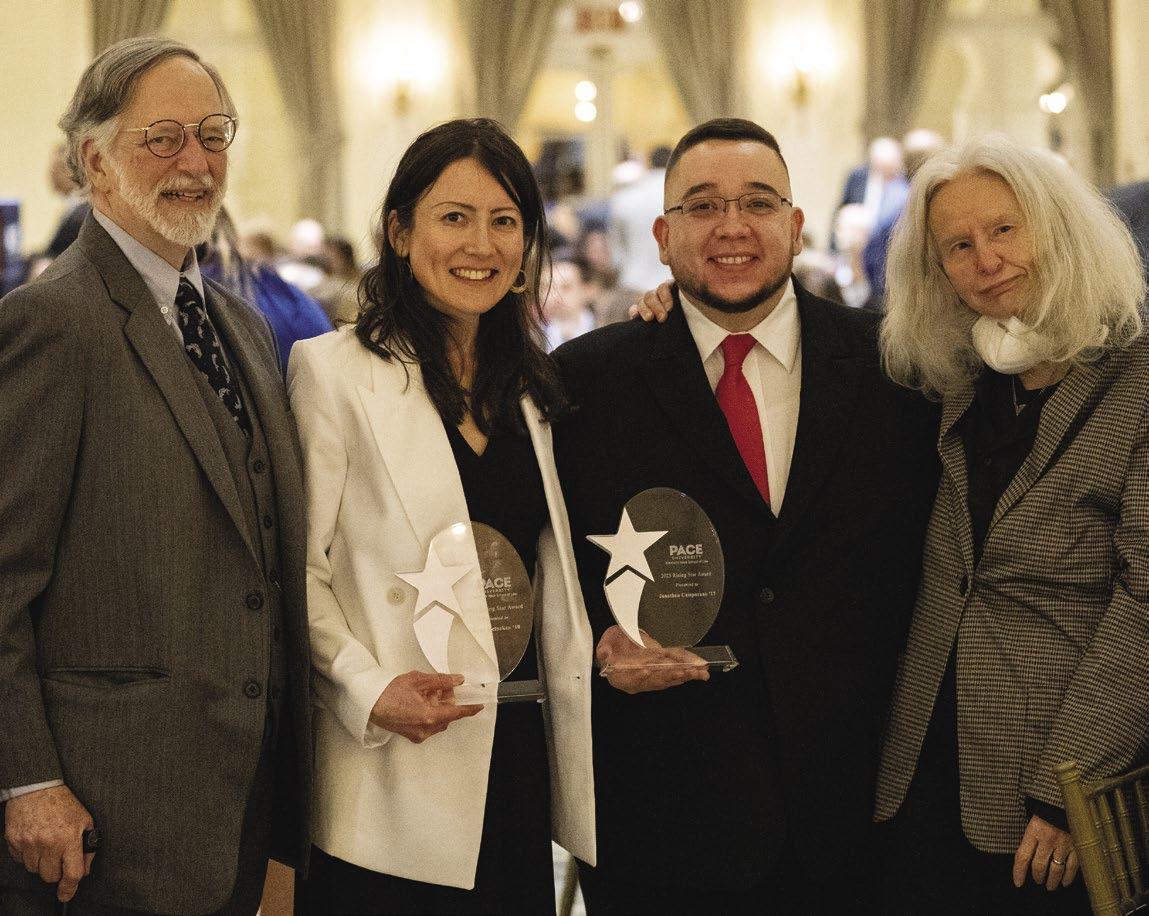


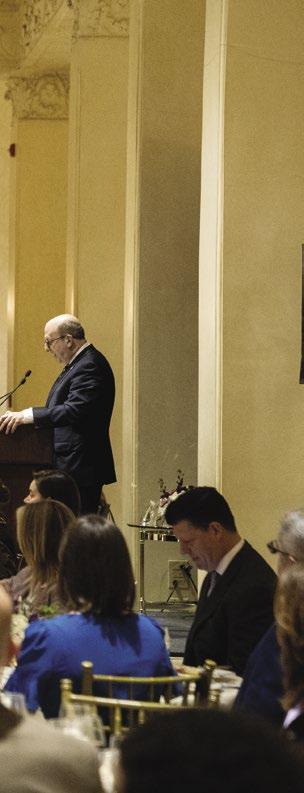
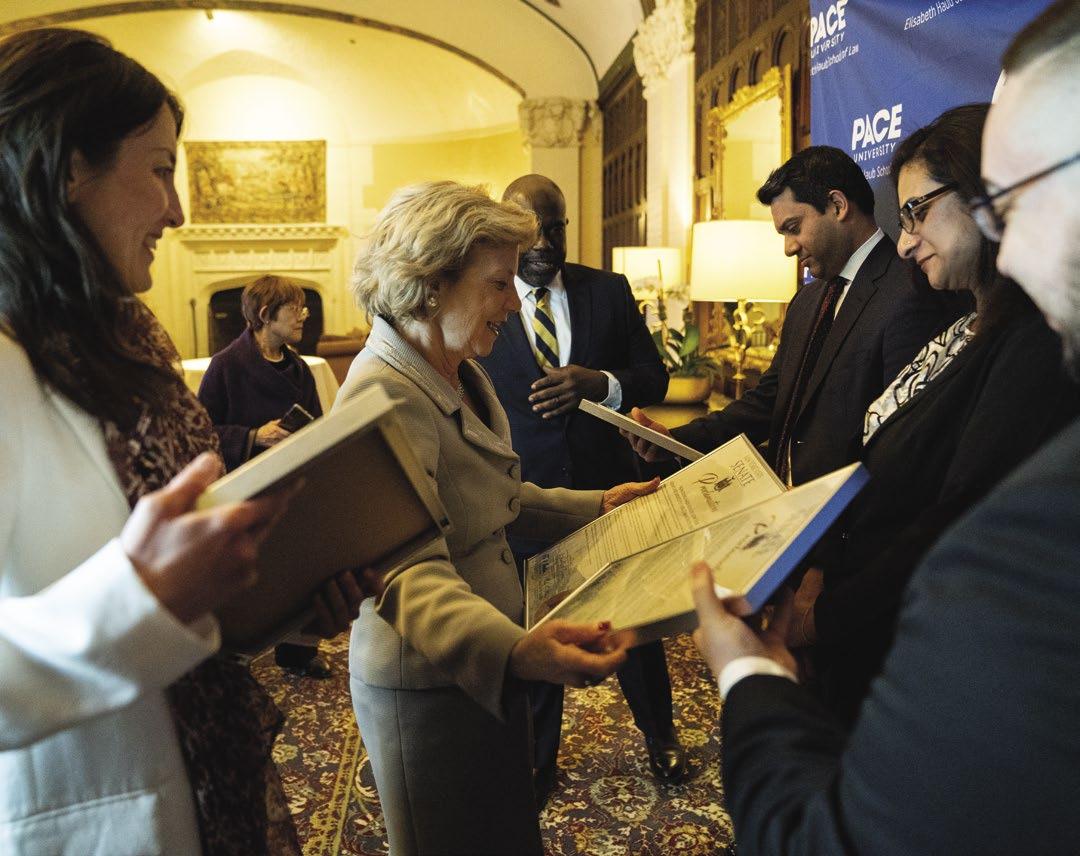
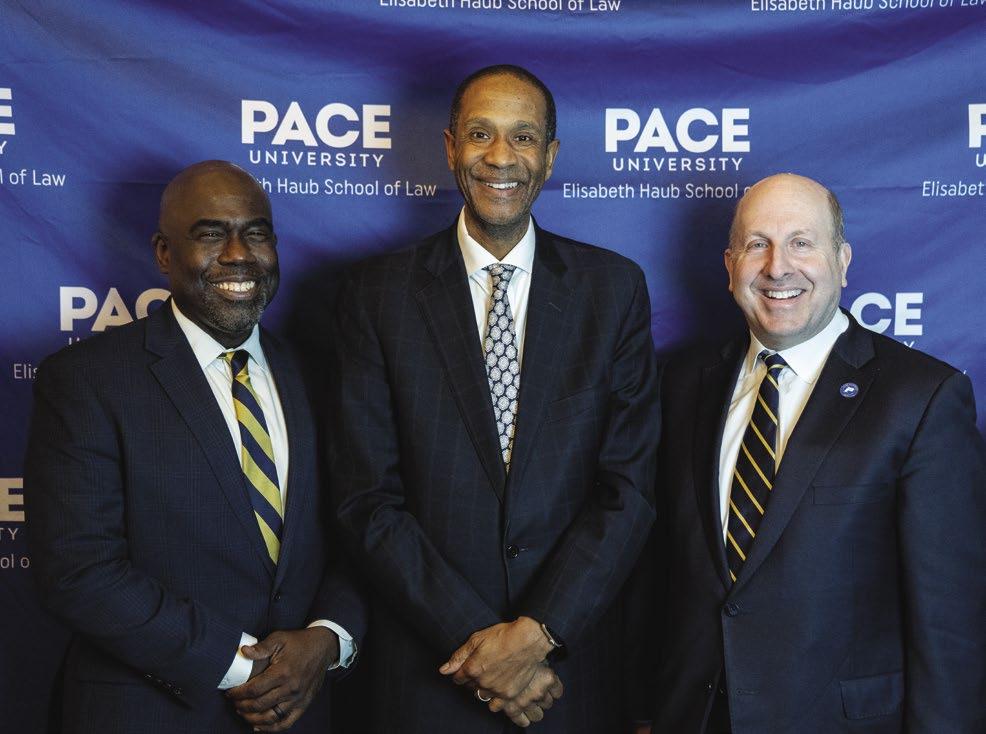

SUMMER 2023 33 IN AND AROUND
HAUB LAW HOSTS DISTINGUISHED ANNUAL LECTURES

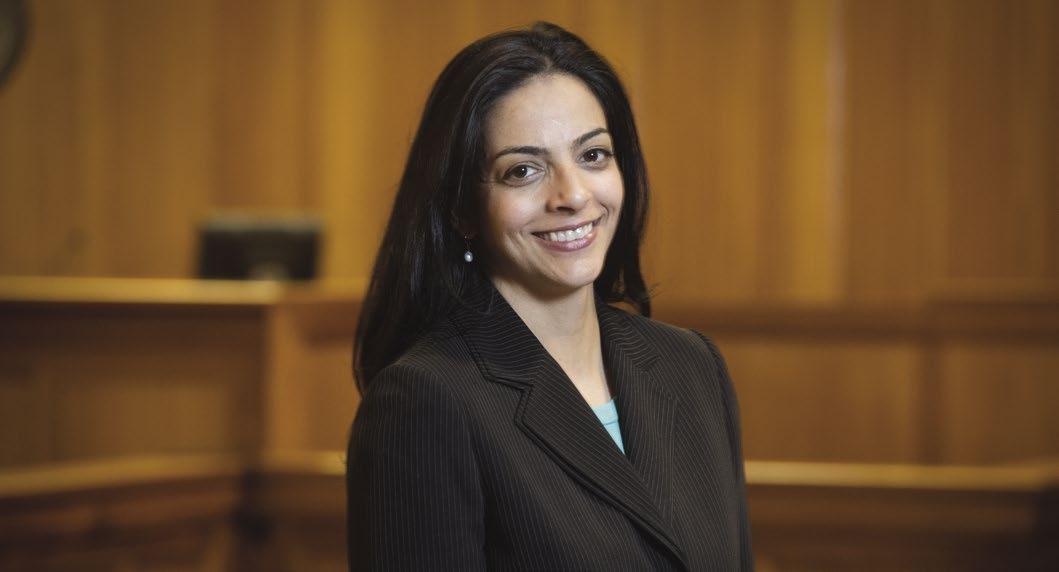
James D. Hopkins Professor of Law Memorial Lecture
Professor Noa Ben-Asher delivered the James D. Hopkins Professor of Law Memorial Lecture on October 26, 2022, on “Gender Identity, the New Legal Sex.” Dean Horace Anderson appointed Professor Ben-Asher as the James D. Hopkins Professor of Law for the 2021-2023 term. During the holder’s term, the James D. Hopkins Professor delivers a lecture that is open to the entire law school community and members of the public.
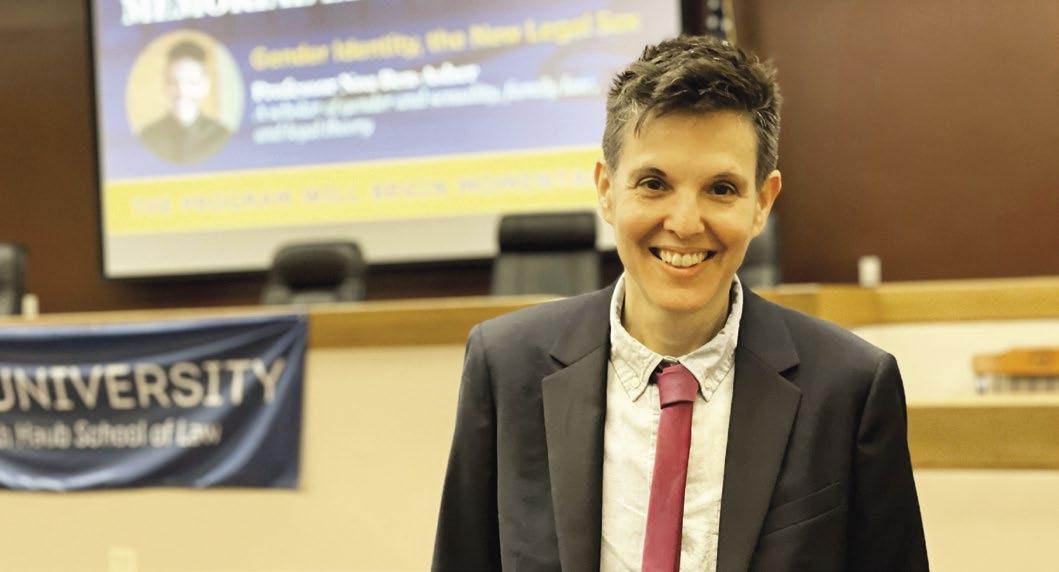
Lloyd K. Garrison Lecture on Environmental Law
Professor Sharmila L. Murthy delivered the Annual Lloyd K. Garrison Lecture on Environmental Law on September 15, 2022, on “Advancing Environmental Justice.” The Lloyd K. Garrison Lecture on Environmental Law was established in memory of Lloyd K. Garrison in 1995. Professor Sharmila Murthy is Senior Counsel, White House Council on Environmental Quality Professor and Director of Faculty Scholarship and Research at Suffolk University School of Law.
Gilbert and Sarah Kerlin Lecture on Environmental Law
On April 18, 2023, Jeffrey Prieto delivered the annual Gilbert and Sarah Kerlin Lecture on Environmental Law. Mr. Prieto currently serves as the Senate confirmed General Counsel of the Environmental Protection Agency (EPA). His lecture focused on “Addressing the Triple Environmental Challenges of Climate Change, Environmental Injustice, and Pollution: An EPA Perspective.”
Philip B. Blank Memorial Lecture on Attorney Ethics
Professor Andrea Kupfer Schneider, Director of the Kukin Program for Conflict Resolution at Cardozo School of Law, Yeshiva University, delivered the Philip B. Blank Memorial Lecture on Attorney Ethics on March 1, 2023, speaking on “The Conflict in Arbitrator Conflict of Interest Disclosures: Public Judges or Private Neutrals?”
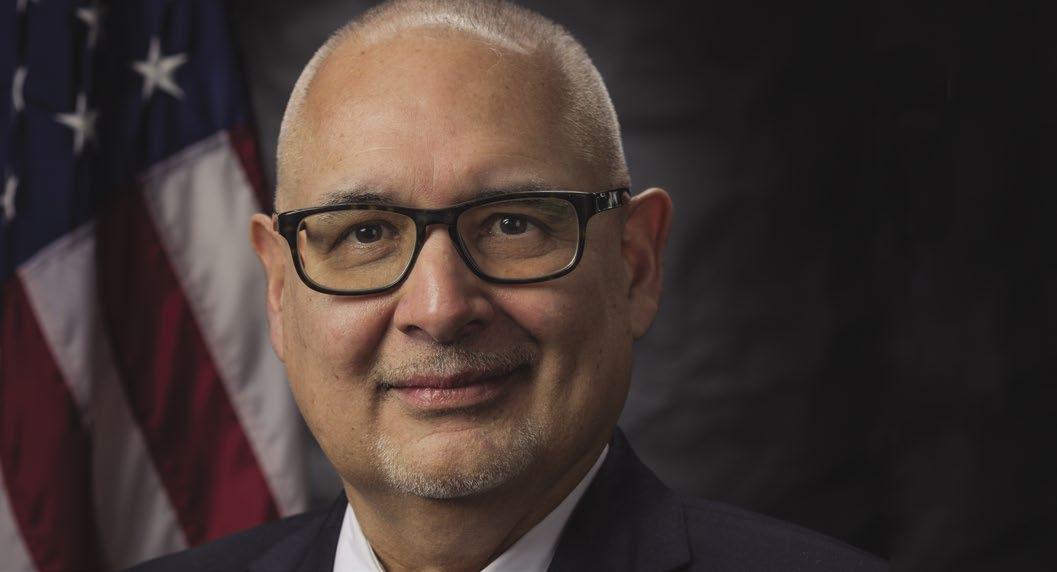
34 HAUB LAW ALUMNI MAGAZINE IN AND AROUND
Blaine Sloan Lecture on International Law
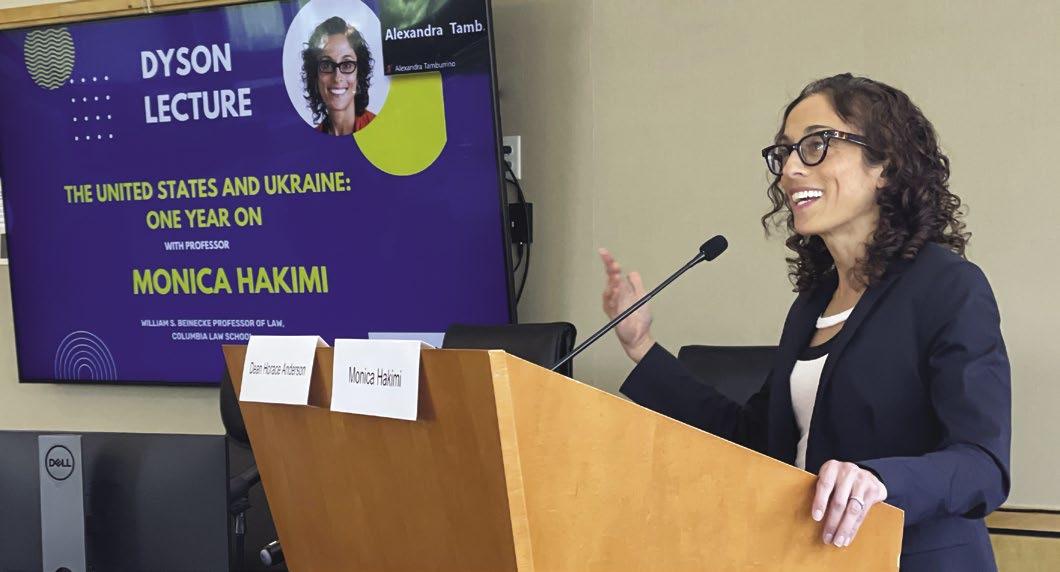

COMMUNITY EVENTS
On February 21, 2023, Haub Law hosted New York State Governor Kathy Hochul for a press conference live from our very own Tudor Room in Preston Hall.

In January 2023, Haub Law hosted an important community conversation with Senator Chuck Schumer, facilitated by Haub Law Dean Horace Anderson, Michael Romita of The Westchester County Association, and Jan Fisher of Nonprofit Westchester. The dynamic conversation and interactive forum touched on clean energy, affordable housing, economic development, and more.

Dyson Distinguished Lecture
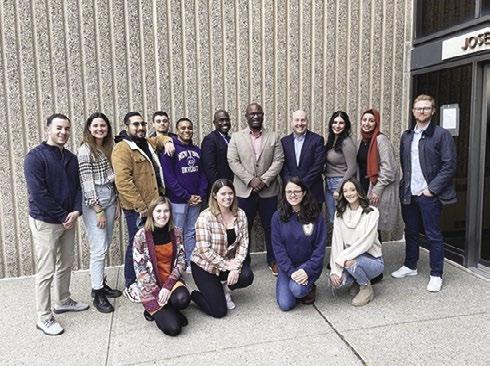
In early October 2022, Haub Law held a panel on Supreme Court of the United States decision overturning Roe v. Wade. The panel featured Professor Leslie Garfield Tenzer, Professor Bridget Crawford, Professor Emily Gold Waldman, Mashayla Hays (The Lawyering Project), and Kulsoom Ijaz (Center for Reproductive Rights). They were joined by Pace University President Marvin Krislov, Haub Law Dean Horace Anderson, and Congressman Jamaal Bowman (NY-16).
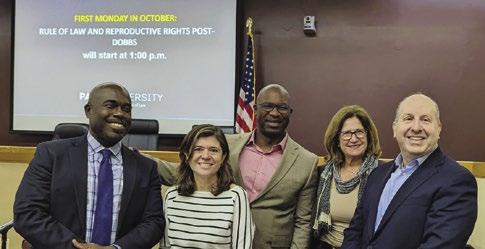
SUMMER 2023 35
Jorge Islas López, Consul General of Mexico in New York, delivered the Blaine Sloan Lecture on International Law on February 1, 2023, speaking on “The Consular Duty and the Protection of Human Rights in New York.” Consul General Islas López is also Giovanni Sartori Constitutional Law Professor, National Autonomous University of Mexico.
Professor Monica Hakimi delivered the annual Dyson Lecture on April 14, 2023, speaking on “The United States and Ukraine: One Year On.” Professor Hakimi is the William S. Beinecke Professor of Law at Columbia Law School.
COMMENCEMENT 2023!
U.S. Senator Elisabeth Warren (D-Mass.) delivered Elisabeth Haub School of Law at Pace University’s 45th commencement ceremony address to graduates at the USTA Billie Jean King National Tennis Center in Queens, New York. Together with Harvard Professor Bruce H. Mann, a legal scholar and historian, they both received the Doctor of Laws, honoris causa, the highest honor conferred by the Law School, recognizing their lifelong contributions to public service and the legal profession.
Horace E. Anderson, Jr., Dean of the Elisabeth Haub School of Law at Pace University, presided over the commencement ceremony and was joined by Pace University President Marvin Krislov for opening remarks. Notably, this year, four outstanding students tied at the top of their class, which is unprecedented in the Law School’s history. The students, Sabrina Bellantoni, Francine Michel, Christina Avery, and Kaitlin Campanini shared joint remarks during the ceremony.
Professor Bridget J. Crawford and Adjunct Professor Robin Frankel were selected by the Class of 2023 as recipients of this year’s Barbara C. Salken Outstanding Professor of the Year Award. Additionally, two exceptional members of the Class of 2023 received the prestigious Dean’s Award: Kaitlin Flores, a JD graduate, and Chad Weiss, a part-time JD graduate.
WATCH THE 2023 COMMENCEMENT CEREMONY: law.pace.edu/commencement

36 HAUB LAW ALUMNI MAGAZINE
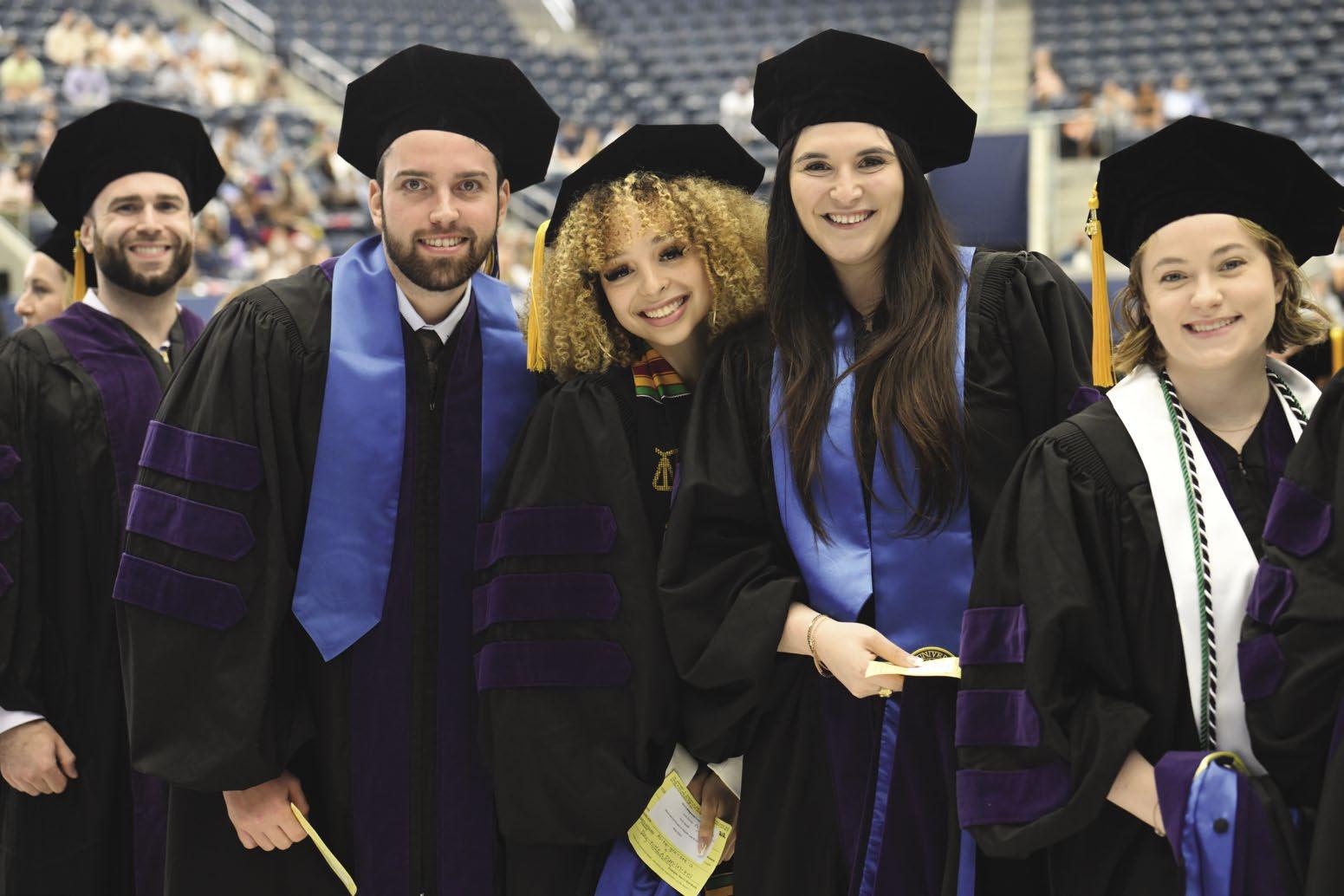


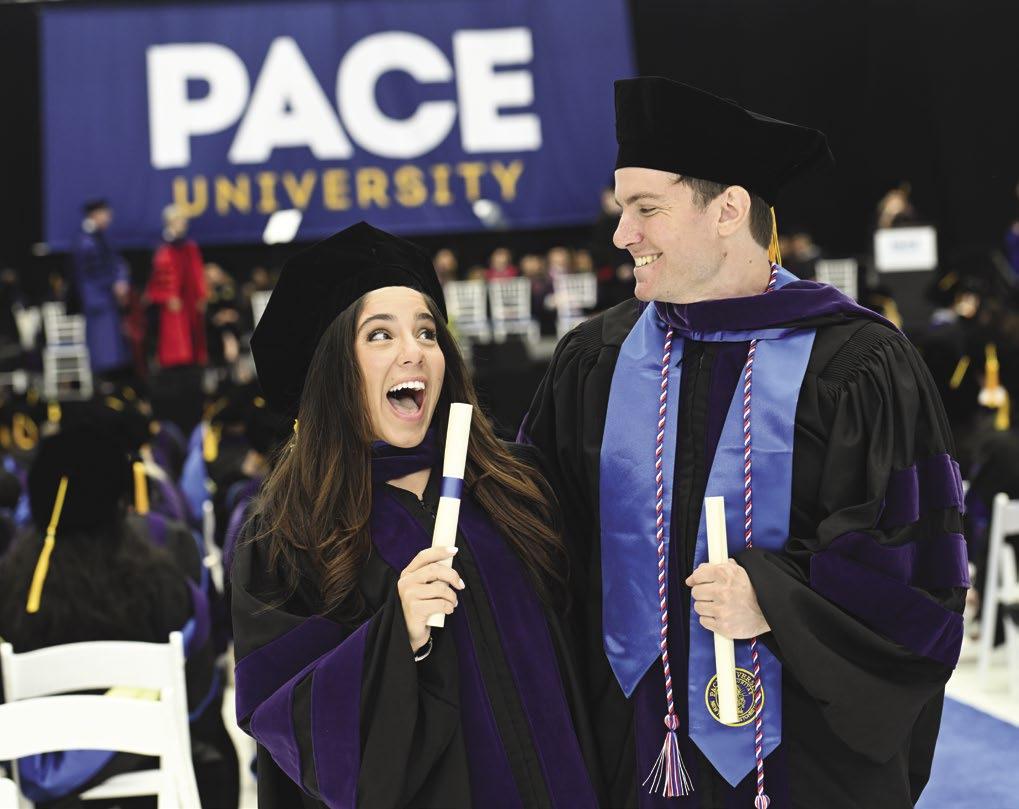

SUMMER 2023 37 IN
AND AROUND
253 Juris Doctor degrees (including 30 part-time graduates, 23 of whom represented the Law School’s first full graduating class of students from its Part-Time Flex JD Program)
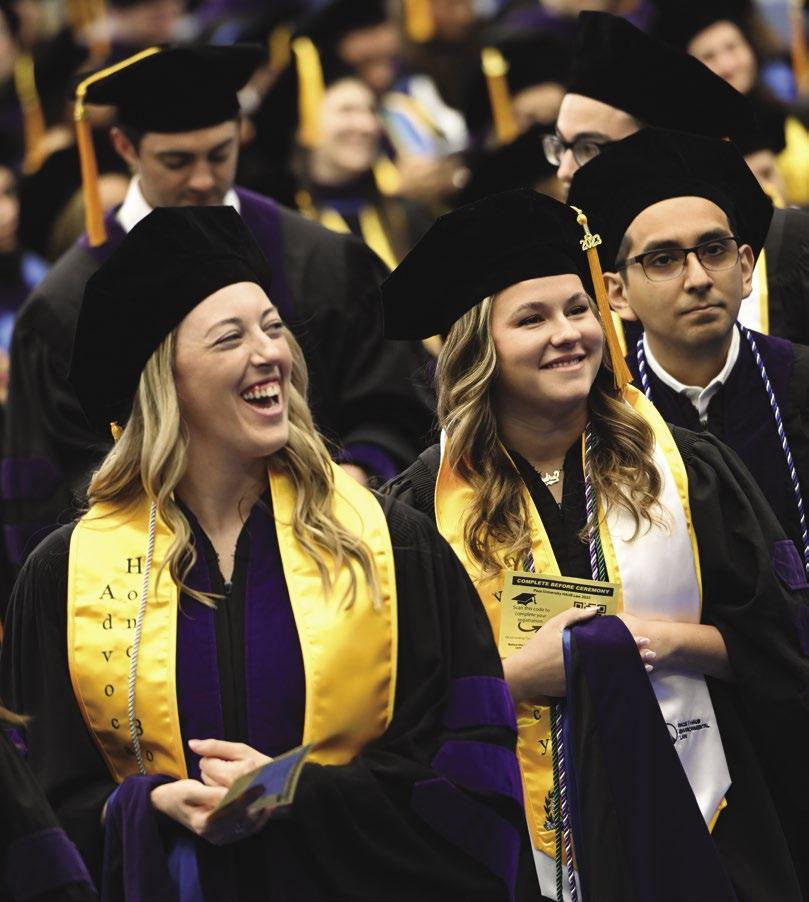
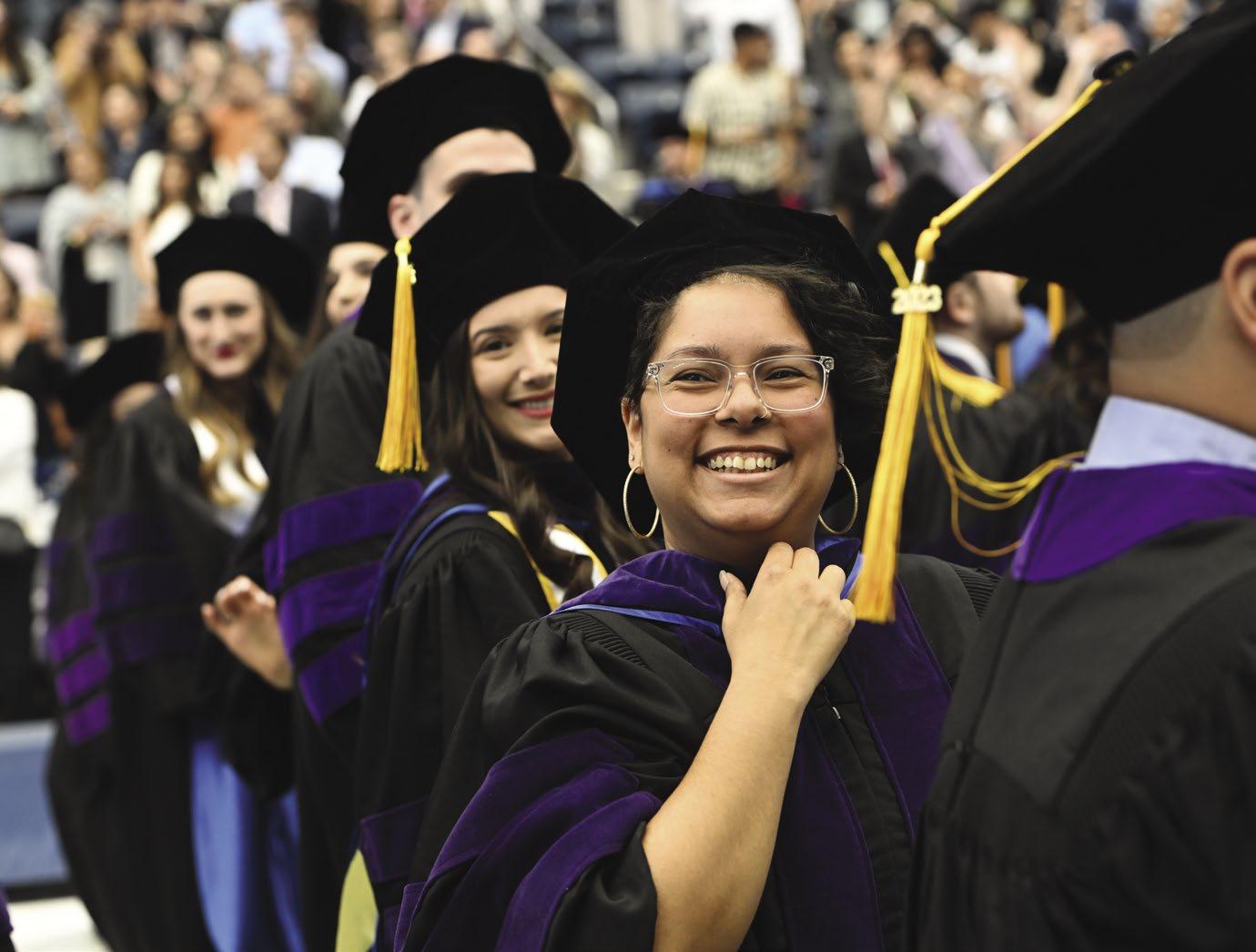
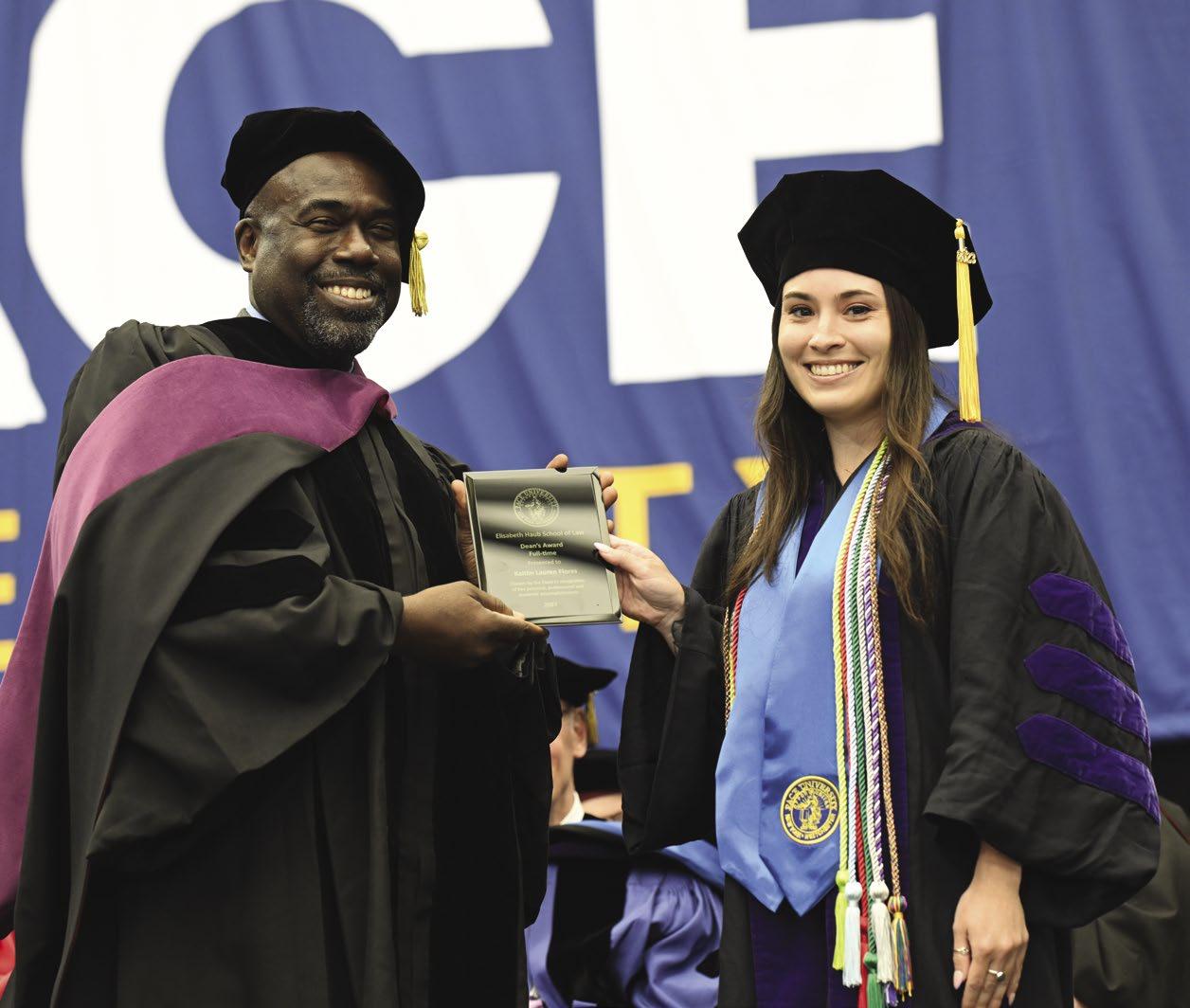
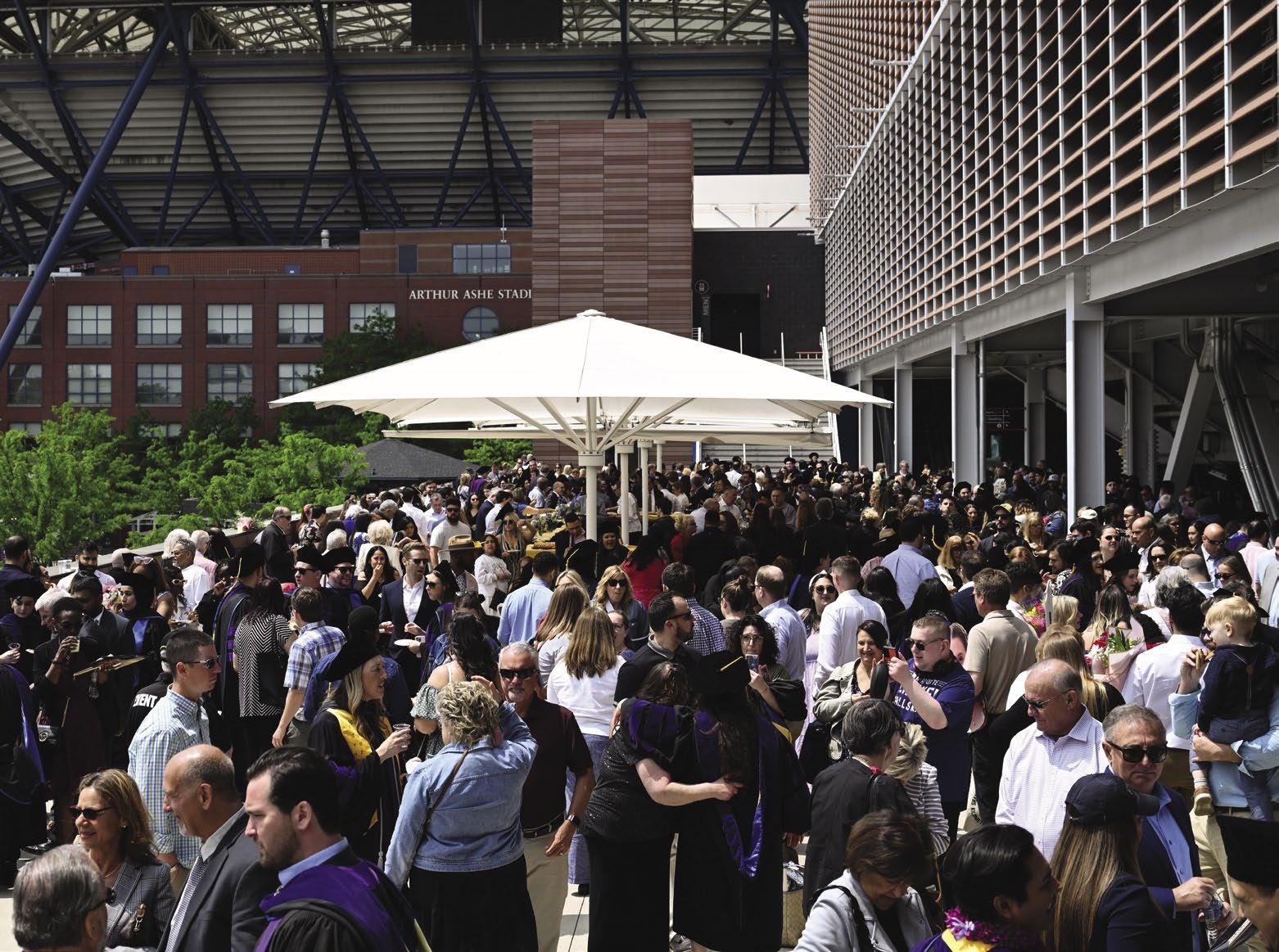
8 Master of Laws degrees in Comparative Legal Studies
12 Master of Laws degrees in Environmental Law
1 Doctor of Juridical Science degree
38 HAUB LAW ALUMNI MAGAZINE IN AND AROUND
OF 2023: QUICK FACTS
CLASS
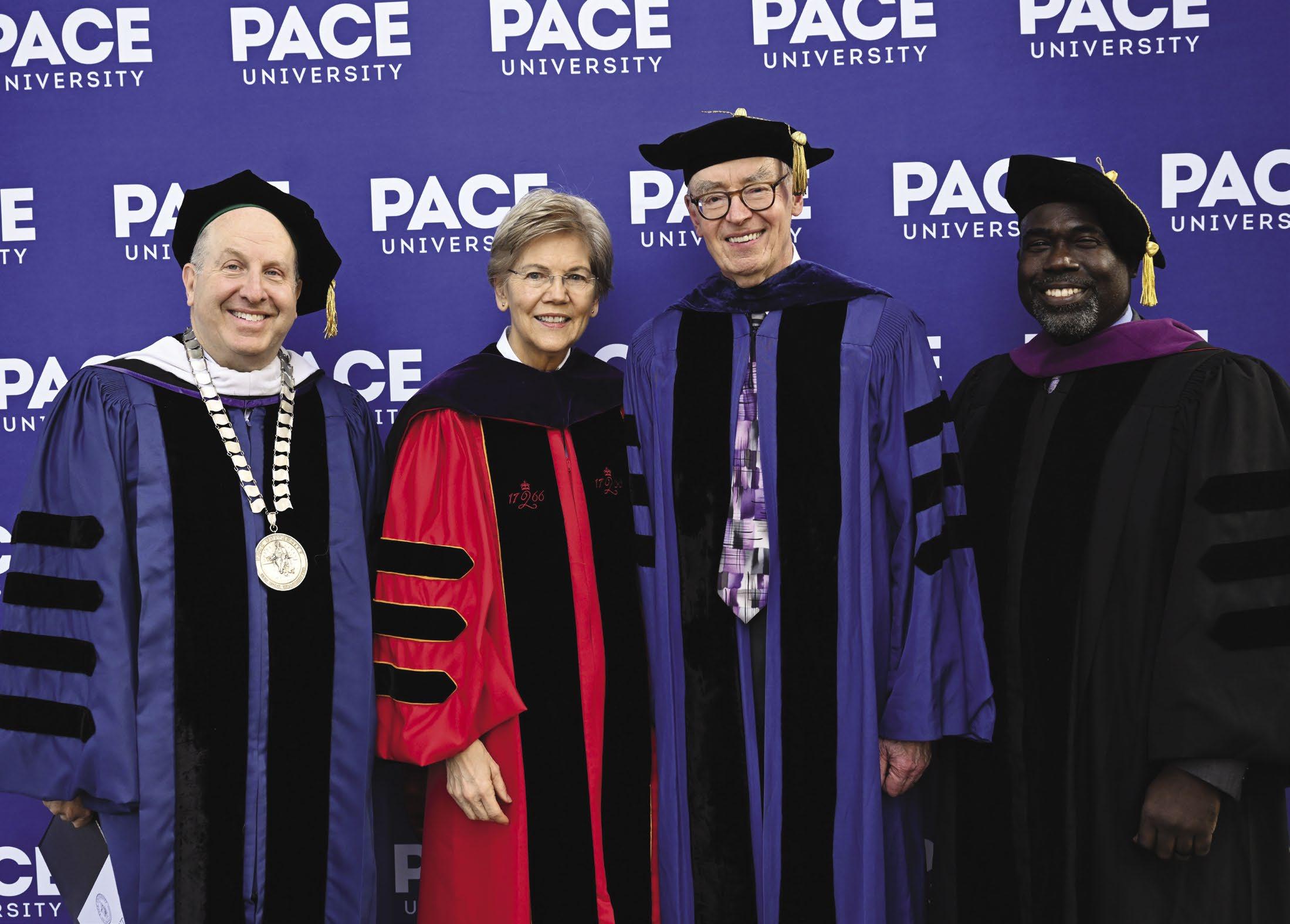



SUMMER 2023 39
Q&A A Q&A with Professor Smita Narula
Born in New Delhi, Professor Smita Narula spent her childhood in South and Southeast Asia before moving to the United States. Inspired by her parents’ work with the U.N., she knew early on that she wanted to engage in human rights work. After law school, Professor Narula accepted a fellowship at Human Rights Watch and remained with the organization for six years, first as an India researcher, and later as Senior Researcher for South Asia. In these capacities, she helped found India’s National Campaign for Dalit Human Rights and the International Dalit Solidarity Network, organizations dedicated to advancing the right to equality for more than 260 million people affected by caste discrimination worldwide.
She began her academic career as a clinical professor at NYU School of Law where she taught the International Human Rights Clinic and served as Faculty Director for the Center for Human Rights and Global Justice. During her time at NYU, she was appointed legal advisor to the U.N. Special Rapporteur on the Right to Food. Prior to joining Haub Law in 2018 as the inaugural Distinguished Haub Chair in International Law, Professor Narula was a Distinguished Lecturer and Interim Director of the Human Rights Program at the Roosevelt House Public Policy Institute at Hunter College.
Your research interests and areas of expertise include international law, environmental law, food systems law, and human rights law –what is it about those areas that hold your interest?
Broadly speaking, I am interested in the capacity of law to deliver justice and enable systems change. International environmental law and international human rights law each embody a profound vision for who we want to be as a society. These visions are lofty, and their implementation is increasingly urgent, but these international treaties exist in frameworks that often lack enforcement capacity and are embedded in a model of development that is fueled by destructive cycles of extraction, production, consumption, and waste. The environmental and human rights implications of these systems are vast, including in the realm of food. I am drawn to food systems law because how we grow food, and how we treat the people and communities that feed us, holds enormous implications for human rights and for environmental health.
My prior scholarship has focused on the issue of social and economic inequality, its causes and consequences, and the ability of international human rights law to challenge structural discrimination and confront current conditions of economic globalization and developmentled displacement. In these articles, I have sought to close gaps in normative and accountability frameworks that undermine effective implementation of human rights guarantees, while simultaneously cautioning that these guarantees cannot be delivered solely through legal platforms or by State actors alone. Rather, these guarantees must be assured through a process of political and social mobilization that in turn compels domestic and global actors to undertake key institutional reforms. I have also developed a considerable body of work on the nexus between law and human rights in South Asia, including the human rights implications of caste systems.
What are some of your current research interests and projects?
My current scholarship explores how social movements are using the narratives and frameworks of food sovereignty and climate justice to address environmental crises, ensure human rights, and inform the trajectory of law from the ground up.
My article “Confronting State Violence: Lessons from India’s Farmer Protests,” was recently published by Columbia Human Rights Law Review. In December 2021, following a year of sustained mass protests, farmers in India forced the repeal of three controversial Farm Laws that attempted to deregulate India’s agricultural sector in service of corporate interests. I argue that these historic protests arose in response not only to the Farm Laws, but also to decades of state-sponsored ecological and economic violence that have relegated millions of Indian farmers to a state of precarity and desperation. I further argue that the protests hold key insights for social movements around the globe, and for the future of food in India and beyond. The article analyzes the farmers’ protests using a four-part paradigm to assess contemporary movements for social change: Roots, Resistance, Reform, and Reconstruction.
My current project seeks to answer the question, “Can a Right to a Healthy Environment Deliver Climate Justice?” Climate justice is a concept used to frame climate change, and its impacts, as an ethical, political, and moral issue, and not just an environmental issue. It does so by relating the effects of climate change to concepts of justice—particularly environmental and social justice—and by recognizing that those who are bearing the brunt of climate change have contributed the least to the climate crisis. The article explores the potential and challenges of using a right to a healthy environment (RTHE), which was recently recognized by the U.N. General Assembly,
40 HAUB LAW ALUMNI MAGAZINE
HAUB DISTINGUISHED PROFESSOR OF INTERNATIONAL LAW
as a tool to remedy climate injustices. I argue that while a standalone RTHE will not cure some of the structural deficiencies of international human rights law—namely the limits to its extraterritorial application and its inability to hold private actors accountable—it can potentially be used as a tool to compel some high-emitting States to mitigate their greenhouse gas emissions and regulate the activities of fossil fuel companies.
Why did you want to become a professor?
Teaching isn’t something I always knew I wanted to do but once I began (first as an adjunct professor at Columbia University more than 20 years ago) I was hooked. I have also long been engaged in research and writing as a means of exploring and advancing human rights law and its protections. The ability to combine these interests, and to be part of a dedicated community of scholars and practitioners, is something that no other profession affords. I also do not take lightly the responsibility of teaching the next generation of lawyers who have in front of them a formidable task given the various crises we face. My aim is to ensure that our students graduate with the confidence, insight, and legal skills needed to take on these challenges and to do so in a manner that is both impactful and personally fulfilling.
What advice do you have for law students who want to gain experience in human rights law?
I first tell them that the path to practicing human rights law is not always straight forward, and in fact can be quite circuitous. There are many professional experiences that can serve as useful stepping stones toward a human rights career, including pro bono work at a law firm or work with the human rights section of a bar association. I also remind students of the importance of getting their papers published. Publications serve an important credentialing function. They signal one’s interests and expertise to potential employers and, as I remind my students, also help strengthen their own voice while shaping key debates in the human rights field.
An interesting and impressive fact that I learned about you is that you speak five languages – French, Hindi, Spanish, Urdu, and English – tell me more about that and how it has impacted you and your career.
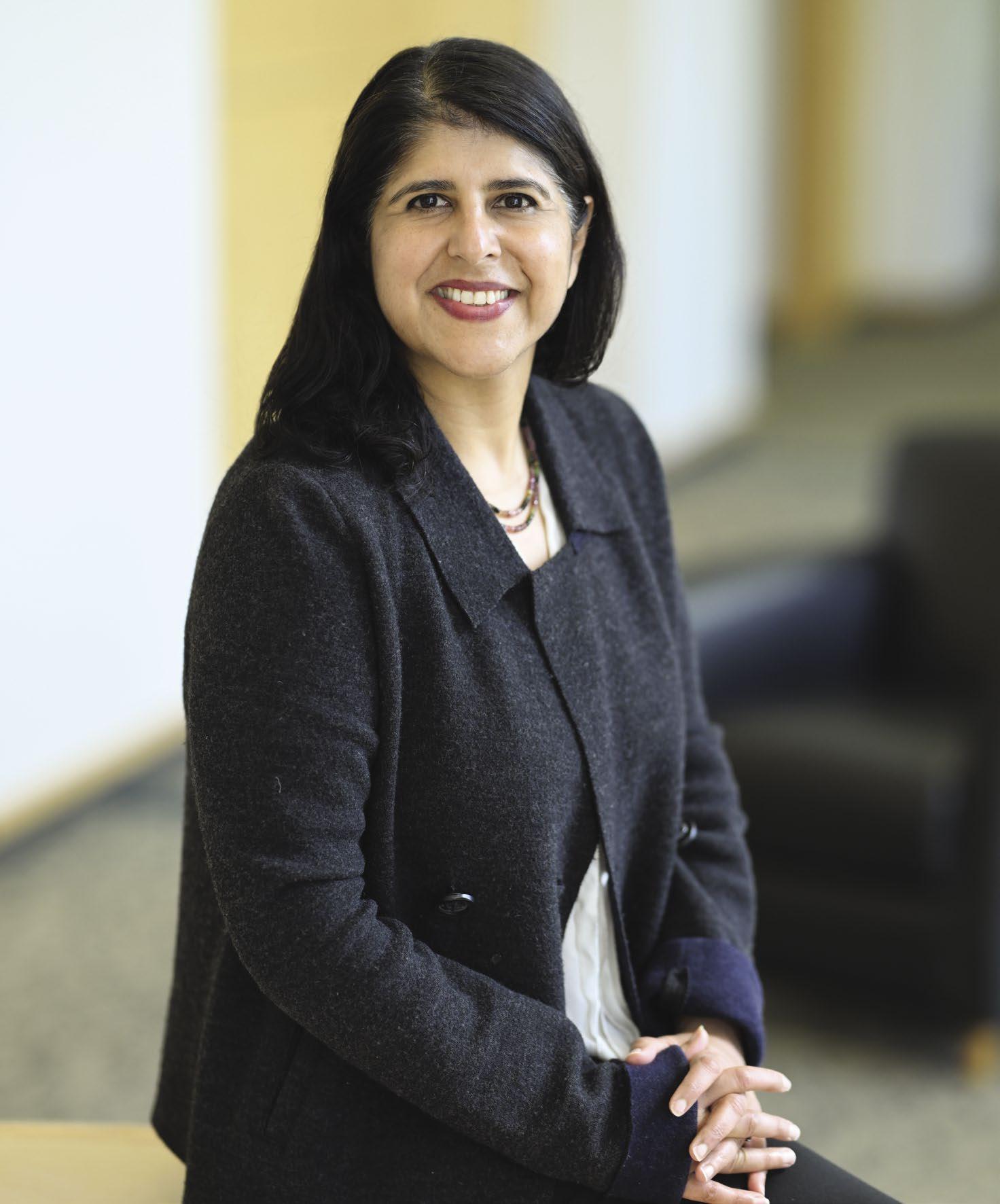
Although English was my first language, I grew up in a Hindi and Urdu speaking household (I also watched a lot of Bollywood films growing
up which helped these languages stick!). I learned French and Spanish at the United Nations International School (UNIS) in New York. I feel very lucky to have been exposed to so many languages. It has served me well in my professional work (investigating human rights abuses in India, for example, or advocating for human rights reforms with U.N. member states). And on a more personal level it has deepened my sense of belonging and connection with communities across cultures and borders.
Aside from law, how do you spend your spare time?
Outside of work I enjoy spending time with my family and friends. After so much time having to be apart, being able to be together again feels like a gift, and something we can no longer take for granted. I also enjoy practicing meditation and yoga and listening to music from around the world, which brings me a great deal of joy. n
SUMMER 2023 41 FACULTY
LAWYER, CONSULTANT, SPEAKER, TEACHER, AUTHOR: Meet Professor John Bandler

JOHN BANDLER GREW UP IN NEW YORK CITY AND HAS LIVED IN NEW YORK STATE MOST OF HIS LIFE. He attended Hamilton College and later, what was then Pace Law School, graduating in 2002. He served as a New York State Trooper, an Assistant District Attorney, and in 2015 he founded his own law and consulting practice helping organizations and individuals with issues surrounding cybersecurity, cybercrime, and privacy. John is also an adjunct professor at both Haub Law and Pace University teaching courses on cybercrime and cybersecurity.
Adjunct Professor and attorney John Bandler realized soon after he started working in law enforcement that far too many crimes are committed, but never solved, leaving the offender to escape justice. His background as a New York State trooper and as an assistant district attorney allowed him to reach this conclusion and also led him to his desire to pursue his current areas of law: cybersecurity and cybercrime prevention and investigation.
“As a New York State Trooper, my tools to solve crimes were somewhat limited. I felt that I could make a bigger impact as a prosecutor. As a prosecutor, I had access to powerful legal tools and eventually started to investigate cybercrime and identity theft deeply. I was amazed at how many people were doing these crimes so prolifically and successfully and without any consequence.” After leaving the district attorney’s office, John launched his private law and consulting practice, Bandler Law Firm PLLC and Bandler Group LLC, so he could focus full-time on cybersecurity and cybercrime prevention and investigation.
An ever-evolving area of law, John notes that “Individuals and organizations are completely reliant upon the cyber realm, yet many do not understand well what is needed to secure themselves. Imagine stopping for the night in a remote motel, and not knowing how to shut your room’s door and then lock it. Many people and organizations do not know how to secure their digital doors. That is an oversimplification, but you get the idea. Technology was supposed to make our lives easy, but it has also added enormous complexity, including with security
and privacy. Government has not been able to impose sufficient risk or deterrence upon cybercriminals. And sometimes victims of cybercrime and identity theft are told by law enforcement that there is nothing that can be done. Either they lack the capability, the capacity, or the crime falls below their threshold to investigate. That needs to change.”
Fortunately for Pace, John has brought his expertise as an adjunct professor, teaching how the law intersects with cybercrime and cybersecurity at both the Law School and Pace University’s Seidenberg School of Computer Science and Information Systems. For John, teaching has allowed him to develop his thinking and understanding of the topics. “Creating the curriculum and lessons and conveying them is intensely challenging, and this is a new and rapidly evolving area. Also, as a Haub Law alumnus, I better appreciate now how hard teaching is and how important it is to keep your students engaged.”
As far as advice for his students, John notes that broadening your options and keeping them open is key. “If you are a student interested in these specific areas of law, think about the overlapping areas of cybersecurity, privacy, and cybercrime investigation. Cybercrime investigation is done by both the private sector and government, though the private sector may call it breach response or incident response. Privacy and cybersecurity are now strong regulatory requirements, creating a need for expertise there. There are employment opportunities for law graduates in legal practice, consulting, the insurance field, compliance areas, and more.”
To keep abreast of these areas of law, John is constantly reading, researching, writing, and publishing. He is the author of two books on cybercrime and cybersecurity, writing a periodic column for Reuters, the Westchester Business Journal, and two online courses – one on cybersecurity policies and another on privacy. John is also sought after by the media to comment on current cases and law involving cybersecurity and cybercrime and a frequent speaker for CLE’s, conferences, and lectures on the topics. n
42 HAUB LAW ALUMNI MAGAZINE
A SWEEPING IMPACT
DISTINGUISHED PROFESSOR OF LAW EMERITUS JOHN NOLON RECOGNIZED FOR HIS FAR-REACHING IMPACT ON LAND USE LAW
On Thursday, December 8, 2022, the Elisabeth Haub School of Law at Pace University hosted the 21st annual Alfred B. DelBello Land Use and Sustainable Development Conference. This year’s conference theme was “Land Use Under Siege: Revisiting Well Grounded”. Each year, the Annual Land Use and Sustainable Development Conference brings together hundreds of attorneys, business professionals, academics, and local leaders to learn about national, regional, and local innovations and best practices. These thought leaders and policy makers convene to confront the challenges that are faced in land use. This year’s conference theme explored the aspirational work of Professor John Nolon and the necessity for a new approach to properly using local land use law, all through a series of innovative and interesting sessions, panels, and lectures.
“Professor John Nolon’s life’s work provided the platform for this year’s annual conference – which both explored the necessity of a new approach to properly using local land use law while also recognizing and honoring the groundbreaking research and work of Professor John Nolon,” said Dean Horace Anderson. “Since founding the Land Use Law Center in 1993, Professor Nolon has fostered the development of sustainable communities and regions through the promotion of innovative land use strategies and dispute resolution techniques. Professor Nolon has developed a prolific body of work and Haub Law and the Land Use Law Center are proud to both recognize and honor him.”
This year’s conference featured numerous panels exploring the history of land use law, the evolution of land use law, and notably, land use law experts explored changes in land use and related regulations since the founding of the Land Use Law Center in 1993. Each panel and session touched on the significance of Professor Nolon’s research, work, and contributions to the development of land use law and its future. During the conference, Distinguished Professor John Nolon himself delivered an inspirational keynote address as well.
Additionally, as part of a pre-conference reception, the Center honored three individuals, including Professor John Nolon, at their Founder’s Award Reception. The Founder’s Award Reception, held the evening before the annual conference provides a platform to recognize a current Haub Law student, a Haub Law alumni, and an individual or municipality. This year, Taylor M. Palmer ’12, a partner with Cuddy & Feder LLP and a Haub Law alumnus, was the recipient of the Distinguished Young Attorney Award, as a result of his ongoing close work with the Land Use
Law Center and continued commitment to land use law. A 3L at the time, Bailey Andree ’23 was selected as the recipient of the inaugural Professor John R. Nolon Student Achievement Award for her dedication and commitment to excellence in fulfilling the mission of the Land Use Law Center.
Professor John R. Nolon was honored with the Founder’s Award in recognition of his lifetime career of working collaboratively with numerous communities and his continued ability to foster positive change. The award was presented by Jessica Bacher, Executive Director, Land Use Law Center, and Tiffany Zezula, Deputy Director, Land Use Law Center, who both expressed their gratitude for Professor Nolon’s visionary leadership, guidance and mentorship throughout the years. Both Jessica and Tiffany fondly recalled how Professor Nolon would so effortlessly apply his mediation skills, calming down a client or rewarding a student or staff member with his token treat, a Butterfinger, which was always on hand during meetings. “There’s a true art in mediation, in bringing people together, and John is the leader in it,” they said. “John is the one who truly molded us and so many others to develop their land use talents.” n
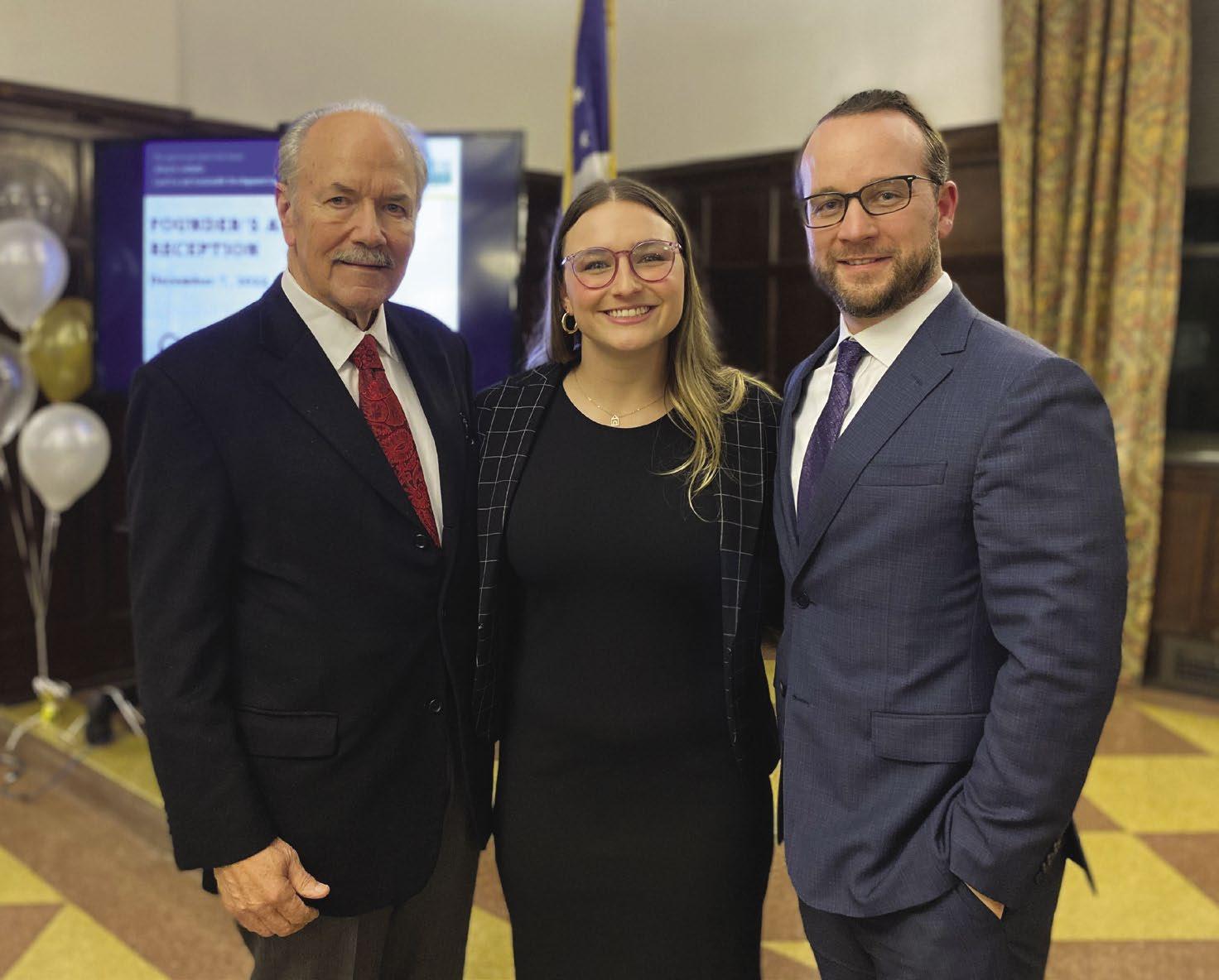
SUMMER 2023 43 FACULTY
CELEBRATING 25 YEARS IN DC
… AND RECOGNIZING THE PROFESSOR WHO MADE IT POSSIBLE
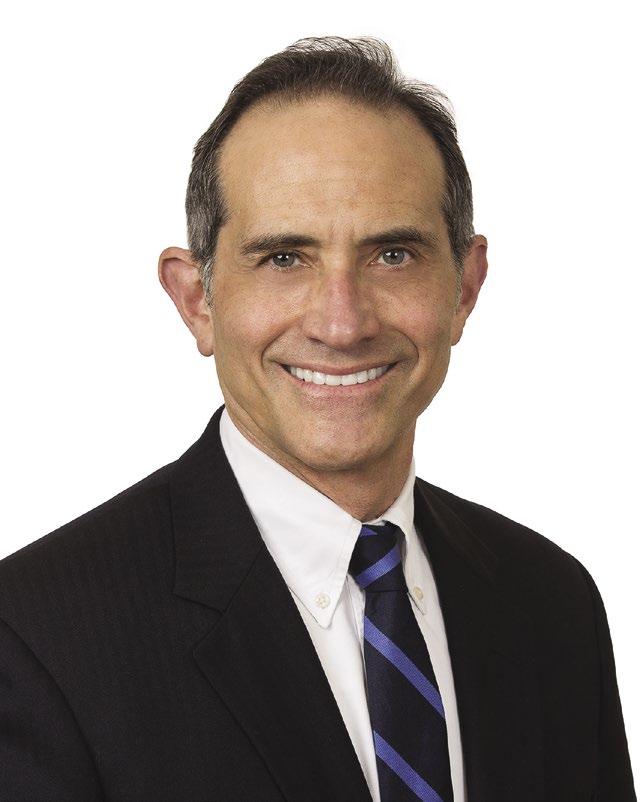
Twenty-five years ago, what was then known as Pace Law School launched a summer Environmental Law Externship program in Washington, DC. Beyond giving students direct experience with environmental law and policy, one of the key goals of the externship from the outset, as described by Professor of Law Emerita Ann Powers and champion of the program, was “to introduce students to the lawyer’s role as responsible, ethical decision-maker, with an emphasis on the special discretion of the government lawyer.” In 1997, students experienced an intensive “bootcamp” on environmental law taught by environmental legal pioneer and Pace Law Adjunct Professor David Sive. In DC they worked as externs and took a seminar taught by Adjunct Professor Steve Solow, formerly Co-Director of the Law School’s environmental litigation clinic and then Chief of the Department of Justice’s Environmental Crimes Section. Today Professor Solow is a partner at Baker Botts and still at the helm of this impactful and transformational program.
OVER HIS TENURE, PROFESSOR SOLOW HAS RECRUITED FIVE COPROFESSORS, ALL PACE ALUMNI. One former student turned co-professor, Robyn Emeson, who serves as Senior Assistant Regional Counsel in the Regulatory Enforcement Section of EPA’s Denver Regional, credits her time in the externship program as refining her introspective approach to the practice of environmental law. She recalls that “from day one, Professor Solow taught his students to critically analyze the happenings around us in our practices, no matter what the context, and to periodically take pause to ensure our actions align with how we want to be remembered one day as lawyers, colleagues, and neighbors.” Former co-professor Lauren Bachtel, now in private practice after spending the beginning of her career in the Department of the Interior’s Office of the Solicitor, credits Solow as “one of the main reasons the DC Externship is so special. His experience, energy, and inquisitive nature made every class very exciting and rewarding.” Another coprofessor, Lauren Fischer, notes that “Steve is the consummate teacher/ mentor whose wisdom and guidance provides Pace students with critical lessons on how to avoid life’s potential pitfalls and achieve excellence.”
Current co-professor Kristen DeWire, a student when the program celebrated its 15th anniversary, reflected on the “profound” effect the program had on her career – “[i]nterning at the EPA and meeting many of the alumni practicing environmental law in the DC area opened my eyes to the wide range of opportunities in environmental practice. The experience was instrumental in my decision to return to DC to pursue a career in government service.” Professor DeWire is currently Senior Counsel of the EPA Environmental Appeals Board.
Not surprisingly, Professor Solow notes the crucial role of alumni participation and engagement. The list is dozens long of former externs who come back to support and give advice to the current class. Anne Carpenter, a former extern who then spent the last 15 years working alongside Steve in private practice regularly comes back to guest lecture once every summer; former Dean of the Environmental Law Program Alexandra Dunn also joins the class and helps open doors. In the truest proverbial sense, the DC externship program is a village. Professor Solow also credits the large network of attorneys at DOJ, EPA, Interior, the Coast Guard, FERC and elsewhere who have opened the door to Pace externs.
A member of the 2019 summer class, Anxhela Mile, says it was the deep relationships she was able to build with classmates and alumni from different sectors of the environmental law field that expanded her understanding of what opportunities may exist after graduation, and helped her career trajectory towards becoming a practicing climate change lawyer.
44 HAUB LAW ALUMNI MAGAZINE
Danielle Schreiber, a participant in the 2010 summer session says that the DC externship was by far her favorite class in law school and that “Unlike traditional lectures, the DC Externship Program provides students with practical advice based on the real world legal experience they are getting over the summer. Having Steve’s expertise navigating issues relating to the public interest and tying in his private practice experience is invaluable.”
Another former student, Zaheer Tajani, who was recently appointed by the Department of the Interior as Senior Advisor for Oversight, remarks that even when it was not immediately apparent, the connections that Professor Solow helped foster with established environmental law professionals and peers alike built a network of support which would scaffold future professional success in both the public and private sectors.
In a region where there is huge competition for positions, Pace students are in the mix in part because of this growing network of Haub graduates. Professor Solow recalls that when he came to DC in 1997, he didn’t see enough Pace alumni in the environmental agencies and government offices. In his view, the biggest change over the last 25 years is how Pace students are received in the DC marketplace – they are recognized for a combination of practical skills, solid research know-how, and agency savvy, often gained through the DC program. He believes that the success of so many of his former students has helped in its own way to keep the Environmental Law Program atop the rankings for so long.
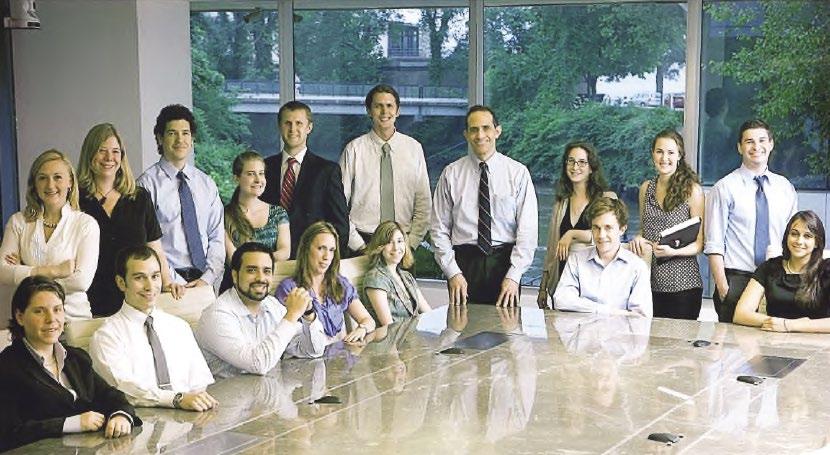
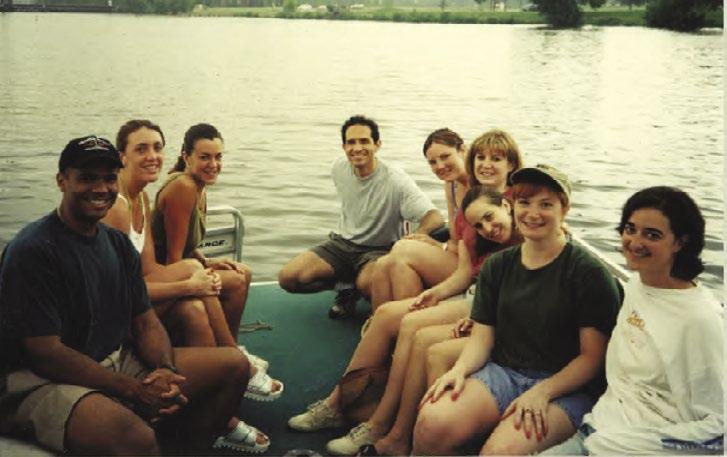

An example of how the extern program’s network impact continues to grow is the story of Samuel Capasso. A student in the 2008 summer session, Capasso is now a mentor and supervisor in his role as Branch Chief of the Community Infrastructure Resilience Branch in FEMA’s Hazard Mitigation Assistance Division. Capasso notes that “The DC Externship program gave me the confidence to apply for DC jobs. I
learned I was up to the task of serving the people of the United States and it helped me set working at FEMA Headquarters, where I now am a leader, as a career goal. I’m proud to pay this experience forward to new students!” Capasso received the 2022 Nicholas Robinson Award for Distinguished Environmental Achievement from the Law School.
Since its inception, over 225 students have participated in the Environmental Law DC Summer Extern Program. They all received the training and mentorship from Professor Solow in this programs format that Professor Powers describes as “especially effective, complementing and enriching the students’ more traditional academic experience.” Professor Robyn Emeson adds that “for 25 unwavering years, [Steve] has remained a phenomenal mentor and advocate for law students, making his mark as a foundational pillar of the Law School’s DC Externship program.”
As he prepares for the 26th summer class, Professor Solow describes how the class helps students explore the real-world issues they face. From negotiating for better work assignments and dealing with ethical dilemmas as government or private-sector attorneys, to addressing issues such as environmental justice and navigating government bureaucracies. Separately, he looks forward to the continued expansion of the Law School’s network in Washington DC. n
SUMMER 2023 45 FACULTY
NARRATIVE CAPACITY
BY PROFESSOR JAMES TOOMEY
The following excerpt is from Professor James Toomey’s 2022 article, Narrative Capacity, which was published in the North Carolina Law Review.
INTRODUCTION
Private law defines capacity as the cognitive function necessary to understand the nature of a decision and its consequences, measured at the moment the decision is made. Notwithstanding the apparent clarity of this test, it has proven viciously difficult to apply, denying people access to the basic protections of law on the one hand and facilitating disintegration of lives, legacies, and relationships on the other. Part of this challenge is the empirical difficulty of measuring cognition and the spectrum of ways in which dementia and mental illness affect different people differently. But hanging over these empirical difficulties is a normative one—what does it mean to understand the nature and consequences of a decision?
If we take a step back from the current doctrine, it is not obvious that private-law capacity cases must involve such a quagmire. In cases challenging an individual’s capacity, the parties offer the court two familiar stories about what is going on, each of which is prima facie plausible. One side tells a story about an ordinary change of heart by the decision maker— he used to love his house, but no longer now that it’s empty; she swore she would never fall in love again, but, well, we’ve heard that one before. The other side ascribes the decision to the causal power of cognitive malfunction—a story about how this decision is one that the “real person” would never have made; the dementia speaking, not my father.
The consequences of each of these stories are obvious. If the individual had a change of heart or mind, the court ought to recognize the decision
like it would anyone else’s. If, however, a disease or injury is causing decisions that are not the individual’s, the law should not recognize them. Equally apparent are the facts that we would want to know to decide between the stories—facts about the relationship of the decision with prior decisions, the relationship of the decision maker with others, and the things that happened that could have caused them to change their mind. The individual’s cognitive functioning is relevant—it would tell us something about what kind of story we are dealing with—but it is not dispositive.

46 HAUB LAW ALUMNI MAGAZINE FACULTY
From a philosophical perspective, dementia and similar illnesses pose ethical and legal challenges in part because they implicate both the philosophical constructs of personhood and personal identity. The philosophy of personhood tells us what entitles an individual to the highest level of moral concern. In contemporary philosophy, personhood is generally understood to be based on a measure of cognitive function. In contrast, the philosophy of personal identity tells us what makes us the same person across time—distinct from whether we are persons in the first place. A growing group of philosophers—supported by a convergence in fields as diverse as psychology, anthropology, and literary theory—argues that personal identity is constituted of the stories of who we are, our life stories. Because dementia can degrade our cognitive abilities, it can threaten whether we are philosophical persons. Because it can disrupt the stories of our lives, it can threaten our personal identity.
This Article argues that the doctrine of capacity has failed because it is based in the philosophy of personhood rather than personal identity. More specifically, the doctrine is theoretically grounded in a cognitive theory of personhood where it should be based in a narrative theory of personal identity. This is so for two reasons. First, substantive private law doctrines are essentially concerned with personal identity rather than personhood. A gatekeeping doctrine like capacity will necessarily fail if it tries to measure a philosophical category different from those on which the substantive doctrines rely. Second, private law is based on the fundamental commitment of facilitating human flourishing through private ordering by respecting and enforcing private decision-making.
The law accomplishes this, in part, by establishing mechanisms and adopting default rules that coincide with ordinary people’s ways of thinking. And my empirical research has shown that, overwhelmingly, seniors—the group most closely affected by the capacity doctrine— think of the question of when the law should intervene in their decisionmaking as one of the disruption of their personal identity.
Under the new doctrine of capacity I propose, the law would recognize decisions if and only if they are linked by a coherent narrative structure to the story of the person makinag them. As explained in more detail below, a decision follows as a narrative if it forms an intentional, intelligible, and coherent chain of causation thematically related to the past and future of an individual’s life. To be clear, this test is concerned with the causal structure of a decision, not its substance. As such, the narrative doctrine can accommodate a tremendous amount of human change, so long as it has the right kind of cause. Telemachus grows up, decisive Lady Macbeth ends despondent, and Rick sticks his neck out. Under the narrative doctrine, the law would recognize decisions—no
matter how substantively new or different from the choices the individual had made in the past—that relate to the individual’s life through a chain of plausible narrative causes such as love, anger, learning, growth, reconciliation, and estrangement. In the background of this standard, cognitive testing would still play a role in extreme cases of cognitive weakness where an individual’s philosophical personhood is questionable—after all, you can’t be the same person if you are not a person at all.
Thus, under the narrative doctrine of capacity, the law would respect a decision following the reconciliation of a mother with a son where the cause of her decision was narrative—a story of forgiveness, perhaps. The law would consider the relationship between the decision and the past and future of the mother’s life, whether the cause of the decision was her agency or something else, and whether the decision is understandable as a coherent story of human causation. Courts would draw on a wide range of narrative evidence—testimony from the decision maker, if possible, and testimony from family and friends either way. Sometimes the test would be met—she really forgave—and sometimes it wouldn’t be—something else is going on. For example, the law would respect the decision-making of Britney Spears so long as her decisions coherently build an evolving story of who she is—maybe a story about a woman who became famous too young who is making a life she prefers for herself in private relationships with her children. n
Professor James Toomey joined the Haub Law faculty as an Assistant Professor of Law in 2022. He teaches Property, Contracts, Bioethics and Medical Malpractice, and Wills, Trusts and Estates. Professor Toomey’s scholarship focuses on health law, bioethics, private law theory, and elder law, and his work has been published or is forthcoming in a number of leading journals.
For purposes of this excerpt, footnotes have been admitted. The full version of this article was published in the North Carolina Law Review: 100 N.C. L. Rev. 1073 (2022).
SUMMER 2023 47 FACULTY
“ THIS ARTICLE ARGUES THAT THE DOCTRINE OF CAPACITY HAS FAILED BECAUSE IT IS BASED IN THE PHILOSOPHY OF PERSONHOOD RATHER THAN PERSONAL IDENTITY.”
Q&A A Q&A with Professor Louis Fasulo
PROFESSOR OF PRACTICE AND DIRECTOR OF ADVOCACY PROGRAMS AT HAUB LAW PARTNER, FASULO BRAVERMAN & DI MAGGIO, LLP
Alumnus. Attorney. Professor. Director of Advocacy Programs. Entrepreneur. Mentor. These are some of the words that can be used to describe Lou Fasulo’s professional life. After graduating from what was then called Pace Law in 1983, Lou worked as a Public Defender for the Legal Aid Society in Manhattan for 11 years. He quickly rose in the supervisory ranks to the Position of Director of Staff Development and Training. From there, he founded his own firm while also starting his journey as Director of Advocacy Programs at Haub Law. Lou has tried over 100 cases in state and federal court in both civil and criminal matters ranging from White Collar crimes to Terrorism. He is a true trial attorney, and the courtroom and classroom

are where he thrives. For the last 30 years, Lou has made an impact on a countless number of Haub Law students and developed a top ranked advocacy program at the Law School.
What drew you to the practice of law?
I always wanted to be a lawyer for as long as I can remember. My dad was a lawyer, and he was my inspiration. I learned what the law practice meant to him and how much he enjoyed helping clients. There was no other career I could imagine myself doing from a very young age.
What was it about Pace that appealed to you when you were applying to law school?
I had friends going to Seton Hall, my dad went to Brooklyn Law, and I felt that I needed a new challenge and my own identity, so I decided to visit Pace. I was impressed with the community and the opportunities. Right away I liked the faculty community, I liked the size, and I just felt it would be a perfect fit. I wanted to begin a more serious academic journey and it worked out perfectly for me.
How did you start teaching and directing the advocacy program at Haub Law?
When I graduated from Haub Law, I went to work at the Legal Aid Society in Manhattan, I served there in a variety of
48 HAUB LAW ALUMNI MAGAZINE
capacities. Along the way, I ran into the then current teacher of trial advocacy at Pace. She was going on trial and needed help in the classroom, so I helped and I loved it. That in turn led to me getting my first class and then Dean Emeritus Richard Ottinger appointed me as the first ever Director of Trial Advocacy at Pace and I have been here since, furthering my involvement along the way. Teaching has always been my greatest passion. I love the courtroom, but I am truly passionate about teaching. It has been a true blessing to be at Pace in the capacity I am. Nothing makes me happier than watching the journey of my students in practice. I am excited when a student invites me to their first trial and shares their professional and personal successes. It is very rewarding to see the positive journey and path so many former students are on.
What differentiates Haub Law’s advocacy program from other advocacy programs?
We have a deep-rooted commitment in developing the individuality of each advocate and focusing on what personal attributes that advocate brings to the table. We work on developing each individual advocate’s skillset. We are not in the business of creating robotic lawyers. We want to find which skills will best serve that particular law student in their legal career. We expose our students to various techniques and styles so that they can find in themselves what is best for them. We provide great mentorship and opportunities for our students to get experience before graduation. It’s an all-hands-on approach by one of the most dedicated and talented faculty in the country.
What have you learned from your students over the years?
I learn how important the continual path of learning is to being the best lawyer I can be. Every single thing that happens in the classroom I reflect upon, and it helps me to adjust, modify, and sometimes change the things I do in my practice on behalf of my clients. I am also reminded about the pure excitement and energy that I had when I graduated. Being in the classroom and teaching reinvigorates me as to why I chose to continue to be on the path to serving clients and being in the courtroom.
What advice do you have for law students who are interested in pursuing a career in litigation?
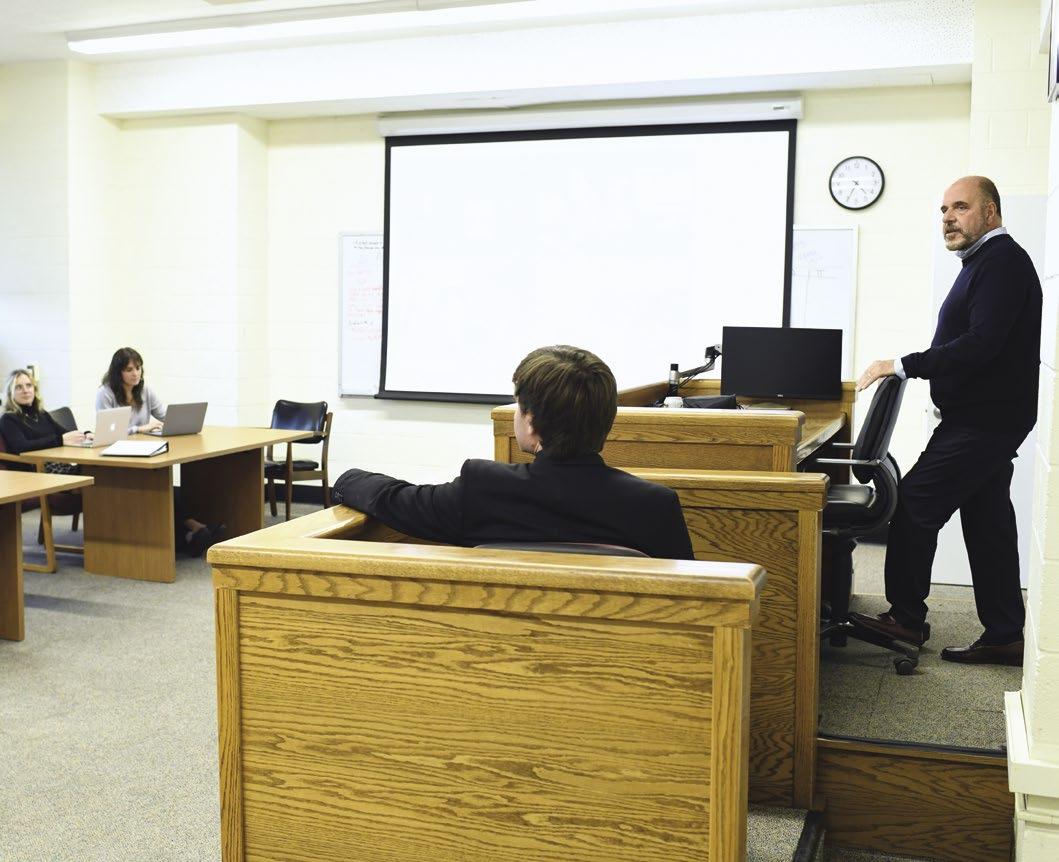
My number one advice is good lawyers are good listeners, but great lawyers are great listeners. I encourage the students to be prepared but to listen to what is needed to succeed. That listening may be auditory or might just be picking up on the vibe of a judge or jury.
After 11 years at the Legal Aid Society, you founded your own firm, over 30 years ago. What are the biggest rewards and challenges of having your own firm?
Simply stated it is defining your work world. Who you wish to work with, the cases you choose to work on and creating the atmosphere which encourages collaboration and teamwork all in the effort to serve our clients. The greatest reward is the ability to decide exactly what your practice is going to look like, how you are going to spend your days, and what legal issues you want to invest in. The second greatest reward is the mentorship you are able to provide to so many associates and new attorneys. The ability to have that positive and direct impact on new lawyers is profound. The challenge is the business end of the practice of law. You must be a good businessperson to be able to be successful as a law firm partner.
What makes Haub Law such a special place for you?
The support of the community. As much as I feel like I contribute to Haub Law, the Law School has been extremely supportive of me and the Advocacy Program. When I started, we did not have an advocacy program, but with the support of the deans, the faculty and staff I was able to develop a tremendous, top ranked program that we should all be proud of. Our deans, our faculty, our staff – they are all very supportive of one another. However, the most important element is our students. Our students work hard, respect each other and care as much about our program as I do. They are truly invested. They prove this by giving back to future classes. Haub Law to me means community and from that community come great opportunities and connections. Some of the proudest moments of my professional life have been as a result of my connection to the Law School – having the first-year moot court competition named after me and being honored at the annual law leadership dinner. It is truly a little bit different than every other law school.
You graduated from law school in 1983, 40 years ago, what sort of alumni network do you maintain today?
I stay in touch with my core group of friends who I graduated with and who remain very influential in my life and career, but I have also expanded my network in so many ways. I have met a tremendous number of Pace alumni along the way – students who are now alumni, alumni that graduated in different years than me. I have a large and extensive Pace alumni network, which I value.
Aside from the law, how do you spend your spare time?
My family just bought a house in Italy, so I look forward to spending time there together. I am a huge New York Rangers fan. I truly enjoy traveling and meeting new people. I love going to the theater. I have many entrepreneurial interests. My terrific wife along with my two daughters are my favorite people to spend time with. I am immensely proud of my daughters and all they have accomplished and continue to accomplish. To me, family time is the most important. To be a successful lawyer you must balance professional life with a strong and active personal life. n
SUMMER 2023 49 FACULTY
2022-2023 HIGHLIGHTS


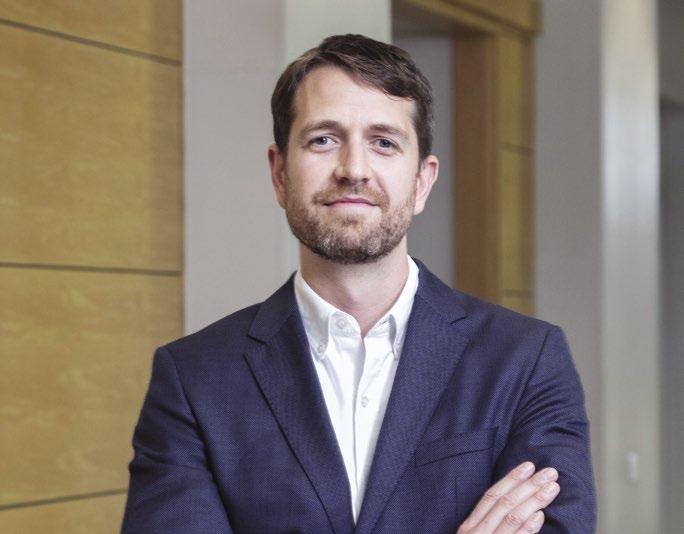



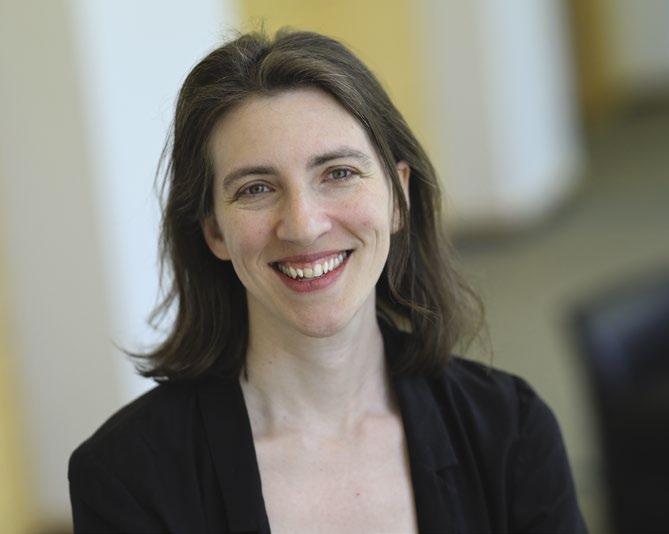


50 HAUB LAW ALUMNI MAGAZINE FACULTY
Professor Smita Narula received the 2022 Faculty Award for Excellence in Teaching
Professor Leslie Y. Garfield Tenzer is the host of the newly launched podcast, Legal Tenzer: Casual Conversations on Noteworthy Legal Topics
Professor Margot Pollans was awarded the 2022 Goettel Prize for Faculty Scholarship for her article, “Eaters, Powerless by Design” published by Michigan Law Review (120 Mich. L. Rev. 643 (2022)).
Professors Karl Coplan, Achinthi Vithanage, and Steve Solow were recognized in the “2023 Lawdragon Green 500: Leaders in Environmental Law” list
Professor Jonathan Brown was awarded the 2022 Richard Ottinger Award for Faculty Achievement.
Pace University Distinguished Professor Bennett L. Gershman was honored with a Lifetime Achievement Award at the New York Law Journal’s 2022 New York Legal Awards.
Professor Jason J. Czarnezki was named to the “2023 Energy & Environment Power 100” list published by City & State New York magazine.
MEET OUR VISITING SCHOLARS
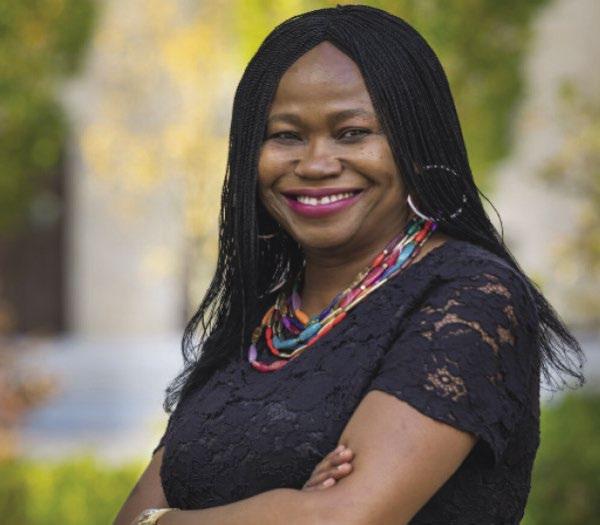
MEET OUR VISITING PROFESSORS
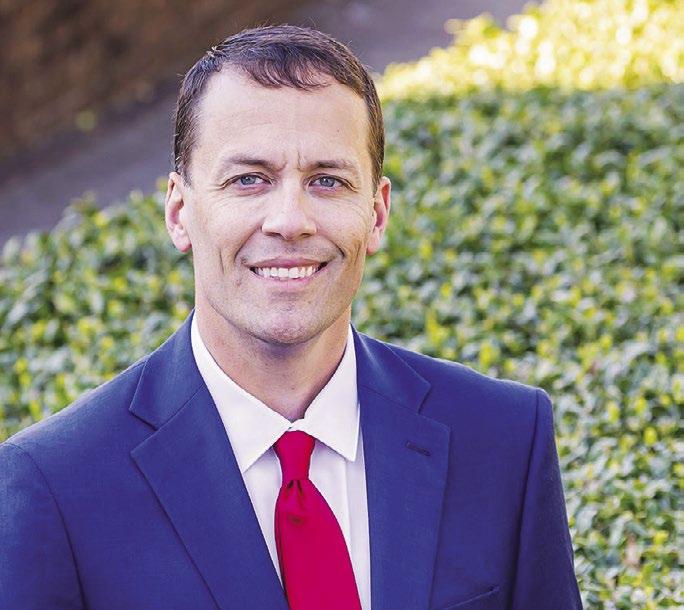
WHERE IN THE WORLD IS PROFESSOR EMERITUS JAY CARLISLE?

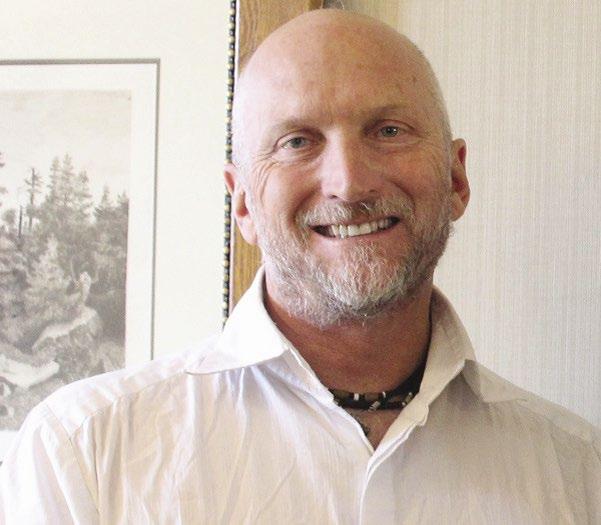
Elisabeth Haub School of Law at Pace University Professor Emeritus of Law Jay C. Carlisle II has a passion for traveling the world! In the last five years the list of countries that he has visited include: Argentina, Australia, Belgium, Bulgaria, Canada, Columbia, Croatia, Cuba, Denmark, Ecuador, Egypt, Ethiopia, Germany, Greece, Japan, Netherlands, Norway, Peru, Romania, Serbia, and Sweden. His future planned trips include traveling to Japan, South Korea, and Taiwan again this fall. And, in January of 2024 he will head to Antarctica, the Falkland Islands, and South Georgia. While exploring these countries, Professor Carlisle spends time visiting museums, art galleries, old friends, law schools, courts, attending sporting events, and consulting with and lecturing for lawyers and judges. In addition to his travels, Professor Carlisle regularly lectures at CLEs and recently authored a chapter entitled “Jurisdiction” which was published in the book DECISIONS by the New York State Trial Lawyers Institute. He also received the Homer and Charles Pace Faculty Award at the 2023 Spirit of Pace Awards Dinner. The Award pays tribute to a distinguished Pace faculty member who has made a lasting impact on the University and its students.

SUMMER 2023 51
FACULTY
Blake Hudson
James May
Debra Moss Vollweiler
Uché Ewelukwa Ofodile
FACULTY
RECENT AND FORTHCOMING HAUB LAW FACULTY PUBLICATIONS
Noa Ben-Asher
BOOKS
Secular-chriStian Social JuStice (forthcoming N.Y.U. Press 2023)
ARTICLES
Transforming Legal Sex, __ n.c. l . rev. __ (forthcoming 2024)
The Emergency Next Time, 18 Stan. J. C.R & C.L. 51 (2022)
How to Bring Your Kids Up Queer: Family Law Realism, Then and Now, 55 Fam. L.Q. 311 (2022) (co-author with Kris Franklin)
David
Cassuto
OTHER WRITINGS
Animals in Brazil: Economic, Legal and Ethical Perspectives, 13 J. animal ethicS 96 (2023)
Bridget J. Crawford
BOOKS
hot FlaSh: how underStanding menopauSe can improve liFe and law For everyone (forthcoming Stanford University Press 2024) (co-author with Emily Gold Waldman and Naomi R. Cahn)
talking about black liveS matter and #metoo (forthcoming University of California Press 2024) (co-editor with Lolita Buckner Inniss)
Federal taxeS on gratuitouS tranSFerS: law and planning (2d ed. 2023) (co-author with Joseph M. Dodge, Wendy C. Gerzog, Jennifer Bird-Pollan & Victoria J. Haneman)
menStruation matterS: challenging the law’S Silence on periodS (N.Y.U. Press 2022) (co-author with Emily Gold Waldman).
ARTICLES
A Behavioral Economics Analysis of Will-Making Preferences in Australia: When to Begin and Who Should Have Input?, 32 minn. J. int’l l __ (forthcoming 2023) (co-author with Tina Cockburn, Kelly Purser, Ho Fai Chan, Stephen Whyte & Uwe Dulleck)
Yesterday’s Protestor May Be Tomorrow’s Saint: Reimagining the Tax System Through the Work of Dorothy Day, 76 tax l rev __ (forthcoming 2023) (co-author with W. Edward Afield)
Pink Tax and Other Tropes, 33 yale J.l . & FeminiSm 88 (2023)
Menstruation in a Post-Dobbs World, 97 N.Y.U. L. rev online 6 (2022) (co-author with Emily Gold Waldman)
Managing and Monitoring the Menopausal Body, 2022 u chi legal F. 41 (2022) (co-author with Naomi R. Cahn & Emily Gold Waldman)
Contextualizing Menopause in the Law, 45 harv J. l . & gender 1 (2022) (co-author with Emily
Gold Waldman & Naomi R. Cahn)
Working Through Menopause, 99 waSh u l rev. 1531 (2022) (co-author with Emily Gold Waldman & Naomi R. Cahn)
Critical Tax Theory: Insights from the US and Opportunities for All, 51 auStl tax rev. 81 (2022) (co-author with Anthony C. Infanti)
Estate and Gift Tax Valuation of Cannabis
Business Interests: The Myriad State and Federal Rules that Apply to their Creation, Operation and Transfer, 2022 tr. & eSt. 22 (coauthor with Jonathan G. Blattmachr & Mitchell M. Gans)
BOOK CHAPTERS
Menopause Discrimination at Work, in reSearch handbook on law, Society and ageing (Sue Westwood & Nancy J. Knauer eds., forthcoming Edward Elgar 2024) (co-author with Naomi R. Cahn & Emily Gold Waldman)
Using Feminist Judgments in Upper-Level Law Courses: Teaching Justice and Equality Across the Curriculum, in integrating doctrine & diverSity: incluSion & equity beyond the FirSt year (Nicole Dyszlewski et al. eds., forthcoming Carolina Academic Press 2023) (co-author with Kathryn M. Stanchi)
OTHER WRITINGS
Dispatches from U.S. Feminist Judgments 2022 Summer Feminist Legal Theory Series: Spotlight on New Books in the Field—Gender, Race and Diversity in the Center of the Conversation, __ FeminiSt legal Stud __ (forthcoming 2023) (coauthor with Kathryn M. Stanchi)
Title IX and “Menstruation or Related Conditions,” 30 mich. J. gender & l . 101 (2023) (co-author with Marcy L. Karin, Elizabeth B. Cooper, Margaret E. Johnson, Emily Gold Waldman & Naomi R. Cahn)
Period Poverty in the United States: What the Law Should Do, gender policy report (2022) (coauthor with Emily Gold Waldman)
Jason J. Czarnezki
ARTICLES
Sustainable Business Law & The Role of ESG Lawyers, 32 n y u env’t l .J. __ (forthcoming 2023) (co-author with Joshua Galperin and Brianna M. Grimes)
Sustainable Business Law? The Key Role of Corporate Governance and Finance, 51 env’t L. 991 (2022) (co-author with Colin Myers)
James J. Fishman
ARTICLE
A Random Stroll Amongst Anthony Trollope’s Lawyers, 11 brit. J. am legal Stud 1 (2022)
UPDATES, SUPPLEMENTS & NEW EDITIONS
nonproFit organizationS: caSeS and materialS (6th ed. Supp. 2022) (co-author with Stephen Schwarz and Lloyd Hitoshi Mayer)
new york nonproFit law and practice (3d ed. Supp. 2023) (co-author with Victoria B. Bjorklund and Daniel L. Kurtz)
Joshua Galperin
ARTICLES
Adapting to a 4°C World, 52 env’t l rep 10211 (2022) (with multiple co-authors)
Sustainable Business Law & The Role of ESG Lawyers, 32 N.Y.U. env’t l .J. __ (forthcoming 2023) (co-author with Jason Czarnezki and Brianna M. Grimes)
A Restatement of Democracy, vill l rev (forthcoming 2023)
Bennett L. Gershman
UPDATES, SUPPLEMENTS & NEW EDITIONS
rotunda’S modern conStitutional law: caSeS, noteS, and queStionS (13th ed. forthcoming 2023)
rotunda’S modern conStitutional law: caSeS, noteS, and queStionS (12th ed. Supp. 2022)
proSecutorial miSconduct (2d. ed Supp. 2022)
criminal trial error and miSconduct (3d ed. Supp. 2022)
Shelby D. Green
ARTICLES
The Intentional Community: Toward Inclusion and Climate-Cognizance, __ waShburn l .J. (forthcoming 2023)
Monuments Without Faces, 71 waSh u. J. l . & pol’y __ (forthcoming 2023)
Adaptive Rezoning for Social Equity, Affordability and Resilience, 52 Seton hall l rev 1325 (2022)
Equitable, Affordable and Climate-Cognizant Housing Construction, 75 ark l rev 363 (2022)
Non-Debt and Non-Bank Financing For Home Purchase: Promises and Risks, 10 am u buS l rev. 437 (2022)
The Aerial View of Land Use: Preempting the Locals for Improved Housing Access, 36 prob & prop Sept./Oct. 2022, at 24 (co-author with Bailee Andree)
Lissa Griffin
ARTICLE
The Prosecutor in the Mirror: Conviction Integrity Units and Brady Claims, 55 loy l a l rev. 1005 (2022) (co-author with Daisy Mason)
52 HAUB LAW ALUMNI MAGAZINE
Jill I. Gross
BOOK
the Federal arbitration act: SucceSSeS, FailureS, and a roadmap For reForm (co-edited with Richard A. Bales) (forthcoming Cambridge University Press 2024)
ARTICLE
Post-Pandemic FINRA Arbitration: To Zoom or Not to Zoom?, 52 StetSon l rev. 363 (2022)
BOOK CHAPTER
RBG and Arbitration, in the JuriSprudential legacy oF JuStice ruth bader ginSburg (Ann Bartow & Ryan Vacca, eds., 2023)
UPDATES, SUPPLEMENTS & NEW EDITIONS broker-dealer law and regulation (5th ed. Supp. 2022 & 2023) (co-author with James Fanto & Norman Poser)
John A. Humbach
ARTICLE
Criminal Acts and Basic Moral Equality, 14 waSh u. JuriS rev. 341 (2022)
Katrina Fischer Kuh
ARTICLES
Eco-Necrotourism and Public Land Management: Last Chance Tourism, Ecological Grief, and the World’s Disappearing Natural Wonders, __ Fla. St l rev __ (forthcoming 2024) (co-author with Robin Craig)
Informational Regulation, the Environment, and the Public, 105 marq l rev 603 (2022)
Adapting to a 4°C World, 52 env’t l rep 10211 (2022) (with multiple co-authors)
BOOK CHAPTERS
Canada and the United States, in reSearch handbook on climate change mitigation law (2d ed. 2022) (co-author with M.C. Leach)
Can the Constitution Save the Planet?, in democracy in a hotter time (David W. Orr ed. forthcoming 2023) (co-author with James R. May)
Avoiding Performative Climate Justice, in adapting to a 4° world (K. Kuh & S. Roesler eds. forthcoming 2023)
Vanessa H. Merton
ARTICLE
Betrayal of Trust, Restoration of Hope: How to Enforce the Law and Transform the Lives of Immigrants Ripped Off and Damaged by Bad Lawyers and Scammer Notarios, 93 St. John’S l rev __ (forthcoming 2023)
Michael B. Mushlin
UPDATES, SUPPLEMENTS & NEW EDITIONS
rightS oF priSonerS (5th ed. 2021/2022 Supp.) & (2023 Supp.)
Smita Narula
ARTICLE
Confronting State Violence: Lessons from India’s Farmer Protests, 54 colum hum rtS l rev 89 (2022)
BOOK CHAPTER
Peasants’ Rights and Food Systems Governance, in the united nationS declaration on peaSantS’ rightS (Mariagrazia Alabrese, Adriana Bessa, Margherita Brunori, Pier Filippo Giuggioli, eds., 2022)
John R. Nolon
ARTICLE
Pandemics and Housing Insecurity: A Blueprint for Land Use Law Reform, 46 vt l rev 422 (2022)
Margot J. Pollans
ARTICLES
FDA as Food System Stewards, 46 harv env’t l rev. 1 (2022)
Eaters, Powerless by Design, 120 mich l rev. 643 (2022)
BOOK CHAPTER
Bodies as Food System Sacrifice Zones, in reSearch handbook in international Food law (Michael Roberts ed., forthcoming 2023)
Nicholas A. Robinson
BOOK
FulFilling the SuStainable development goalS: on a queSt For a SuStainable world (2022) (co-edited with Narinder Kakar & Vesselin Popovski)
ARTICLE
Environmental Due Process: Magna Carta’s “The Law of the Land,” 38 nat reS. & env’t 4 (2022)
Michelle S. Simon
ARTICLE
Against a Uniform Law on the Income Taxation of Trusts, 61 u louiSville l rev. 317 (2023)
Leslie Y. Garfield Tenzer
ARTICLES
Defending Defamation, __ harv. J. SportS & ent. l . __ (forthcoming 2023)
Social Media Harms and the Common Law, 88 brook l rev. 227 (2022)
A 180 on Section 230: State Efforts to Erode Social Media Immunity, 2022 pepp l rev 49 (2022) (co-author with Hayley Margulis)
James Toomey
ARTICLES
Love, Liberalism, Substituted Judgment, 99 Ind l .J. __ (forthcoming 2024)
“Religion,” Before Darwin, 101 waSh u l rev (forthcoming 2024)
Property’s Boundaries, 109 va l rev. 131 (2023)
The Age of Fraud, 60 harv. J. legiS. 101 (2023)
Narrative Capacity, 100 n c l rev. 1073 (2022)
Emily Gold Waldman
BOOKS
hot FlaSh: how underStanding menopauSe can improve liFe and law For everyone (Stanford University Press, forthcoming 2024) (co-author with Naomi R. Cahn and Bridget J. Crawford)
menStruation matterS: challenging the law’S Silence on periodS (N.Y.U. Press 2022) (co-author with Bridget J. Crawford)
ARTICLES
Just Extracurriculars?, __ minn l rev (forthcoming 2023)
Menstruation in a Post-Dobbs World, 97 N.Y.U. L. rev online 6 (2022) (co-author with Bridget J. Crawford)
Contextualizing Menopause in the Law, 45 harv J.l . & gender 1 (2022) (co-author with Naomi R. Cahn Bridget J. Crawford)
Working Through Menopause, 99 waSh u l rev 1531 (2022) (co-author with Naomi R. Cahn Bridget J. Crawford)
Managing and Monitoring the Menopausal Body, 2022 u chi legal F. 41 (2022) (co-author with Bridget J. Crawford and Naomi R. Cahn)
BOOK CHAPTER
Menopause Discrimination at Work, in reSearch handbook on law, Society and ageing (Sue Westwood & Nancy J. Knauer eds., forthcoming Edward Elgar 2024)
OTHER WRITINGS
Title IX and “Menstruation or Related Conditions,” 30 mich. J. gender & l . 101 (2023) (co-author with Marcy L. Karin, Elizabeth B. Cooper, Margaret E. Johnson, Bridget J. Crawford & Naomi R. Cahn)
Period Poverty in the United States: What the Law Should Do, gender policy report (2022) (coauthor with Bridget J. Crawford)
SUMMER 2023 53 FACULTY
Q&AMeet the “Back Seat Boyz”
We all remember our time at law school – the courses, the professors, learning the law behind the infamous rule against perpetuities, the study groups, and the friendships made through it all. In 1986, a group of 11 law students formed a bond during their 1L year that has lasted long past their law school graduation. During their law school tenure, this close-knit group studied hard together, but also made plenty of time for fun. Since graduating in 1990, the group has made it a point to get together twice a year regularly. We sat down for a Q&A with two core members of the group, Eric Ploumis and John Rand, to learn more about the self-proclaimed “Back Seat Boyz.”
Let’s dive right in – who are the official members of the “Back Seat Boyz” and how did the group come to be?
We started with Alan Clement, Greg Mayer, Bill McDonald, Frank Napoli, Paul Neugebauer, Ray Nicotera, Jim Pascalicchio, Eric Ploumis, John Rand, Tony Roccamo, Judge Kevin Russo. We do invite other classmates and professors to join us at some of our events. We were all strivers who went to what was then known as Pace Law to better ourselves, but we knew how to have fun while working hard. Somehow, we all ended up sitting in the back two rows of any classroom where seats were not assigned. We all tended to gravitate to these back two rows under the mistaken belief that we wouldn’t be called on during class. Often, after a particularly tough class or tough week, we would convene at a local pub to blow off steam. We were all working full time at demanding jobs, putting in 18-hour days between work and school, but we always made time to have fun. During exam weeks we would often get together on the weekend at one of the crew’s offices to prepare and study for the upcoming exam.

I have heard rumors of honorary members of your group. He may not want to admit being associated with us, but we consider Professor Carlisle an honorary member. He frequently attends our dinners as our honored guest. At a recent dinner, Dean Horace Anderson joined us. Dean Anderson is still on probation and doesn’t come up for a vote until his third event with us.
Since graduation, how often does the group meet?
Officially as our full group, we meet twice a year, once in the winter for a steak dinner, once in the summer for a seafood extravaganza. We are all very comfortable with each other, confident in the brotherhood the years have


54 HAUB LAW ALUMNI MAGAZINE
created. It is not unusual for a member of the group to float a question or ask for advice. Each of us has a different specialty and knowledge base. We share each other’s happy times and console each other in sad times.

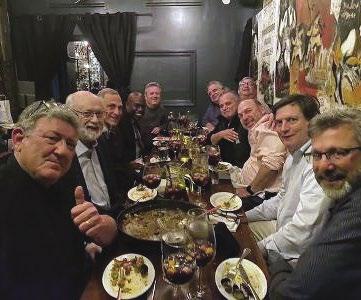

I suspect that this article may elicit some future “Back Seat Boyz” – what advice would you have for them?
It is easy to bond with your classmates during the crucible of law school. Staying close after law school requires one or two of the gang to organize and coordinate events and not take no for an answer. We are all very different people with a lot in common. The enduring friendships are worth the small effort it takes to maintain them.
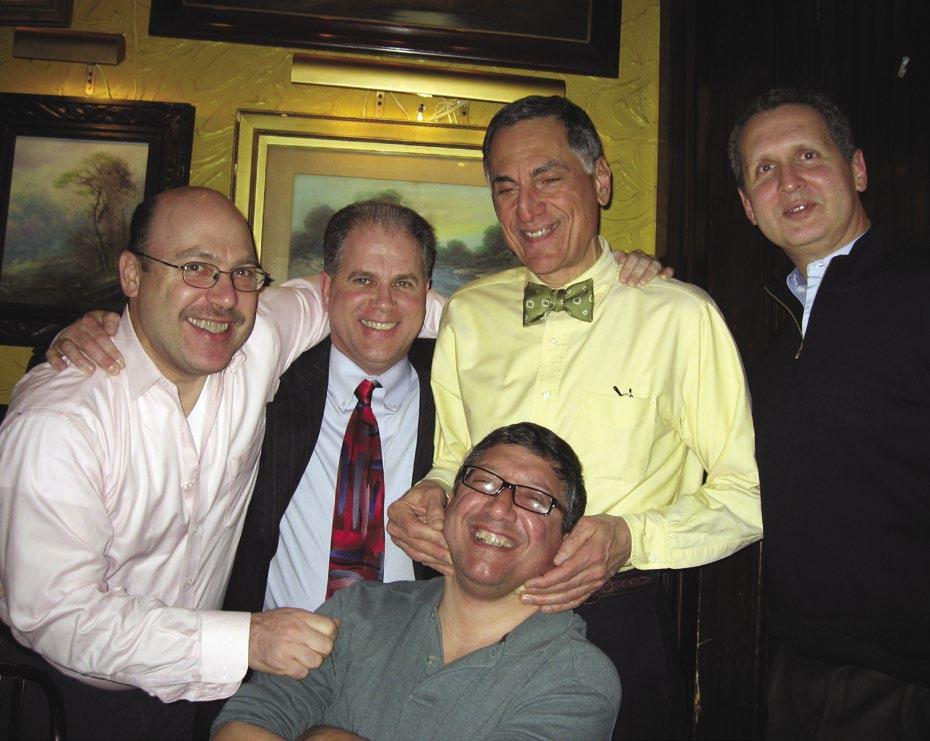
Going back to before it all started, prior to law school, both of you were involved in full-time, non-legal careers. What brought you to law school?
Eric Ploumis: I was a full-time orthodontist when I started what was then known as Pace Law. I did not go to law school with the intention of ever practicing law, but I ended up as a full-time orthodontist and a full-time attorney doing transactions for dentists. While I have retired from orthodontics, I still practice law at Rivkin Radler. Pace’s night program was perfect for me and geographically convenient as well.
John Rand: I was a practicing pharmacist when I started law school and envisioned working for Big Pharma after law school. When we graduated in 1990 the pharmaceutical industry was on a down swing. I went into litigation instead and now work at Clark, Gagliardi and Miller in White Plains, which has enjoyed a close relationship with the Law School since the Law School’s inception.
Summed up, what would you say about your experience at Pace?
Attending night school while working full time was a grinding experience for all of us. Having the support of a good group of guys made it more tolerable. We were at Pace to better ourselves and without exception, it proved a good investment of time and effort. n
SUMMER 2023 55 ALUMNI
SJD: A CRUCIAL DEGREE
Daniel Castelo Branco Ramos ’21 (SJD) Federal Judge/Professor

As a federal judge in Brazil, Daniel Castelo Branco Ramos describes his day to day as “overwhelming.” With the number of cases per judge always in the thousands, one of the highest on average in the world, Judge Ramos is lucky if he has any down time at all.
“Many of my cases involve a lot of litigation. Each morning, I dedicate myself to studying the most complex cases, elaborating on, and editing my opinions. In the afternoon, I attend to the lawyers, preside over hearings, and coordinate my advisors. As a morning person, this division of tasks works well. Even though it is extremely busy, I enjoy what I do, both the intellectual tasks and the personal contact with lawyers and litigants.”
Judge Ramos is also a professor, teaching environmental law, tax law, administrative law, and civil procedure law at the Milton Campos Law School, a private law school in Brazil. “Learning has always been of interest to me and in turn, so has teaching. I graduated with a degree in law from the Federal University of Minas Gerais 1998, which is one of the most traditional and respected universities in Brazil. I later received a master’s degree in public law in 2009 from the same University.”
It was Judge Ramos’s interest in both learning and environmental law that led him to pursue his SJD at Haub Law. “I knew Haub Law’s strong reputation and decided to apply for the doctoral program in environmental law. In addition, the differences between the legal systems in the United States and Brazil motivated me to do more in-depth comparative law research.” While he was a student at Pace, Judge Ramos had what he describes as many outstanding professors, including David Cassuto, Jason Czarnezki, and Nicholas Robinson.
While Judge Ramos describes the SJD program at Haub Law as one of the toughest intellectual and personal tasks of his life, he is very cognizant of the importance of the end result. “I work with environmental litigation and teach environmental law. The knowledge that I acquired during my SJD studies was crucial both in solving practical day-to-day issues and in deepening my legal thinking and research. Additionally, being immersed in a learning environment with a social and legal culture so different from the one I was used to was invaluable.”
When he isn’t behind the bench or in the classroom, Judge Ramos enjoys immersing himself in the nature of his home state, Minas Gerais, its many nature reserves, impressive waterfalls, fauna and flora. He is also very interested in the arts, literature, and music. n
56 HAUB LAW ALUMNI MAGAZINE
ALUMNI
“I KNEW HAUB LAW’S STRONG REPUTATION AND DECIDED TO APPLY FOR THE DOCTORAL PROGRAM IN ENVIRONMENTAL LAW.”
DANIEL CASTELO BRANCO RAMOS ’21
OUT OF LOSS, A LEGACY IS BORN THE ADAM GIARDINA MEMORIAL SCHOLARSHIP
Adam Giardina was the youngest of three boys in his family. Growing up in Mount Kisco, his parents Anthony and Angela, describe Adam as always having an interest in the environment.
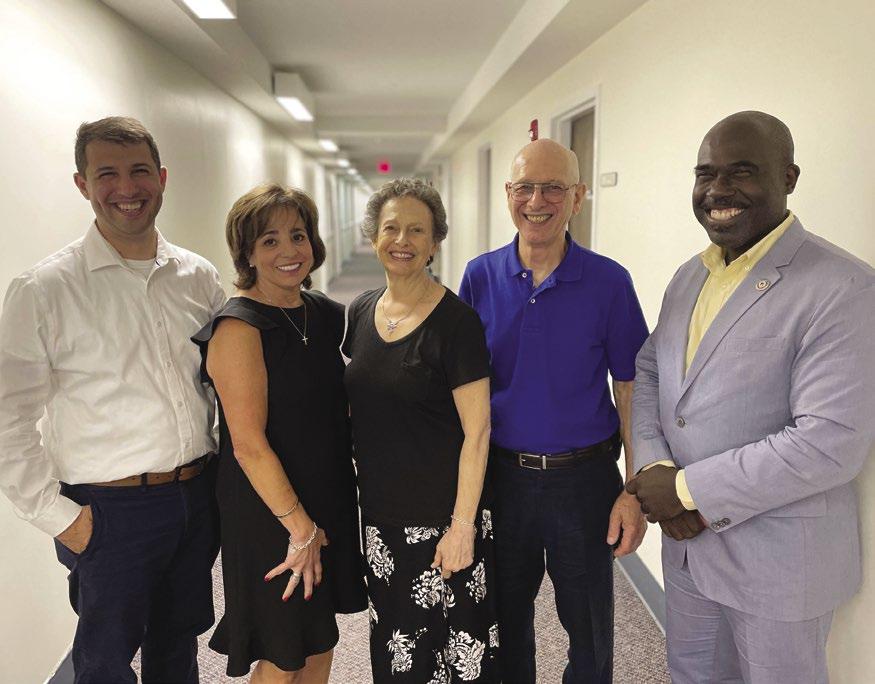

“Adam would spend hours down at the river during the summers, examining the crayfish,” recalled his mother, Angela. “He was always very concerned with the water, and we had a boat and often went out on the Long Island Sound, which he really enjoyed.”
Adam’s father, Tony, was a plumbing and heating contractor. It became clear as Adam got older that he did not enjoy manual labor in the same way his older brothers and father did. “When Adam started at Pace University, he knew he wanted to pursue higher education but wasn’t sure what to major in, so his grades began to slip,” said Tony. “I told him, okay, you tried this, now why don’t you come to work with me. So, I purposely took him on some of the dirtiest jobs that I have ever done. Immediately, Adam decided, he was going to continue college and keep his grades up. Not only that, but he also decided he wanted to continue his education after graduation – he decided to go to law school.”
Adam’s last semester as an undergraduate at Pace had him interning at the District Attorney’s Office in Connecticut, which he loved. Adam’s positive experience at Pace University led him to apply to Pace Law School. He was accepted and had decided to attend. Adam was all set to start law school at Pace in the fall of 1992 when his life was cut short in a tragic motorcycle accident.
After learning of Adam’s death, Pace held a memorial for Adam, which was attended by many. “From the moment they learned of Adam’s death, Pace has always been supportive,” said Tony. “When Adam was an undergraduate student at Pace, Alba Shane, who worked in human resources at the time, took Adam under her wing and helped him. It
was Alba who helped us start the scholarship at Pace to keep Adam’s memory alive. We chose Pace because Adam chose Pace and that is important to us.”
Today, the Adam Giardina Memorial Scholarship is an Endowed Fund at the Elisabeth Haub School of Law at Pace University. “We started off small, the first award was $250, but it was endowed very quickly and each year the amount of the scholarship has increased,” recalls Angela. “This scholarship makes a difference in our lives and hopefully in the lives of those who receive the award each year.”
Over the years, the Giardina’s have kept in touch with many of the scholarship recipients. “Once a student is selected and we meet them, we tell them, ‘Concentrate on your classes, if you have any extra time left over and you want to say hello, that is great.’” Significantly, many of the students have paid it forward once they graduate and now donate to Adam’s Scholarship.
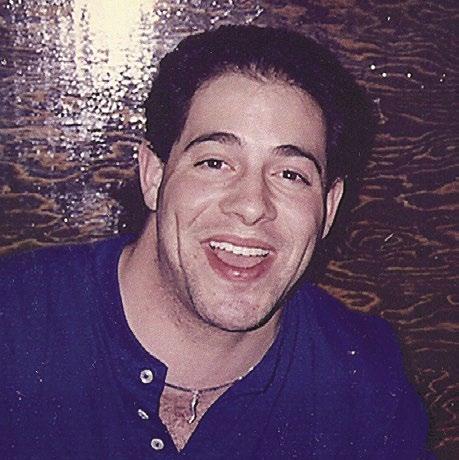
SUMMER 2023 57 ALUMNI
Adam Giardina
Continued on page 59.
The Giardina’s with past Adam Giardina Memorial Scholarship Recipient Chris Roberta
Brian Giardina, Angie D’Agostino, Angela Giardina, Tony Giardina, and Dean Horace Anderson
BREAKING BARRIERS
Najia Sheikh Khalid ’09
A British-born Pakistani American Muslim and the youngest of three siblings, Najia Sheikh Khalid’s first field of interest was not law, but rather, medicine. She suffered from chronic asthma as a child, warranting multiple hospital visits. The early exposure to patient care and its impact on others drew Najia to medicine. She even interned in an emergency room during a high school experiential learning program.

However, Najia was destined to impact others as a JD, not an MD, by focusing on people’s livelihoods and global mobility. “My father left Pakistan to study in the U.K., supported himself to become an engineer, and then, when I was three, he was sponsored for employment-based work authorization to transfer to the U.S.,” said Najia. “I grew up in Michigan in the 1980s, where my family was active in the Pakistani and Muslim communities, and I always said I wanted to be a doctor when I grew up…that happened a bit sooner than expected in some ways, as my father died when I was 13, during my brother’s first year of law school. This life event altered many things I thought about growing up…my father and brother influenced my career path significantly, serving as inspiration to break barriers and venture into the unknown. They are the first of many male allies in my professional journey.”
During 9/11, Najia was a junior at the University of Michigan. She was highly involved with student groups on campus, serving as a Resident Advisor and Chair of the Pakistani Student Association. She recalls, “Despite being an active part of such a prominent and diverse campus, my Muslim identity was now viewed differently. The fact that my family and I were long-time permanent U.S. residents (“green card” holders) and not U.S. citizens became concerning. The culmination of local and world events, and people’s reactions, stories of immigrant detainment, etc. led to me developing an interest in criminology, law, deviance, and
immigration (and to applying for U.S. citizenship).” Still, Najia could not yet see herself pursuing a career in the law. Upon her brother’s recommendation she applied for a paralegal position after graduating college. “The role I obtained at Fragomen, Del Rey, Bernsen and Loewy, LLP (the firm that happened to handle my father’s employment-based immigration case years prior), laid the foundation for my career.” Najia decided to attend Haub Law to become a business immigration lawyer, while she worked for Fragomen in Manhattan and lived in Westchester.
Once at Haub Law, Najia continued to work as a Business Immigration Law Clerk, and also became a Student Attorney at Haub Law’s Immigration Justice Clinic (“IJC”). “The IJC kept me focused on the
practice of law in real life, with a feel and purpose different from being a student in law school. I did not enjoy studying the law in the academic setting; I thrived learning the law in a practical real-world environment.” For Najia, her participation in the IJC only confirmed her interest to pursue a business immigration path post-graduation. “Professor Vanessa Merton was an inspiration to me and remains a mentor and friend.
I had wonderful experiences in class with Professor Tom McDonnell for International Law and Professor (now Dean) Horace Anderson for
58 HAUB LAW ALUMNI MAGAZINE
Partner, Chair of Business Immigration and Compliance Practice Co-Chair of Diversity, Equity, and Inclusion Committee, Wiggin and Dana LLP
“ THE IJC KEPT ME FOCUSED ON THE PRACTICE OF LAW IN REAL LIFE, WITH A FEEL AND PURPOSE DIFFERENT FROM BEING A STUDENT IN LAW SCHOOL.”
NAJIA SHEIKH KHALID ’09
International IP Law. Dean Anderson was also faculty advisor to the Muslim Law Students Association, which I co-founded during my time at Haub Law.”
After obtaining her JD, Najia worked for three years with a reputed immigration practice group. It is there that she started to learn from another male ally (the managing partner of the group), the craft of building immigration cases, developing business, and practice management. By the time she joined Wiggin and Dana in June 2012, she had almost 10 years of business immigration experience handling complex casework and client/process management. “I was hired as Wiggin and Dana’s first attorney dedicated to immigration law. I initially served as Co-Chair to develop the Business Immigration and Compliance Practice along with a Labor & Employment partner. This male ally played a key role in how I was able to effectively develop relationships with clients and partners. I became Chair of the practice when I was promoted to the partnership in 2018. I earned the privilege and responsibility of being a Partner and leading my own practice in an area of law that keeps me challenged and intrigued.”
Najia also serves as Co-Chair of the DEI Committee at Wiggin and Dana with the Firm’s Chief Operations Officer to help the Executive Committee and Chief DEI Officer manage internal/external DEI initiatives. “I spearheaded efforts with firm leadership to help develop and implement a strategic DEI task plan to ensure all professionals receive equitable access to meaningful work opportunities and mentorship. As the firm’s first Muslim and Pakistani partner (diverse identities that are still
uncommon across the highest leadership ranks across firms), and as a woman who was promoted to partnership while on maternity leave (not the first, but the third such woman at Wiggin and Dana), I know how much representation matters. I am committed to mentoring and facilitating opportunities for minorities and working parents.”
Najia is the proud parent of a kindergartener and acknowledges the similarities between parenting and being a partner at a law firm. She describes both as “all-consuming roles,” in which she “strives every day to do [them] justice.” A strong believer in being connected to and having passion for your life’s work, Najia loves being both a partner practice leader and a parent. One description of the law that resonates with her and which she shares when mentoring students is: “Being a lawyer isn’t a profession where you can simply tolerate your job, or where you can dial it in for the paycheck. Lawyers get paid to think – we have to be fully engaged the whole time. But, if you get it right with your career path, you will be incredibly fulfilled.”
While parenting and business immigration law are among Najia’s passions, so is being a Michigan Wolverine. “College football season and trips to the Big House keep me energized (especially of late since my daughter watches games with me and likes to pretend she is quarterback “Zarin McCarthy!”). Najia also makes time to ”relax and play with Zarin as much as possible, travel the world, read literary novels, write non-fiction, and keep up with Bollywood music and movies.” She “enjoys the finer things in life and simple pleasures,” and “never forgets to be thankful for being able to do what she loves as a partner practice leader.” n
2010-2011 scholarship recipient Chris Roberta ’13 recalls how meaningful it was to be selected for the Adam Giardina Memorial Scholarship, “I had never in my life been selected for such an honor – it made me proud and provided some relief from the financial investment of law school. Sharing an Italian American Heritage and family values with the Giardina’s made it that much more special,” he said. “Since graduating in 2013, I choose to donate to the scholarship so that someone else can hopefully feel the same joy as I did from receiving it.”
Amanda Burns ’11, who also is a past recipient of the Adam Giardina Scholarship remains grateful. “After law school, it gave me a beautiful reminder throughout my career to try and give back through my legal education. Currently, I take on court appointed attorney roles representing conserved people, who can’t afford representation, in guardianship matters. The scholarship will always be something I am grateful for, and a prompt to use my legal services to help someone.”
It is important to the Giardina’s that Adam’s memory lives on and that his scholarship continues. Their oldest grandson, Brian Giardina, attended law school in California and is now a lawyer practicing in New York and New Jersey. The family’s plan is for Brian to take over the management of the scholarship to ensure it lives on. “The relationship between Pace and my family is very special,” said Brian. “I am grateful for the opportunity to honor my Uncle Adam by continuing the scholarship fund and in supporting Haub Law Students.”
Each year, Angela and Tony write a newsletter about the Adam Giardina Memorial Scholarship Fund. “We like to show donors where their money is going and the positive impact it has had,” said Angela. “I think because we remain so interested and engaged, our donors remain interested and engaged.”
Both Angela and Tony know that none of this would be possible without the guidance and help from certain individuals at Pace that they have met along the way. “Cathy Alexander and Angie D’Agostino have been so kind and so helpful to us. Lori Kanner is always reaching out and connecting with us and Marc Potolsky is one of the most caring people we have ever met. The people at Pace have just touched our lives in such an impactful way, they feel like family.”
The Giardina’s are confident that Adam would have been a great lawyer and through his scholarship, they are in turn helping the next generation of great lawyers. “We like to think of the scholarship recipients as Adam’s Scholars. In a small way, he is helping them achieve the dreams that he also had for himself. When we think of the work they are doing, and when we work with Pace on maintaining the Adam Giardina Memorial Scholarship Fund, we remember a quote we’ve grown fond of, ‘Never forgotten, always loved.’ Adam’s scholarship is one way that we can ensure he will most certainly never be forgotten.” n
SUMMER 2023 59 ALUMNI
OUT OF LOSS, A LEGACY IS BORN The Adam Giardina Memorial Scholarship Continued from page 57.
Q&AChange-Agent for Humanity Basil
Seggos ’01
New York State Department of Environmental Conservation (DEC) Commissioner
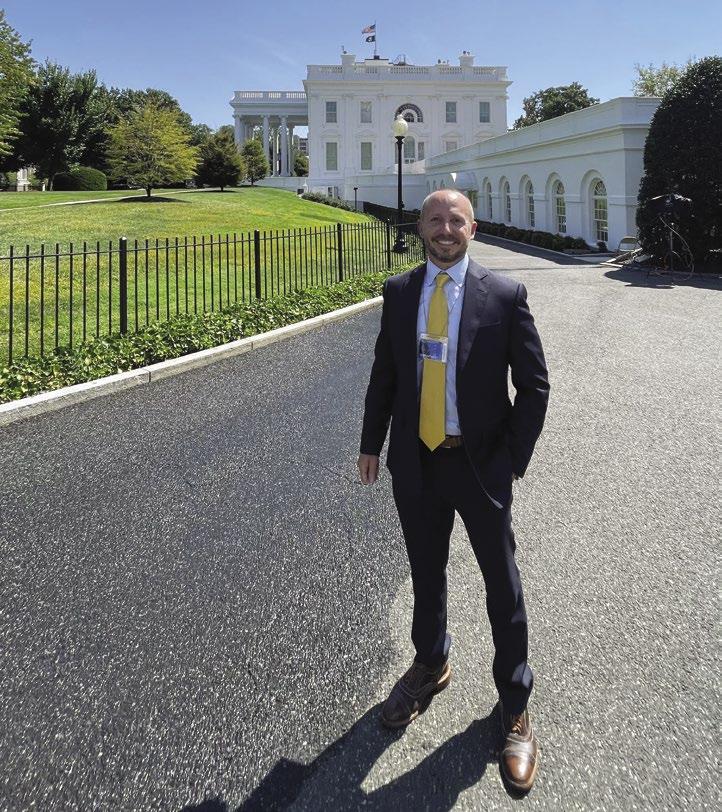
From a young age, Basil Seggos ’01 was always interested in the outdoors and with nature itself. As he went through high school, and college, he gained a greater appreciation of the amount of injustice in the world and was motivated to be a part of the effort to try to help resolve some of these issues, specifically environmental issues being faced by people and by the planet. Law school proved to be the perfect fit for him, and he was able to merge his passion for the environment with his sense of and desire for justice. Appointed in 2015, Basil Seggos ’01 is the New York State Department of Environmental Conservation (DEC) Commissioner. Today, he leads an agency of over 3,000 professionals and is the longest serving DEC Commissioner.
You have accomplished so much as DEC Commissioner, what are you most proud of?
I am most proud of the passage of the state’s climate law and the work we have done to begin its implementation. That would be number one. Number two is rebuilding the agency and reinjecting a sense of purpose through a bolder agency budget, increased staff, and a modernized mission for the challenges over the horizon. DEC was heavily impacted by the economic downturn of the late 2000s. It took the better part of eight years to rebuild the agency to where it is now. Number three is securing billions of dollars for water quality infrastructure across the state. Starting with almost no grant money for infrastructure when I first took this job, we now have a nearly $5 billion grant fund, and the largest revolving loan program in the country. Number four is bringing a sense of environmental justice into the everyday work we do as an agency. This includes helping to guide the agency in a positive way and ensuring
we are making decisions and investments with the goal of righting the wrongs of the past. Finally, the last thing would be keeping New York at the lead of important environmental issues, whether it is climate, water, emerging contaminants, or environmental justice. We have set the tone nationally for many important initiatives. And, while we haven’t solved all the state’s legacy issues, we are on the right track.
You were instrumental in the passage of the state’s nation-leading climate change law, the Climate Leadership and Community Protection Act – how did you achieve that tremendous milestone?
We are confronting an existential crisis, so the questions are: what do we do about it? What actions can we take to address the crisis and reduce burdens on front line communities while keeping the state economically competitive? Those questions served as the foundation for the law, and it will likely be one of the most challenging undertakings in state history. We’re now in the implementation phase, and while we develop new policies and investment programs, we’re also doubling down on communicating with New Yorkers. Change of any kind is difficult and change on this scale and in this polarized environment can be frightening if we don’t emphasize constant communication and stakeholder engagement. It was important for us to lay the groundwork in a collaborative way and ensure that the various stakeholder groups had a voice. We worked with environmental justice groups, industries, unions, businesses, and local government officials to create a groundswell of stakeholders who would help craft and implement solution. Goals and targets are critical, but ultimately, the process needs to be collaborative and empowering.
How did you ultimately choose the law as a career and specifically Haub Law?
I was working at the NRDC after college, specifically with the urban environmental team and I got to know a bit about Haub Law. There were some Haub Law professors who were active with the NRDC and they encouraged me to think about law school. It was the perfect opportunity to create a career centered on justice and the environment. I’m so glad that I chose Haub Law.
Which professors at Haub Law had the biggest impact on you?
I distinctly remember Karl Coplan, he was the toughest and most outstanding professor I ever had. Karl managed the Environmental Litigation Clinic at the time, and no one had a better handle of the science, facts, and the law—if you were in his clinic, you better come prepared. He very effectively put students into challenging situations and helped us learn how to become attorneys. And then of course there was Nick Robinson, an absolute legend. He was my first environmental law professor. He had a global view of the law and understanding of how to use environmental law and policy to improve lives. Ann Powers was
60 HAUB LAW ALUMNI MAGAZINE
another terrific professor. All three of them took great care and interest in their students.
What were some of your most impactful experiences during your time at Haub Law?
My time in the environmental litigation clinic was certainly formative and challenging. We students were quickly immersed in real-life cases. During my first two weeks in the clinic, I was handed a case that was headed towards an appeal in federal court. It forced me to evolve from being a mere student into a young practitioner with real clients, briefs and appearances in court. Professor Karl Coplan quickly prepared me for that opportunity. That was the first time that I really felt the ability of a person to impact change in a meaningful way in a court of law.
What are your thoughts on New York’s recently passed Green Amendment?
One of the things I take away from it is the fact that New Yorkers value the environment—they went the polls and said yes, the protection of the environment should be enshrined in the state’s constitution. As someone who works on the environment every day in New York, I take pride in knowing that New Yorkers value these issues. Now, the courts will ultimately decide what the green amendment means. There are several cases working their way through the courts to determine the implications of the amendment.
You have an active presence on social media – how do you feel that social media helps to push forward movements for change?
Social media has been an important tool to advance environmental progress. From spreading awareness of issues to galvanizing movements, we’re fortunate to have these tools to help knit us together as a society. In the same breath, social media can also be divisive, and it is often rife with misinformation, and often much worse. There has to be a balance. Use social media as one of the ways to rapidly and widely communicate with the public, but don’t let it supplant the obligation to get out of one’s seat, hit the ground, and be present to speak to people face to face—and listen to what they have to say.
What do you feel is the biggest misconception about climate change law?
The biggest misconception about climate change law is that action is incompatible with progress. That it is hostile to jobs. And the economy. I believe it is the exact opposite. A state or nation that safeguards its environment ultimately protects its economy. All of our climate initiatives are part of a larger theme of progress for New York State.

How did you build equity into the climate law?
Equity and justice are at the heart of the climate law. The law requires us to hit our statewide emissions reduction targets, but it also requires us to ensure we are investing at least 35% of our environmental investments- with a higher goal of 40%- in our frontline communities. We have extended that beyond climate law to our water funding and the recently passed $4.2 billion Bond Act. The status quo of inequity is
unacceptable, and it may take years to unpack this and do better for all New Yorkers. It means putting a greater emphasis on equity, now, focusing our work where the conditions have been the worst so we can reverse fortunes and improve health and people’s lives. That is the greatest takeaway of the climate act – the trajectory it has put us on. We now have an ability to truly improve lives of millions of New Yorkers, especially those who have been historically marginalized.
In the fall of 2022, you took a leave of absence to go to Ukraine to aid in humanitarian efforts as as the Russian invasion was escalating. You recently went back on another humanitarian mission. What were those experiences like?

When Russia invaded Ukraine, I felt compelled to act. For me it wasn’t enough to speak out on the outrage of the invasion of a democratic ally. I couldn’t just sit on the sideline. I had the ability to go the extra step to provide just a little bit of help where it was needed. Fortunately, I was lucky enough to link up with some veteran and humanitarian groups who were bringing aid into the country, so I went over in the fall and became an ambulance driver for 2 weeks, all the way to the front. And I just returned from another two weeks behind the wheel of an ambulance. Our group also built playgrounds, repaired a roof on a recently bombed
Continued on page 63.
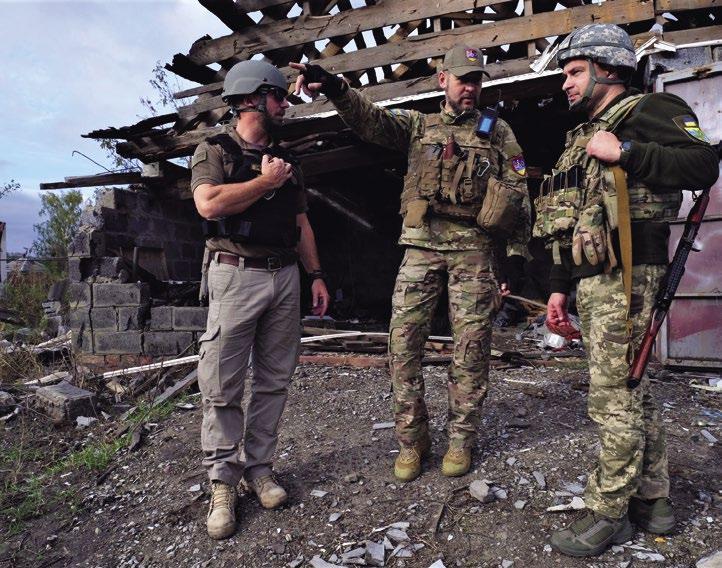
SUMMER 2023 61 ALUMNI
Q&A Going For It
Shari B. Hochberg ’12
Law Clerk, United States District Court, Southern District of New York
Shari B. Hochberg ’12 knew from the time she was twelve years old (if not sooner) that she wanted to be a lawyer. Choosing Haub Law due to its unique geographical location and proximity to both numerous law firms and the courts, Shari found it to be the perfect fit. Now, as a career law clerk with the United States District Court for the Southern District of New York, Shari shares with us why a clerkship is the best legal experience you can get and how no two-days are alike.

Did you always want to be a lawyer?
I knew I wanted to be a lawyer at least since I was twelve years old. I was asked to write an essay in the sixth grade about what I wanted to be when I grew up and I wrote, among other things, that my occupation would be “Courtroom Ruler” and that I would be “known throughout the state of New York” for my trial skills. Influenced by a passionate, brilliant English teacher I had when I was a junior at the Bronx High School of Science, I sought to pursue journalism for a brief period. But by sophomore year of college, an internship with the Special Litigation Division of the Federal Public Defender Service reinforced my desire to go to law school and become an attorney. Even without yet having a degree, I saw the real impact that my dedication and work ethic could have on marginalized communities and the public at large, and I was sold on the career path.
Why did you choose Haub Law?
I graduated college toward the end of the Great Recession, when the job market had not yet rebounded, and employment prospects were grim throughout all industries. With my mind focused on future employment, geography first drew me to Haub Law – because between NYC and Albany, there’s only one law school, but there are tons of law firms. I felt a sense of security that I would be able to utilize Haub Law’s geographical advantage to obtain internship opportunities and post-bar
employment. I was also deeply interested in pursuing public interest law and litigation, in particular. Haub Law’s Public Interest Law Center, clinic opportunities, career counseling, and commitment to the growth and success of its students solidified my choice.
And, once you got to Haub Law – how was your experience?
Haub Law was a perfect fit for me. The school afforded me a work-life balance, such that I could pursue extra- and co-curricular activities and internships while maintaining my coursework. Haub Law enabled me to launch a chapter of the Unemployment Action Center, so that I could continue representing individuals in Unemployment Insurance hearings before Administrative Law Judges while also training other law students to do the same. I was given the opportunity to serve as Editor-in-Chief of the Pace International Law Review as well as publish my own law review article. I developed strong relationships and made friends at Haub Law that are still some of my best friends today.
You are a Law Clerk in the US District Courts for the SDNY – what is your day to day like?
I can’t give away all the secrets, but I can tell you that I work on every type of case filed in federal court, preparing orders, drafting written opinions and bench rulings, preparing the judge for conferences, arguments, hearings, trials, criminal sentencings, advising him on legal issues and briefing him on the positions of the litigants appearing before us. I like to think of my role as essentially counsel to the judge. And in my particular role as a career clerk, I am expected to be involved in everything happening in Chambers –including supervising interns, training new law clerks, managing ethics and conflicts matters, calendaring, event planning, and general office management.
What advice would you give students who want to pursue a clerkship? Go for it! First, if you haven’t already pursued a judicial internship, I’d suggest applying for one while you’re in law school. It will help you
62 HAUB LAW ALUMNI MAGAZINE
decide if a clerkship is right for you (and it also can’t hurt having that on your resume). I’d also advise students to work on creating a wellrounded, diverse, and interesting resume and always carefully crafting your cover letters: judges and their staff really do read them, and when you write something that demonstrates that you’ve done your research about us, it just may give you the leg up.
You often hear it said that a clerkship is amongst the best legal experience you can get – why is that?
There is simply no other job that gives you the opportunity to immerse and educate yourself in this many diverse areas of the law. Every day is a chance to see and learn about legal issues that you wouldn’t ordinarily come across when working in a discrete practice area. For example, in just one day this week, I worked on an ADA discrimination case, a narcotics conspiracy case, a civil rights case, a Fair Credit Reporting Act case, and a personal injury case. I do not think I would have had the opportunity to prepare for a murder trial while I was practicing
commercial litigation – but here, I can. The job demands a commitment to finding the right answer and explaining it clearly, requiring you to sharpen your research and writing skills. You are also surrounded by great legal minds who are eager to share their knowledge.
There is also no other job that lets you get behind the curtain and see how the courts work; how cases proceed from beginning to end; how motions actually get decided; how judges think; what judges want you, as a lawyer, to tell them, etc. In a time when only 1-2% of cases go to trial, we prepare for multiple trials monthly. A clerkship truly is the best legal experience you can get.
What do you like to do in your spare time? Hobbies?
I am an avid television watcher and a big fan of unwinding with friends and family. I love to explore the beautiful Hudson Valley with my husband and we frequently end up at Muscoot Farm for quality time with the goats and the other incredible animals there. n
community center and provisioned some orphanages. I don’t believe any of us slept during those missions, it was intense. I saw the worst and best of humanity at the same time. We worked in villages that were completely shattered, apartment blocks with massive holes in them, craters in farm fields, people fleeing the invasion, babies left without parents, and yet the Ukrainians were so strong and optimistic for their future. Seeing the resilient Ukrainians and their appreciation for the global outpouring of support for their cause was inspiring. All of us can and should help in our own way, whether on the ground in Ukraine or from the states. And there is so much demand for legal assistance, whether in documenting war crimes or helping displaced persons piece their lives back together. Lawyers and law students can always play an important role to help stabilize the impacts of conflict. Getting involved in the cause of Ukraine has been life changing.
Many of our students participate in summer internships with the DEC and over the years, the DEC has employed many Haub Law graduates – what makes our students stand out?
Haub Law students are always the best prepared lawyers when they come into this agency. Because they have gone to Haub Law they are also driven by a sense of commitment to the environment. And they come in with that energy, passion, and knowledge and quite often they have gone through one of the clinics and with practical experience. If I have a choice between a Haub Law student and comparable student from a different school, my instinct is to go with the Haub Law student because I know that person will excel. Right now, in my office, we have at least 19 Haub Law graduates in our counsel’s office and in other leadership positions in the agency. A Haub Law graduate is also serving as Assistant Counsel to the Governor for the environment portfolio.
What advice would you give to a student who wants to pursue a career in environmental law?
It is the most exciting time ever to get into a career in the environment given the scale of regulation and investment in climate action, environmental justice, and environmental infrastructure. Whether you are going in to work at a firm, a company, non-legal work, or in policy, it is an extraordinarily busy field. We need the best minds on this given the scale of the challenge.
Your wife, Rose, is a 2004 graduate of Haub Law – did you meet in law school, and does she share your same passion for the outdoors and environment?
Rose and I met because of our shared passion for the environment. We had the chance to work together on a case when she was a student in Haub Law’s Environmental Litigation Clinic and I was with Riverkeeper, so it is fair to say that we owe our relationship to the negligence of a polluter (whom we brought to justice). We both love the outdoors and do our best to adventure with our family in some wild and beautiful places. She’s just as dedicated as I am to ensuring that we can bequeath to our kids a clean and healthy planet.
What are some of your hobbies outside of your profession?
Dad time. I spend most of my free time with my kids coaching their lacrosse teams, supporting their sport or art interests, and spending lots of time outside. Boating. Hiking. Fishing. Skiing. I spend my own time running, watching the Yankees, and restoring my old house. And I love reading-- nonfiction exclusively. Reality is more interesting than fiction, and history is always there to teach us about the present and the future. n
SUMMER 2023 63 ALUMNI
CHANGE-AGENT FOR HUMANITY Basil Seggos ’01 Continued from page 61.
CLASS NOTES
1981
Compton Spain was named Putnam County Attorney
1983
1984
Laura D. Barbieri was ranked #79 on City & State’s 2023 Law Power 100. She is special counsel to Advocates for Justice.
Fred R. Green has received the Cornerstone Award from Lawyers Alliance for New York. The award is presented to outstanding business and transactional lawyers who have provided superior pro bono legal services to nonprofits that are improving quality of life for lowincome New Yorkers.
Charity Annual Gala as recipient of the Father Drumgoole Award. This award is presented to a person for their exemplary contribution to the immigrant community. Additionally, Charles was selected as a member of the Chairman’s Circle of the Democratic Party of Richmond County, which engages elected officials on constituent topics and other matters of relevance in the community.
1987
Harold E. Kaplan, BBA ’72, JD ’83, Florida Board Certified in Health Law 1995-2020, and admitted in New York, recently served as a scoring juror for the 2023 North Carolina Mock Trial Program’s regionals held in Hendersonville, NC. He also continues to be a volunteer attorney for Pisgah Legal Services in Asheville, N.C. Harold is the principal of Kaplan Arbitration located in Fairview, North Carolina, which focuses exclusively on nationwide arbitration of health care and contract disputes and arbitration case consultation. Harold also recently endowed a scholarship at Haub Law, the Harold E. Kaplan Health Law and Policy Scholarship, to support students who are passionate about Health Law and Policy.
Jerry Silber ’83, Vice President & Deputy General Counsel at Verizon, was interviewed for the podcast “Contract Heroes.” Jerry offers several strategies to accelerate contract negotiations and discusses the importance of post-contract obligation extraction.
Noah Lipman began a new career in education as a college professor and Advance Placement High School Teacher after retiring from a successful career as a trial litigator in NYC. In 2021 he was named one of the 15 “Lights of the city of San Antonio” as a leader in the field of education.
John J. Ryan, Jr. has retired from the bench as a municipal court judge and semi-retired from private practice.
Lucille M. Barbato was honored by the Bronx Women’s Bar Association with a Citation of Merit award for her work in the law, community service and commitment to opening doors for others, especially women.
1986
Charles DeStefano was elected as the first Vice President of the Staten Island Trial Lawyers Association at its Annual Election meeting in June 2022. He was also chosen as main honoree for the 2022 Catholic
Tracy Loignon, a sole practitioner in Warwick, RI, practicing in estate planning, probate, guardianship, and small business matters, was honored with the 2022 Pro Bono Publico Award by the Rhode Island Bar Association.
1988
Paul Adler was presented with the Equal Access to Justice Award by Legal Services of the Hudson Valley at their 2022 Equal Access to Justice Gala. Valerie Livingston became the first full time female City Court Judge in the City of Rye on January 1st, 2023. Judge Livingston has served in the role on a part-time basis for the last two years.
Anthony Schembri continues to chair the annual Global Webinar on Forensic Science, the next one will be held in July 2023.
1991
Joan Schmidt was appointed by Pharvaris as Chief Legal Officer. In this role, she will lead
all legal activities, including compliance and governance, in support of Pharvaris’ clinical drug development and commercialization strategies.
1992
Steven Epstein is the head of the Steven Epstein DWI Defense Institute, which is an educational program designed to teach lawyers how to defend DWI cases.
Rene Aponte, Bureau Chief, Complaint Room/ DAT Unit/ Arraignments with the Bronx DA’s Office, was the 2022 recipient of the Thomas E. Dewey Medal from the New York City Bar Association

Tanya N. Helfand joined the law firm of Schenck Price Smith & King as a partner with her entire team from family law firm Helfand & Associates. Helfand will chair Schenck Price’s Family Law & Divorce Practice Group.
1993
Kathleen Gill was appointed as the New Rochelle City Manager Eyleen Hawkins received the Volunteer of the Year Award from Legal Aid Chicago for Pro Bono work she performed in 2022.
1995
Kim Berg was named part-time magistrate for the Southern District of New York.
Adam Marchuck is now General Counsel at Gro Intelligence.
64 HAUB LAW ALUMNI MAGAZINE ALUMNI
1996
Gerard Bilotto was elected President of the Columbian Lawyers Association of Westchester County.
1997
Juliana Blackburn was appointed to the bench in New Jersey as a Superior Court Judge.
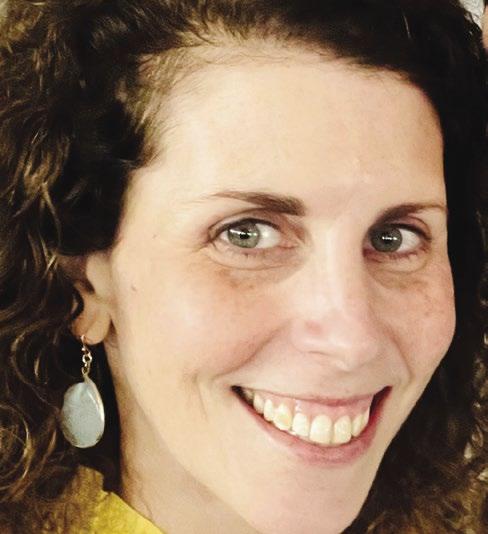
Ellie Jurado-Nieves has received the Social Equity and Community Empowerment award from the The Life Insurance Council of New York.
1998
Andrew Diaz-Matos was appointed Chief Commercial Officer & Chief Legal Officer with Catalina Holdings (Bermuda) Ltd.
Erica Halstead has joined the law offices of Womble Bond Dickinson. Her practice is focused on U.S. trademark prosecution, policing, enforcement, clearance, and counseling.
Darci Weede was appointed to the Yuma County Superior Court by Governor Doug Ducey.
2000
Gerald Coviello, has formed a new law firm, Coviello Weber & Dahill LLP, with his brother Jeff Coviello, and their longtime colleagues William “Bill” Dahill and Paul Weber.
2001
Stephan Rapaglia was inducted into the latest class of the British Baseball Hall of Fame.
He served as the Great Britain National Team’s head coach for seven years, beginning in 2004, and led the squad to one of its greatest performances in European Baseball historya silver medal at the 2007 European Championships in Spain. Following law school graduation, Stephan worked as an associate in the real estate departments of Coudert Brothers, Baker & McKenzie and DelBello Donnellan before joining Urstadt Biddle Properties (UBP), a public real estate investment trust, as an in-house attorney. Stephan has been at UBP since 2008, where he now serves as COO and Real Estate Counsel.
2002
Sebastian D’Acunto joined Connecticut law firm Pullman & Comley as a member of the trusts and estates practice.
Randi (Heitzman) Imbriaco has joined Greenberg Traurig as Of Counsel after spending time working in government and operations.
Stephen Haas, Director of Education and Chief Academic Officer, National Paralegal College, has been appointed to the DEAC (Distance Education Accrediting Commission) Board of Directors.
George C.D. Duke joined Connell Foley LLP as a Partner in the firm’s New York office.
2003
Julian Gomez has been reelected to the ParentChild+ Board of Directors
2004
Audrey Friedrichsen started a new position as Senior Climate and Renewable Energy Attorney at Scenic Hudson, Inc.
Sarah Courtman started a new position as Executive Specialist for Crum & Forster.
Kirstin M. Etela joined Day Pitney as a partner in its Environmental practice.
Tara R. Di Luca started a new position as an NFL Agent with the NFL Players Association.
2005
Domenica D. Hart started a new position as Coverage Attorney, Complex Casualty Claims for AIG.
Janice Dean had her article, Remembering the Forgotten Community: Community-Based Supplemental Environmental Projects and Environmental Justice, reprinted in the environmental justice issue of The New York Environmental Lawyer.
Robert Ernst has joined Dilworth Paxson LLP as of counsel in the public finance and corporate
and business practice groups in the firm’s Philadelphia headquarters.
Phillip Musegaas is the new Executive Director of San Diego Coastkeeper.
Sumantha Rani Sedor joined Foley Hoag LLP as a Partner in the Business Department.
Erin Rowin joined Activision Blizzard as their new VP, Employee Relations.
Elizabeth Dank joined TikTok’s Trust and Safety team where she will assist in enhancing user safety and strengthening policies for gender-based violence, sexual exploitation, nudity and related areas.
SUMMER 2023 65 ALUMNI
LET’S CONNECT! Update us with your latest professional and personal news! law.pace.edu/alumniupdates Prefer to submit your updates by email? Contact plsalumni@law.pace.edu Continued on next page.
ALUMNI
Emily N. Masalski has been elected to the Board of Governors of the Illinois State Bar Association (ISBA). She is Regulatory & Sustainability Counsel at Eaton Corporation, a global power management company. She was previously CEO & Founding Partner of Hunter Masalski LLC. Ms. Masalski was also recently appointed Chair of the ISBA Civil Practice and Procedure Section Council by incoming ISBA President Rory Weiler. She serves as an elected at-large ISBA delegate to the American Bar Association’s House of Delegates and a member of the Chicago Bar Association’s Judicial Evaluation Committee.
2006
Nicholas M. Menasché is now a partner with DellBello Donnellan Weingarten Wise & Wiederkehr, LLP.
Veronique Urban started a new position as Senior Associate at McGrail & Bensinger LLP.
2007
Joshua Verleun started a new position as Director of Permitting, Empire Wind at Equinor.
Christopher M. Tumulty joined Fox Rothschild LLP in New York as a Partner in the Litigation Department.
Deborah Brancato was a recipient of the Fairfield County Business Journal’s “40 Under Forty” award, recognizing dynamic industry leaders who have contributed to the Fairfield County business community.
2008
Ryan Naples started a position as the Director of Public Policy at DailyPay, Inc.
Persephanie Quimby started a new position as Account Executive at NIMBL, Techedge Group.
In March 2023, Shamik Trivedi left the IRS Office of Chief Counsel, where he was Special Counsel to the Large Business and International Division, to join the Treasury Department’s Office of Tax Policy as an AttorneyAdvisor. At Treasury, he will be working on tax procedure and administration matters.
2009
Jade Cameron joined Everlaw as a Customer Success Manager II.
William Diaz was promoted to Senior Managing Attorney at Fragomen.
Mike Caruso is Special Counsel at Cuddy & Feder, LLP.
Najia Khalid recently celebrated a decade at Wiggin and Dana and the 10-year anniversary of her developing her business immigration and compliance practice
2010
Joseph Marutollo received the Federal Bar Association’s Younger Federal Lawyer Award in September 2022. The award recognizes younger federal lawyers who attain high standards of professional achievement and accords public recognition for outstanding performance.
Joseph is Chief of the Civil Division of the U.S. Attorney’s Office for the Eastern District of New York.
Braem Velo started a new position as a director at Bank of America.
2011
Professor James Van Nostrand LLM ’11 had his book, THE COAL TRAP: How West Virginia Was Left Behind in the Clean Energy Revolution, released by Cambridge University Press.
Susan Mulliken started a new position as Assistant General Counsel at Teachers College, Columbia University.
Ben Wilkinson was made partner at Barclay Damon. Ben is a member of the Labor & Employment and Commercial Litigation Practice Areas at the firm. Ben was also recently appointed as the chair of the Associate Integration Committee at Barclay Damon.
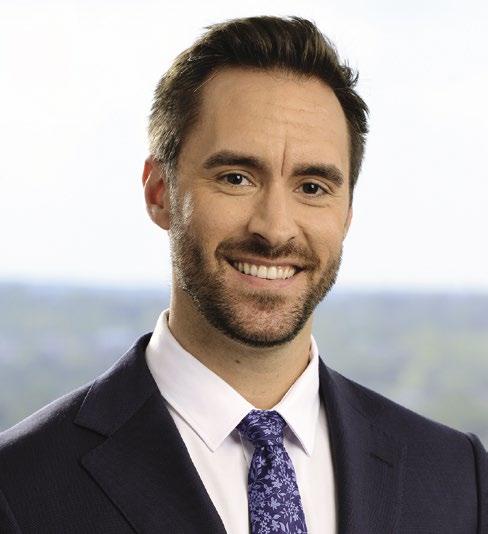
Christopher Messina completed the full Ironman Lake Placid triathlon race in July 2022 and in September 2022 joined Loverboy, Inc. as General Counsel. Founded by current cast members of Bravo’s hit TV show Summer House, Loverboy is an alcoholic beverage startup crafting hard sparkling teas and wine-based ready-to-drink cocktails.
Maxwell Fine started a new position as an Entrepreneur In Residence at Columbia Technology Ventures, supporting the Smartfin team in improving scientists’ ability to collect data in our oceans to improve climate change research.
Vadim Cherkasov was named to the Legal Intelligencer’s 2022 “Lawyers on the Fast Track.” He is an intellectual property partner with McCarter & English.
Vadim Cherkasov was selected as one of the Legal Intelligencer “Lawyers on the Fast Track” this year.
Sara Vinson is Vice President, Industry Segment Leader, Real Estate & Hospitality Practice at Chubb.
Sulay Grant was appointed as a NYC Housing Court Judge.
James M. Van Nostrand LLM ’11 was appointed as Chair of the Massachusetts Department of Public Utilities.
Laura E. Jensen JD ’11, LLM ’12 joined the environmental practice at Preti Flaherty in Portland, Maine.
2012
Seth G. Kagan started a new position as the AVP of Environmental Claims at Aspen Insurance Group.
66 HAUB LAW ALUMNI MAGAZINE
Continued from previous page.
Cassidy Crough was featured in the NY Post Article, NY Family Leave doesn’t help women after stillbirth: grieving mom, after experiencing the devastating loss of her daughter at 36 weeks.
Samantha Lyons has become a member of the law firm of Enea, Scanlan & Sirignano, LLP. Samantha joined the firm as an associate attorney in 2013.
Ashley (Devito) Grater started a new position as partner at Gerber Ciano Kelly Brady LLP. Caesar Lopez was named Chairman of the Greater Orlando Sports Commission.
2013
Justin Guido was featured in a Q&A article on Law.com on how he made partner at RumbergerKirk.
Brian Kennedy was promoted to partner at Forchelli Deegan Terrana LLP.
Hillary Nappi was made partner at Hach Rose Schirripa & Cheverie LLP.
Kara N. Neal started a new job as an attorney at The Fuentes Firm.
2014
Glen P. Ahlers was promoted to named partner and the firm name was changed from Rimland Law, P.C. to Rimland & Ahlers, P.C.
Denise A. Perez started a new position as Attorney at RI Immigration and Family Law Group.
Alison Morris was profiled in the WWBA’s April newsletter.
Sarah Kettenmann joined Shipman & Goodwin as an Associate in the Environmental Law Practice Group.
Maria Antonia Tigre (LLM ’14, SJD ’19) participated in the International Section of the NYSBA’s 2022 NYC Summer Conference.
2015
Kristen Motel was promoted to partner at Cuddy and Fedder LLP.
Cassia R. Schaeffer was promoted to partner at Cassin & Cassin LLP
Kristen Motel was recently appointed to serve as Chair of the Cannabis Law group at Cuddy & Feder LLP.
Leigh Ellis has accepted an offer to join the tenure-track faculty at Creighton University School of Law. She will be teaching courses in Criminal Procedure and Evidence, among others. Fationa Mamo was recently promoted to senior counsel at Wood, Smith, Henning and Berman.
Rafael Corbalan started a new job as an Associate Attorney for Chiesa Shahinian & Giantomasi PC working in their environmental department.
2016
Paola Bettelli co-authored (with UN ESCAP, UNEP, FAO and WHO) a Policy Guide to Operationalize
the Environment-Health Nexus in the Asia-Pacific region. The policy guide aims to support policymakers and stakeholders in the Asia-Pacific region to address environment-health risks and safeguard human health and well-being while protecting ecosystems.
Gillian Ingraham has joined the law offices of Baillie & Hershman P.C. The firm opened a new Greenwich, Connecticut office, which Gillian will manage. Jacqueline Murphy was elected to partnership with the firm Wood, Smith, Henning & Berman.
On March 27, 2023, eleven Haub Law alumni were sworn in before the Supreme Court of the United States. Congratulations to all and a huge thank you to alumnus Joe Mazel for sponsoring and creating such a special opportunity!
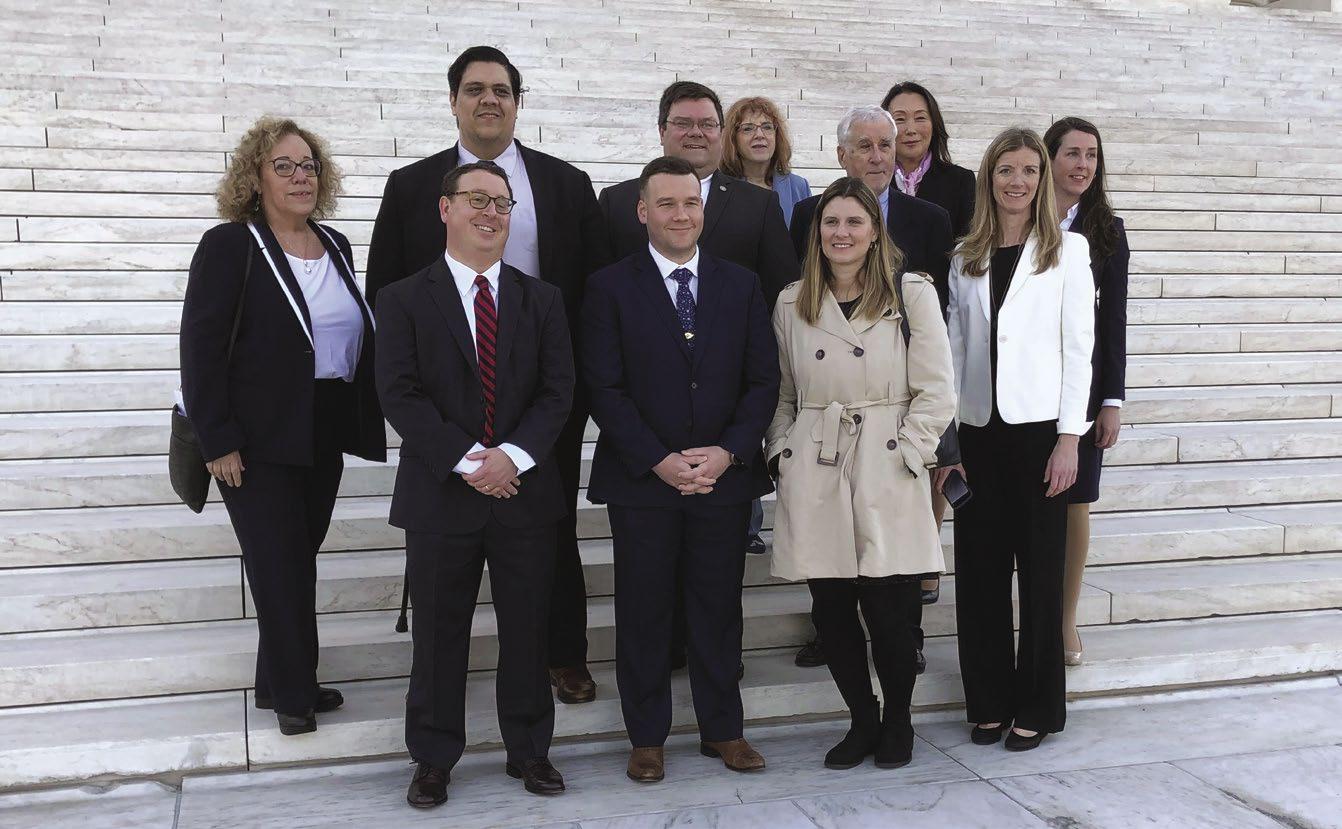
SUMMER 2023 67 ALUMNI
HAUB LAW ALUMNI IN DC
Continued on next page.
ALUMNI
Nicole Wiitala was named a partner with the law firm Sanford Heisler Sharp.
Michael Anthony Sargo started his own firm, The Law Office of Michael Anthony Sargo PLLC.
Lauren C. Enea, an associate at Enea, Scanlan & Sirignano, LLP, was honored at 914INC.’s 12th Annual Wunderkinds Reception. The awards celebrate business professionals under the age of 35 who are generating change across a spectrum of industries in Westchester County.
Adam Blaier was recognized by Best Lawyers: Ones to Watch in America 2023 for his work in corporate law and technology law.
Steven Lapkoff has been promoted to Chief Compliance Officer and Counsel at Hound Partners, LLC.
2017
Melissa Ryan Reitberg has joined the law firm Meirowitz & Wasserberg, LLP.
Joseph Moravec JD ’17, LLM ’17 started as senior attorney for Eileen Blessinger Legal PLLC.
Thomas DeGrace ’17, Jérôme Orlhac LLM ’17 and Alyse Velger ’17 were made partner at Milber Makris Plousadis & Seiden, LLP.
Jonathan Campozano, on behalf of Neighbors Link, co-presented his first CLE entitled Asylum 101 and the state of Immigration for Asylum Seekers. The CLE was one of several offered at the 9th JD Access to Justice Immigrant Rights and Services SubCommittee’s Second Annual Professional Conference hosted
by the Wsestchester County Bar Association.
Jullee Kim LLM ’17 has been elevated to a member of the firm Cole Schotz P.C. Jullee is a member in the Environmental practice group based in the firm’s New York City office.
2018
Mackenzie Ferguson, Putnam County Assistant District Attorney, was the keynote speaker at the Putnam County Youth Bureau awards dinner.
Jared Shababb was featured on The Encore Podcast to discuss ways to get paid with music, the reality of music contracts, when to hire lawyers & many more topics surrounding artists’ success within their careers.
Josh Berliner wrote for the June 2022 issue of the New Jersey Lawyer Magazine on New Jersey’s recently-adopted Commercial Property Assessed Clean Energy (C-PACE) law.
wrongfully imprisoned for 23 years.
Erika Kissh started a new position as Associate Attorney at Withersworldwide.
Ashley Arcuri has joined the firm of Enea, Scanlan & Sirignano, LLP as an associate attorney. Her practice areas include elder law; Medicaid planning and applications; wills, trusts & estates; and special needs planning.
2020
Paola Toro has joined the law firm of Bressler, Amery & Ross.
Brieanne Scully joined Major League Soccer as Counsel.
David Otonye King LLM ’17 is a director at Avinice Logistics Services Ltd.
Jonathan W. Campozano started a new position as Adjunct Professor at SUNY Westchester Community College.
James Patrick Logan is a Senior Attorney in the General Enforcement Bureau of the NYS Department of Environmental Conservation’s Office of General Counsel.
Marissa (Weiss) Logan is a Senior Attorney in the Air Section of the Bureau of Climate, Air, and Energy with the NYS Department of Environmental Conservation’s Office of General Counsel.

Dr. Huishihan Wang LLM ’18, SJD ’21 has been a postdoctoral fellowship researcher at the China Institute of Applied Jurisprudence at the Supreme People’s Court Of the People’s Republic of China since July 2022. In addition, Dr. Wang has published the article “China’s Public Interest Environmental Litigation and the U.S. Citizen Suit Model” in the Chinese Journal of Environmental Law.
2019
Jeffrey Deskovic had several articles published in a special Looking Back section on the Davis Vanguard. He also had an op-ed published in the NY Daily News concerning the need for teenagers to have lawyers present when questioned. Jeffrey received news coverage in connection with his first wrongful conviction that he helped overturn as a lawyer. The client, Andre Brown, was
Alicia Legland and William F. Kellermeyer presented on a panel regarding the Implementation of the CLCPA – Climate Leadership and Community Protection Act, at the New York State Bar Association Environmental & Energy Law Section’s 2022 Fall Meeting
Yuriy Korol JD ’20, LLM ’21 has joined Helsell Fetterman — a Seattle-based law firm serving businesses, organizations, and individuals. Yuriy is part of the firm’s Real Estate and Land Use Group.
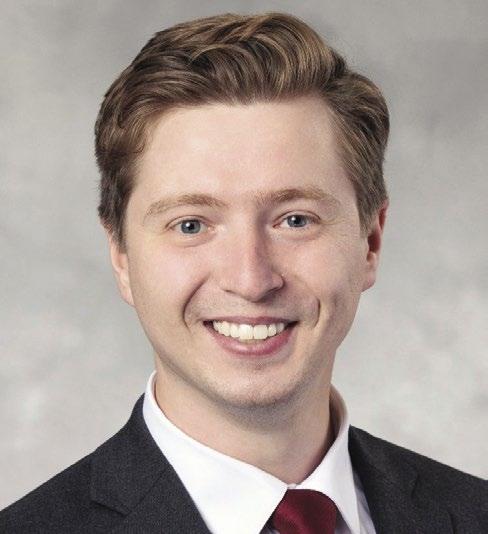
68 HAUB LAW ALUMNI MAGAZINE
Continued from previous page.
2021
Megan Clancy was sworn in as Assistant Prosecutor with the Camden County NJ Prosecutor’s Office.
Katelyn Rauh joined Fox Rothschild LLP in New York, NY as an Associate in the Litigation Department.
Robert Arbuco joined the law firm of Enea, Scanlan & Sirignano, LLP as an associate attorney. Robert’s practice areas include Medicaid Planning, Medicaid Eligibility and Applications and Estate Planning.
Samantha Irace started a new position as Associate Counsel at The Silverman Group.
2022
Taryn Ramey joined the law firm of McCullough, Goldberger & Staudt, LLP.
Taylor Keselica was hired as an associate by FLB Law, a fullservice law firm. She will support the firm’s Litigation & Dispute Resolution Practice.
Fred Mauhs LLM ’21 represented the Warnerville United Methodist Church when they ended up in controversy for opening a warming shelter for vulnerable people. Fred’s representation aided the congregation towards a favorable ruling from the local Zoning Board of Appeals
Pearl Yea eun Lee was highlighted for her generous donation to Drew University to help future first-generation students pursue research and career opportunities in the legal or medical field.
Claire Sutherlin McLeod JD ’21, LLM ’22 is now an Associate Attorney for Beveridge & Diamond PC.
Melanie Scholosser was featured in an article regarding the upcycling project she started, PuckerPress
Eliana Holloway is now an Assistant District Attorney in Kings County District Attorney’s Office.
Diona Piazza is an incoming associate at Welby, Brady & Greenblatt, LLP.
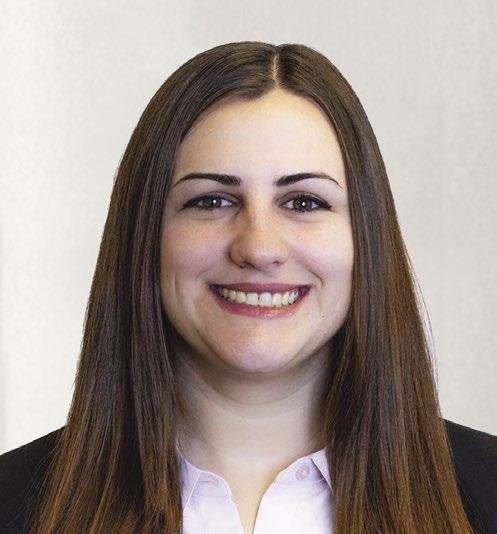
Yasmin Laskar recieved an offer from NYC Administration for Children’s Services, to begin after her current clerkship ends in the summer of 2023. Yasmin also married her now husband Adham M. Elsayed, Esq. n
ALUMNI ASSOCIATION BOARD OF DIRECTORS OFFICERS
Andrew Teodorescu ’13
ALUMNI ASSOCIATION PRESIDENT
Lisa E. Gladwell ’10
ALUMNI ASSOCIATION VICE PRESIDENT
Gail M. Mulligan ’09
ALUMNI ASSOCIATION TREASURER
Leanne Shofi ’94
ALUMNI ASSOCIATION SECRETARY
MEMBERS
Patricia Bisesto ’92
Michael A. Calandra Jr. ’05
Aharon Diaz Jr. ’12
Jeremy Wm. Farrington ’11
Stephen Forte ’08
Michael A. Frankel ’03
James A. Garvey III ’80 Director Emeritus
Rebecca Gigliotti ’18
Michael G. Gilberg ’07
Michael T. Goldstein ’06
Jennifer L. Gray ’06
George B. Haddad ’15
Jasmine Hosein ’12
Adele Lerman Janow ’90
Sameera Ansari Kalra ’09
Ashley Kersting ’16
Michael Kremen ’08
James M. Lenihan ’91
Hon. Carole Levy ’83 Director Emerita
Benjamin Lowenthal ’13, ’14
Andrea Madrid ’12
Joseph M. Martin ’91 Director Emeritus
Lt. Col. Joseph W. Mazel ’97
Mark Meeker, Dec. ’09
John Mulligan ’88
Susan Mulliken ’11
Diana E. Neeves ’16
Jacqueline A. Parker ’95
Patrick Paul ’16
Raymond Perez ’00
Thomas Persico ’18
Christopher Psihoules ’12
Cassia R. Schaeffer ’15
Judson K. Siebert ’85
Nicole Varisco ’10
SUMMER 2023 69 ALUMNI
ALUMNI
Dear Fellow Alumni,
The Board has transitioned to holding its meetings in a hybrid format when possible. The continued use of the Zoom platform for Board meetings has had a positive effect on attendance at these meetings and we anticipate its continued usage for this reason. Additionally, we continue to post our meeting minutes on the Law School’s website for all alumni to access in a continued effort for increased accessibility and transparency and we encourage members of the alumni community to attend a Board meeting.
During this term, we spent time working on the bylaws and updated them which are now reflected on the Alumni Association’s webpage. We also streamlined our board activity fund donation page. The Board’s activity fund has allowed the Board to support its top priorities, which includes supporting Haub Law students in ways that have a direct and positive impact.
In March 2023, the Alumni Association organized a trip to Washington, DC where eleven Haub Law alumni were sworn in before the Supreme Court of the United States. This was a memorable and meaningful trip for many. We are thankful for the efforts of Board Member Joe Mazel ’97 for sponsoring and creating such a special opportunity.
On a sad note, one of our long-term and most dedicated Board Members, The Honorable Sandra A. Forster ’79, passed away on May 1, 2023. In addition to being a Board Member and Alumna of Haub Law, Judge Forster was a lawyer, judge, wife, mother, and grandmother. The Board will miss her lively presence and commitment to the betterment of the Law School.
As this was my final year as Board President, we settled on succession planning for the new Board President, who will be Jacqueline A. Parker ’95. Additionally, we welcomed three new Directors onto the Board: Ashley Kersting ’16, Cassia Schaeffer ’15, and Nicole Varisco ’10. We also honored longtime Board Member, James A. Garvey III ’80, with the title of Director Emeritus. It has been my honor and pleasure to serve as Board President and I look forward to continuing my involvement with the Board and the Law School.
Sincerely,
ANDREW TEODORESCU, ESQ. ’13 President, Alumni Association’s Board of Directors
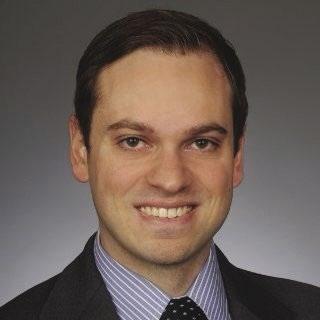
70 HAUB LAW ALUMNI MAGAZINE
I write to you as I am completing my final year as President of the Alumni Association’s Board of Directors.
Andrew Teodorescu, Esq. ’13
IN MEMORIAM
BENJAMIN B. FERENCZ
1920 - 2023
Benjamin B. Ferencz was a life-long, legendary advocate for human rights and the rule of law, who served as an Adjunct Professor of Law at the Elisabeth Haub School of Law at Pace University from 1985 to 1996. As a member of our faculty for more than a decade, our students benefited from his great intelligence, his world experiences, and his heroic spirit. During his time at the Law School, he taught classes in international law, humanitarian law, with a focus on world peace, among nations and peoples. He also published several books focused on peace themes, and later returned as the 1997 Blaine Sloan Lecturer on International Law. He was an inspiration to a generation of our students, many of whom entered the field of international humanitarian law – a field that he helped to establish. Two of his children, Donald Ferencz ’83 and Nina Dale ’87, graduated from the Law School, following in his footsteps. He and his son Don were also supporters of the Pace International Criminal Court Moot from its inception.
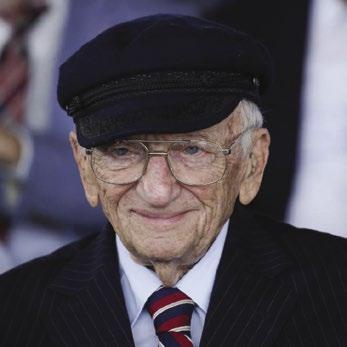
JUDGE FRED L. SHAPIRO
1949 – 2022
Judge Fred L. Shapiro served as an Adjunct Professor of Law at the Elisabeth Haub School of Law at Pace University. He taught several courses at Haub Law from June 1987 through June 2002. He was well-liked and well-respected by both his students and the full-time faculty. After he retired from the Bench, Judge Shapiro subsequently was of counsel to a private firm that specialized in divorce litigation, and he was a highly successful mediator for a period of years.
JOHN MERINGOLO

1973 - 2022
John Meringolo first joined the Elisabeth Haub School of Law at Pace University in 2012 as a coach in our Trial Advocacy Program—sharing his time, wisdom, and mentorship to so many of our students over the years. Working closely with Professor Lou Fasulo, he co-created the Federal Criminal Pre-Trial Simulation course, which he taught for the past 9 years. John led a distinguished career in law, of which our students were privileged to benefit from. He was the founder of the successful law firm Meringolo & Associates, P.C., and over the course of his career, represented hundreds of clients in corporate, trusts and estate litigation, and criminal matters nationwide.
THE HONORABLE SANDRA A. FORSTER
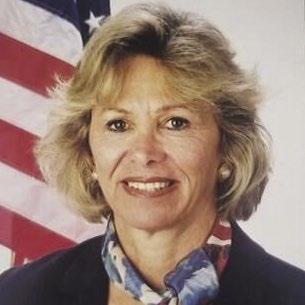
1940 – 2023
Judge Forster was a dedicated alumna and friend of the Elisabeth Haub School of Law at Pace University. A graduate of the class of 1979, she remained very committed to the Law School and was a lively presence on the Alumni Association Board of Directors, for which she volunteered her time. She was in private practice for many years before being elected as Greenburg Town Justice, where she served from 2000-2012. Judge Forster is remembered as a lawyer, judge, wife, mother, and grandmother, who will be very missed.
MARK R. VON STERNBERG
1945 - 2023
Mark von Sternberg was a Senior Attorney with Catholic Charities Community Services/Archdiocese of New York. A beloved teacher and mentor to students, Mark served for decades as Pace’s primary professor in the area of both general immigration law and comparative asylum and refugee law, while also serving on the faculty of St. John’s University School of Law and New York Law School. He also assisted in the founding of Pace’s Immigration Justice Clinic.


SUMMER 2023 71
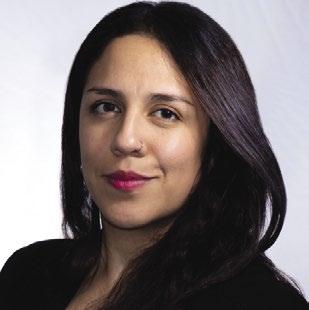
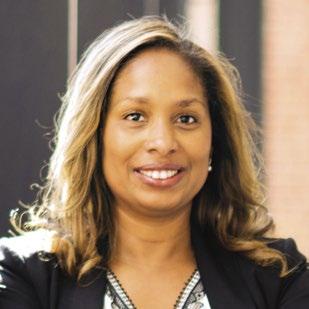
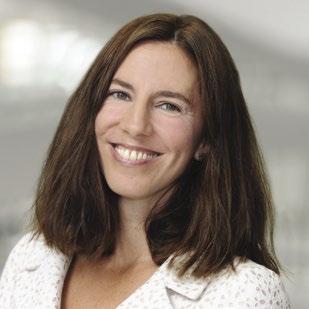
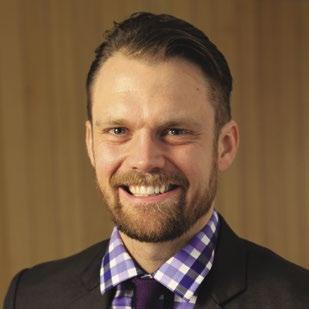
72 HAUB LAW ALUMNI MAGAZINE WELCOME TO OUR NEWEST FACULTY MEMBERS Connect with @HaubLawatPace LAW.PACE.EDU/CONNECT Camila Bustos Assistant Professor of Law Salihah Denman Visiting Assistant Professor of Law Jessica Miles Associate Professor of Law Paul Rink Visiting Assistant Professor of Environmental Law Learn more at law.pace.edu/news










 HORACE E. ANDERSON, JR. Dean, Elisabeth Haub School of Law at Pace University
HORACE E. ANDERSON, JR. Dean, Elisabeth Haub School of Law at Pace University























































































































































